
How to Write a Nursing Essay with a Quick Guide

Ever felt the blank-page panic when assigned a nursing essay? Wondering where to start or if your words will measure up to the weight of your experiences? Fear not, because today, we're here to guide you through this process.
Imagine you're at your favorite coffee spot, armed with a cup of motivation (and maybe a sneaky treat). Got it? Great! Now, let's spill the secrets on how to spin your nursing tales into words that not only get you that A+ but also tug at the heartstrings of anyone reading. We've got your back with nursing essay examples that'll be your inspiration, an outline to keep you on the right path, and more!
What Is a Nursing Essay
Let's start by dissecting the concept. A nursing essay serves as a focused exploration of a specific aspect of nursing, providing an opportunity for students to demonstrate their theoretical knowledge and its practical application in patient care settings.
Picture it as a journey through the challenges and victories of a budding nurse. These essays go beyond the classroom, tackling everything from tricky ethical dilemmas to the impact of healthcare policies on the front lines. It's not just about grades; it's about proving, 'I'm ready for the real deal.'
So, when you read or write a nursing essay, it's not just words on paper. It's like looking into the world of someone who's about to start their nursing career – someone who's really thought about the ins and outs of being a nurse. And before you kick off your nursing career, don't shy away from asking - write my essay for me - we're ready to land a professional helping hand.
How to Start a Nursing Essay
When you start writing a nursing essay, it is like gearing up for a crucial mission. Here's your quick guide from our nursing essay writing service :

Choosing Your Topic: Select a topic that sparks your interest and relates to real-world nursing challenges. Consider areas like patient care, ethical dilemmas, or the impact of technology on healthcare.
Outline Your Route : Plan your essay's journey. Create a roadmap with key points you want to cover. This keeps you on track and your essay on point.
Craft a Strong Thesis: Assuming you already know how to write a hook , kick off your writing with a surprising fact, a thought-provoking quote, or a brief anecdote. Then, state your main argument or perspective in one sentence. This thesis will serve as the compass for your essay, guiding both you and your reader through the rest of your writing.
How to Structure a Nursing Essay
Every great essay is like a well-orchestrated performance – it needs a script, a narrative that flows seamlessly, capturing the audience's attention from start to finish. In our case, this script takes the form of a well-organized structure. Let's delve into the elements that teach you how to write a nursing essay, from a mere collection of words to a compelling journey of insights.

Nursing Essay Introduction
Begin your nursing essay with a spark. Knowing how to write essay introduction effectively means sharing a real-life scenario or a striking fact related to your topic. For instance, if exploring patient care, narrate a personal experience that made a lasting impression. Then, crisply state your thesis – a clear roadmap indicating the direction your essay will take. Think of it as a teaser that leaves the reader eager to explore the insights you're about to unfold.
In the main body, dive into the heart of your essay. Each paragraph should explore a specific aspect of your topic. Back your thoughts with examples – maybe a scenario from your clinical experience, a relevant case study, or findings from credible sources. Imagine it as a puzzle coming together; each paragraph adds a piece, forming a complete picture. Keep it focused and let each idea flow naturally into the next.
Nursing Essay Conclusion
As writing a nursing essay nears the end, resist the urge to introduce new elements. Summarize your main points concisely. Remind the reader of the real-world significance of your thesis – why it matters in the broader context of nursing. Conclude with a thought-provoking statement or a call to reflection, leaving your reader with a lasting impression. It's like the final scene of a movie that leaves you thinking long after the credits roll.
Nursing Essay Outline
Before diving into the essay, craft a roadmap – your outline. This isn't a rigid skeleton but a flexible guide that ensures your ideas flow logically. Consider the following template from our research paper writing service :
Introduction
- Opening Hook: Share a brief, impactful patient care scenario.
- Relevance Statement: Explain why the chosen topic is crucial in nursing.
- Thesis: Clearly state the main argument or perspective.
Patient-Centered Care:
- Definition: Clarify what patient-centered care means in nursing.
- Personal Experience: Share a relevant encounter from clinical practice.
- Evidence: Integrate findings from reputable nursing literature.
Ethical Dilemmas in Nursing Practice
- Scenario Presentation: Describe a specific ethical challenge faced by nurses.
- Decision-Making Process: Outline steps taken to address the dilemma.
- Ethical Frameworks: Discuss any ethical theories guiding the decision.
Impact of Technology on Nursing
- Current Trends: Highlight technological advancements in nursing.
- Case Study: Share an example of technology enhancing patient care.
- Challenges and Benefits: Discuss the pros and cons of technology in nursing.
- Summary of Key Points: Recap the main ideas from each section.
- Real-world Implications: Emphasize the practical significance in nursing practice.
- Closing Thought: End with a reflective statement or call to action.
A+ in Nursing Essays Await You!
Ready to excel? Let us guide you. Click now for professional nursing essay writing assistance.
Nursing Essay Examples
Here are the nursing Essay Examples for you to read.
Writing a Nursing Essay: Essential Tips
When it comes to crafting a stellar nursing essay, a few key strategies can elevate your work from ordinary to exceptional. Here are some valuable tips from our medical school personal statement writer :

Connect with Personal Experiences:
- Approach: Weave personal encounters seamlessly into your narrative.
- Reasoning: This not only adds authenticity to your essay but also serves as a powerful testament to your firsthand understanding of the challenges and triumphs in the nursing field.
Emphasize Critical Thinking:
- Approach: Go beyond describing situations; delve into their analysis.
- Reasoning: Nursing essays are the perfect platform to showcase your critical thinking skills – an essential attribute in making informed decisions in real-world healthcare scenarios.
Incorporate Patient Perspectives:
- Approach: Integrate patient stories or feedback into your discussion.
- Reasoning: By bringing in the human element, you demonstrate empathy and an understanding of the patient's experience, a core aspect of nursing care.
Integrate Evidence-Based Practice:
- Approach: Support your arguments with the latest evidence-based literature.
- Reasoning: Highlighting your commitment to staying informed and applying current research underscores your dedication to evidence-based practice – a cornerstone in modern nursing.
Address Ethical Considerations:
- Approach: Explicitly discuss the ethical dimensions of your topic.
- Reasoning: Nursing essays provide a platform to delve into the ethical complexities inherent in healthcare, showcasing your ability to navigate and analyze these challenges.
Balance Theory and Practice:
- Approach: Connect theoretical concepts to real-world applications.
- Reasoning: By bridging the gap between theory and practice, you illustrate your capacity to apply academic knowledge effectively in the dynamic realm of nursing.
Highlight Interdisciplinary Collaboration:
- Approach: Discuss collaborative efforts with other healthcare professionals.
- Reasoning: Acknowledging the interdisciplinary nature of healthcare underscores your understanding of the importance of teamwork – a vital aspect of successful nursing practice.
Reflect on Lessons Learned:
- Approach: Conclude with a thoughtful reflection on personal growth or lessons from your exploration.
- Reasoning: This not only provides a satisfying conclusion but also demonstrates your self-awareness and commitment to continuous improvement as a nursing professional.
As we wrap up, think of your essay as a story about your journey into nursing. It's not just about getting a grade; it's a way to share what you've been through and why you want to be a nurse.
Imagine the person reading it – maybe a teacher, a future coworker, or someone starting their nursing journey. They're trying to understand your passion and why you care about nursing.
So, when you write, remember it's more than just an assignment. It's your chance to show why nursing matters to you. And if you ever need help – there's always support from our essay writer online .
Ready to Excel in Your Nursing School Essay?
Order now and experience the expertise of our professional writers!
How to Write a Nursing Essay?
How can a nursing essay effectively address ethical considerations, what are some examples of evidence-based practices in nursing essays, related articles.
.webp)

How to Write an Admission Essay for Nursing School

The nursing school admission process is rigorous. One of the critical requirements for new applicants is an application essay, and writing a compelling nursing essay will give you a major head start over other nursing school candidates.
Once you have figured out why you want to be a nurse, all your memories, accomplishments, ambitions, and goals will align. Therefore, writing an essay on why you are interested in becoming a nurse and selecting a specific nursing college or university allows the admissions team to understand why they should choose you over other candidates.
A well-written, organized, and polished nursing school essay automatically increases your chances of acceptance. With thousands of applications destined for assessment and judgment by the admissions committee, you would want to make your application essay for the nursing school admission stand out.
We have admission essay-writing experts and consultants who, luckily, have compiled this intensive guide to help you write an intentional, focused, and perfect essay for nursing school.
Note: If you are in a hurry or you need direct assistance in writing your nursing college essay, please place an order and let our expert essay writers craft for you an original, engaging, and compelling nursing essay!
What Is a Nursing School Essay?
A nursing school essay is a written piece that demonstrates your interest in a nursing career and elaborates why you are the perfect fit for a specific nursing program.
Most nursing schools (colleges and universities) require aspiring students to write an application essay for nursing school admission. It is a personal essay submitted as part of the application process, which the admission officers review to determine if you can be accepted.
A good nursing school essay shows your interest in the nursing field, your chosen career path, why you want to pursue your nursing education through a specific nursing school program, and why you believe you should be accepted into the institution. It has to show why the entire process is crucial to you and why you are a worthy candidate to select for the nursing school program.
Sometimes, it is the only hope one has left, especially if the competition is stiff. Imagine a situation where the application materials such as grades, resumes, test scores, or recommendation letters are all qualified; a nursing school essay will be the only means to select the best out of the rest fairly.
Writing a perfect nursing essay will demonstrate that you are ready to go down the thorny path of training to become a nurse. Nursing education entails research and writing assignments, and a well-written essay demonstrates your readiness.
Helpful Information to Include in a Nursing Admission Essay
You are probably wondering what goes into an application essay for nursing school admission. Well, your nursing essay will answer an essay prompt from the university. Most colleges will specify the essay questions for college of nursing applicants for various levels of study (MSN, DNP, BSN, Ph.D., or ADN).
Below are some examples of what might be expected:
- Your goals and ambitions for a successful nursing career
- How do you plan to achieve your academic goals
- The specific reasons why you want to join the nursing field
- Reasons you are selecting the particular nursing school or program
- Personal accomplishments that set you apart as the right candidate
- Experiences and encounters that make you love nursing career
- Plans for the future once accepted
- Experience with medical training or patient care
- Character traits aligned to being a nurse
- How you are prepared to become a successful nurse
- Academic, personal, and career interests
- Any other reasons to convince the admissions committee to approve your admission
In some quarters, a nursing school application essay might be a statement of purpose, personal essay, or letter of intent. It is a chance to plead with the admissions committee to accept you into your dream nursing college or program. Having looked at what goes into it, it is also essential to cover the steps to writing a perfect and comprehensive admission essay for nursing school.
Structure of a Nursing School Essay
A nursing essay for admission into a nursing program or school follows the typical format of an academic essay. It is organized into three main sections: introduction, body, and conclusion.
Introduction
- This is the opening paragraph that has to impress your readers (admissions officers)
- It can make or break your admission essay or personal statement
- It should be direct to the point
- It is a roadmap that helps the readers to know what to expect as your story grows.
- Open it using an enticing quote, event, anecdote, or statement
- You are allowed to use personal pronouns such as I in the introduction and the rest of the essay
- It has 2- 3 and sometimes five paragraphs
- Elaborates the introduction
- Every paragraph has a unique opening sentence that is a mini-thesis statement.
- Bears the best ideas yielded in your brainstorming session
- It can be as long as your word limit allows but contributes to at least 70-80% of the word count
- Focuses on quality over quantity
- Has one idea or experience per paragraph
- You should mention the skills you intend to develop and how they will help you become a successful nurse
- Connect the skills and experiences to the program and your future career
- Summarize and emphasize the main ideas
- It should be captivating and insightful
- Conveys a sense of closure to the readers
- Invites the readers to reflect on the ideas in your essay
- Creates one last lasting impression on the readers
Outline for a Nursing School Essay
A good nursing school essay outline should give you directions that help you visualize what the essay will look like in its final draft.
If you are writing a nursing essay, having the outline is the first thing you do after brainstorming (as shown in the steps).
It helps you to figure out how to arrange the ideas and points in the essay for a better flow. You can develop each section independently, regardless of the sequence, and still have a quality essay.
In most cases, the outline is meant for personal consumption, especially when writing a personal statement. However, if you are writing a nursing essay on a given nursing topic , you might be required to write an outline, annotated bibliography , and the nursing essay , and each will be graded separately.
Given the structure, you can outline your nursing school essay as follows:
Introduction paragraph
- Hook (quote, statement, or anecdote)
- Background information
- Thesis statement
- Transition sentence
Body paragraph 1
- Topic sentence
- Evidence, data, and facts
- Transition to the second body paragraph
Body paragraph 2
- Transition to the third body paragraph
Body paragraph 3
- Transition to the conclusion
Conclusion
- Summary of the main ideas
- Restate the thesis statement
- Last impression (call to action to the admissions committee)
Steps for Writing a Nursing School Essay
Optimizing your application essay increases your chance of getting accepted into the nursing program or nursing school. The essay should elaborate on your person (who you are as an individual) by providing a comprehensive perspective of your career ambitions, goals, and plans related to your passion for nursing. You should elaborate to the admissions committee why you are a good fit for their nursing program. Students at the ADN, BSN, ABSN (Accelerated BSN), MSN, DNP, or Ph.D. might be required to write an admission or personal essay, and here are the five steps to make it successful.
- Read the prompt
- Brainstorm for ideas
- Plan your essay
- Write the first draft
- Edit and Polish your Essay
Let's explore all these steps before delving into the tips to help you write the essay better.
Read the Prompt
If you are considering applying to a specific nursing school, you need to begin by researching the application process to know when you will be expected to submit your application essay.
In most cases, the nursing schools have essay prompts and instructions for the potential nursing candidates published on their websites. The prompts might vary depending on the programs you are interested in pursuing and the institutional preferences. Therefore, it is vital to begin by locating the nursing school essay guidelines. A quick search online can help, or you will also find it enclosed in the email sent to you by the school's admissions committee.
Read the instructions thoroughly with a specific focus on the essay question, word limit, and topics you must cover. If you apply to many nursing schools, you should locate and read each prompt before moving to the next steps.
Reading and understanding the instructions is the first step in writing an excellent application essay. Besides, it helps you to customize the essay to the requirements and not the other way around.
Brainstorm for Ideas
Now that you know what is expected of you, you need to decide what to include in your nursing essay to make it stand out. For this, get into an idea-generation marathon where you brainstorm ideas based on the prompt and the requirements.
Give every idea a thoughtful consideration and make shorthand notes so that you have all the ideas condensed. Consider your ambitions, accomplishments, drive, passion, preferences, strengths, weaknesses, character traits, and other attributes that might relate to your urge to pursue nursing as a career.
Also, research the nursing program and relate it to your personal ambitions and desires. Such information will help you spot the specific things you like about it. You can then tailor your experiences and encounters to the requirements. Look at the program's website and examine 2-3 aspects that stand out. This will help you focus on what you have that makes you the best pick for the program. You can also reference experiences, events, or traits related to the program.
Consider the environment and people around you and relate them to your desire to become a nurse.
Experiences, encounters, and events can inspire ideas to pen into your nursing school essay.
You can also research some well-written examples of nursing personal statements and essays to get inspired when brainstorming ideas for yours. Besides, you can also ask people in your network, such as family, friends, or peers, for ideas that can stand out and then choose the best.
To get the most robust ideas, rate them depending on how best they answer the prompt; this is the fodder for the entire application essay. Choose 3-5 strongest points and make them the central focus of your essay.
Plan your Essay
As a nurse, planning is everything, even when it comes to clinical decision-making. And because you are destined for this noble career, planning your personal essay won't hurt. Instead, it helps you know what to put and where to engage the admission officers from the beginning to the end of your nursing school essay.
With the ideas in mind, create a rough outline and adjust it until you are fully satisfied that your thoughts, facts, and opinions are well-organized. The outline will help you to structure your essay, avoid derailing it, and write a draft that bears all the quality ideas.
A good step is to organize the essay into paragraphs that align with the word count (often given as the minimum or maximum number of words, exact number of words, or characters).
Include an introduction to give your readers a clear understanding of the focus of your essay. Yes, a good nursing essay has a thesis statement that shows your central claim or the main idea you are focusing on the entire essay.
You should include the body paragraphs, each with a topic sentence supporting the thesis and a series of supporting facts such as examples, evidence, and illustration.
Finally, include a conclusion as the last paragraph that reverberates the thesis, summarizes the essay, and has a call to action to the admissions committee.
Write the First Draft
After the outline, you must begin writing your essay sentence by sentence and paragraph after paragraph. Whatever approach you take, ensure that every detail covered in the outline ends up in your essay as long as it is valid.
Write the introduction paragraph by giving a hook or attention grabber. You can begin with a quote from a famous nurse or a scholarly nursing article. You can also state facts or give statistics if they matter to your application. You should also elaborate on your selected topic, especially if the prompt provides options. End your first paragraph with a thesis statement that describes the focus of your nursing school essay. The introduction should account for 10-15% of the word count.
Each body paragraph has a unique, unmistakable, and concise topic sentence followed by supporting details and a concluding sentence that transitions to the next paragraph. Ensure that you have at least two body paragraphs considering that you can write either a three-paragraph or a five-paragraph nursing essay. Collectively, the body section should be 70-80% of the essay's word count. The body paragraphs should outline your encounters, experiences, and events and how they relate to the specific nursing program.
The final part is the conclusion, where you summarize the main ideas in the essay. for this, avoid the clich� conclusion starters such as "in conclusion," "to sum up," or "in summary." Instead, use conclusion opening sentences that demonstrate to your reader that the essay has ended � it gives the best closure and helps close the information loop in your essay. Rephrase your thesis and summarize the main ideas before appealing to the admissions committee to accept you into their nursing program. It should be 10-15% of the word count, like the introduction paragraph.
Edit and Polish the Essay
Now that you are done with your first draft, it is only the beginning, and you are far from being done. You need to take a break to cool down your frustrations, anxiety, and adrenaline developed when writing. It is a chance to establish an objective mind to look at things from a broader perspective when you settle for editing and proofreading.
If you are not good with editing and proofreading, you can hire a professional proofreading and editing expert to look at your essay and suggest changes to make. You can also use friends and family as a second and third eye to see what you cannot see. Using their feedback will help you optimize the essay for better results. You can incorporate the suggestions and proceed to editing and proofreading.
As for editing and proofreading, you can take advantage of tools such as Grammarly, Ginger, Hemingway Editor, and other editing and proofreading tools available by students and professionals. Revise the essay until it meets the requirements and addresses the prompt. If anything, do not be afraid to do away with an entire paragraph or a few paragraphs that don't make sense.
It is better to start over again than submit a subpar nursing school essay that will be a laughingstock of the admissions committee. The only way to entertain the admissions officers is to write an outstanding nursing school essay that will automatically dial you into the nursing program of your choice. Best of luck!
Example of Nursing School Essay Prompts
- Discuss your interest and understanding of the clinical nurse leader role. What's your story? And what experiences have contributed to your interest?
- The DNP program aims to prepare nurse leaders at the highest level of nursing practice to improve patient outcomes and translate research into practice. Describe experiences that exhibit your formal leadership role or informal leadership skills.
- How will the program help you achieve your academic and career goals?
- What experiences have influenced your interest in pursuing a clinical specialty you have chosen?
- The DNP program aims to prepare nurse leaders at the highest level of nursing practice to improve patient outcomes and translate research into practice. Describe experiences that exhibit your leadership skills.
- Why have you chosen to pursue a nursing research doctorate?
- How does becoming a nurse fulfill your ambitions?
- What does becoming a nurse mean to you?
- What drives you to become a nurse?
- Why do you want to become a nurse?
- What is your nursing philosophy?
- What was your reason for choosing nursing as a career? Do you have any additional information that you would like the admissions committee to know about you that has not been previously considered in the application?
- What are your professional goals? How will this accelerated nursing program help you materialize those goals?
- Discuss a specific leadership position (e.g., manager, director, associate dean) you wish to attain within three to five years after completing the DNP program.
Note: Some of these prompts have been rephrased from the Rush University Website . They keep changing depending on the preferences of the admissions committee. Inquire with your university or college of nursing to get specific directions on the most current prompts and instructions.
Related Reading: Ideas for a nursing capstone project.
Tips for Writing an Effective Nursing School Admission Essay
When grades, test scores, and other material entries don't count , a nursing school essay, referred to as a personal statement, suffices. In this case, a great nursing school can only be your hope for getting into nursing school. If you want to get ahead of the competition, these proven tips will significantly help you.
1. Plan Well
To pen an excellent nursing school essay that gets you accepted, you need to plan the essay.
Read the instructions, brainstorm as you take notes, research widely, and create an outline.
And even when done, the purpose is to have a reverse outline to help you score the essay against the requirements. Planning helps you to know what attention-grabbing statement to begin the essay with, the sequence of the body paragraph ideas for a logical flow, and what specifics to include in the conclusion.
Having an outline will help you save time when writing the first draft and help you to stay focused when writing.
2. Show, Don't Tell!
All effective nursing school essays express your personality, experiences, and encounters while convincing the admissions officers that you are the best fit for the program.
You should not focus on telling your story alone. Instead, show how your account relates to the prompt.
Discuss experiences, encounters, and events but show how they have impacted your choice of the program and desire to become a nurse.
If you are applying to a specific program, enlighten your readers on why you are specifically interested in the program and what that means.
It could be the hybrid learning model that entails both online and classroom learning or the history or reputation the school has, parental preferences (if they were a graduate), mentor recommendation, etc.
3. Choose Information Wisely
Ensure that every idea or information in your essay is unique, authentic, and original. Don't just write fictitiously.
If you have no past experiences directly related to nursing, you can introduce them and twist them to fit the context.
Impress the admissions committee with your wits, not just a summary of what others have written online.
Standing out in your presentation of facts will always carry the day. Genuinely share your story about what made you want to become a nurse.
4. Avoid Excuses
Even if you don't have appealing past encounters with medicine, hospitals, or anything related to nursing, tell your story as it is.
Do not excuse yourself for telling the truth. After all, you are on your journey to becoming a nurse; all you are seeking is training to develop the knowledge and skills.
If you have cared for your family members at home, babysat your siblings, or have compassion for the suffering, these are the most authentic stories you have, and they can spell meaning on your ambition. Therefore, prove your strong candidature by stating things as they are without clutching at things that do not matter.
5. Let it Flow!
Instead of forcing things such as humor or stories, write plainly about your experiences, encounters, and past events that made you want to become a nurse.
Most "why I want to be a nurse" essays don't have to have any humor. If it clicks well and is good, if it doesn't, don't force it.
As well, avoid exaggerating things when writing your nursing school essay. You should focus on making it as interesting, engaging, and convincing as can be but be truthful.
Avoid mixing up stories. A good way is to focus each paragraph on the main point that relates to your thesis.
6. Show you care about People and Yourself
Nursing is a noble career that entails caring for oneself as you care for others. Your full-time attention and job will be to care for people to help them achieve better health outcomes.
You must show empathy, selflessness, and determination to be a nurse. You can bring examples of when you took care of others and yourself.
Let the committee know that even when training as a nurse, you understand self-care as much as you understand caring for others.
7. Bring in Current Issues
If there is a chance that you can introduce nursing concepts or ideas from current events, it will beef up your nursing school essays.
Get facts from well-established nursing organization websites such as the American Nurses Association, National League of Nursing, Emergency Nurses Association, Sigma Theta Tau, or National Black Nurses Association, etc.
Intrigue your readers by understanding the challenges and opportunities in the nursing field.
You can relate your application to nursing shortages, medical errors, nursing burnout, continuing education, evidence-based practice, etc.
8. Briefly Explain your Qualifications
Since you have already provided material such as transcripts, resumes, and test scores, it is imperative to briefly expound on the qualifications without going into details. Tell them about your experiences, your education, and how you have set yourself up for success in nursing school . For instance, elaborate on how volunteering and internships helped you develop a sense of becoming a nurse or how they developed skills you will apply in nursing school.
9. Share your plans
Everybody has plans. You have short, medium, and long-term goals as you prepare to enter nursing school. You should include them in your essay and demonstrate how the program or school will help you achieve them. Admission officers are always wowed by hearing about goals, especially if they relate to their schools or programs. As you do this, be very specific with the goals and how you intend to achieve them.
All set, but before You Go �
As you contemplate entering nursing school, you must understand that it will never be a walk in the park. There is so much to learn within the specified time frame, and you must show your preparedness. A nursing school personal essay is one of the ways to do so.
Related Article:
- Writing a nursing philosophy ( a student's guide)
- Writing a nursing student resume (a guide)
Lucky for you, our nursing admission essay writers have shared insights, tips, and steps that can help you write an exceptional application essay for any nursing school or program. If you follow them, you will write a seamless admission essay that increases your chances of getting into the nursing school of your dreams.
We wish you luck in your endeavors and promise that were available in case you need a well-written, organized, and plagiarism-free admission essay tailored to your experiences and the specific nursing school or program requirements.
Struggling with
Related Articles

Systematic Review vs. Literature Review - Nursing Research

List of 500 Plus Nursing Capstone Project Ideas to Consider as a nursing Student

Writing a Nursing Research Paper that Meets Professor's Requirements
NurseMyGrades is being relied upon by thousands of students worldwide to ace their nursing studies. We offer high quality sample papers that help students in their revision as well as helping them remain abreast of what is expected of them.

Writing a Nursing College Application Essay: The 6-Steps Ultimate Guide
Applying to nursing school is one of the most exciting yet competitive processes. You must create a compelling application essay to prove your interest and capabilities. This often includes your accomplishments, objectives, or memories. Writing a nursing college application essay is critical to increasing your enrollment chances.
In this article, we’ll provide 6 steps for crafting a standout essay that showcases your passion for nursing and sets you apart from other applicants.
Writing a nursing college application essay
If you’re applying to nursing school, your application essay is a crucial part of the process. This is your opportunity to showcase your passion for nursing and demonstrate why you’re the ideal candidate for the program.
Now, below, we will give you the top 6-step guide that we have used to create thousands of compelling nursing school application essays:
- Read and understand the prompt and requirements
- Start with an outstanding introduction
- Highlight your passion for nursing
- Share a personal experience that depicts your personality and skills
- Showcase your understanding of nursing school
- Edit and proofread your nursing college essay
Step-by-step guide: Writing a nursing college application essay
Applying for nursing school is often daunting and busy as you apply for different colleges. However, understanding the process of writing a nursing college application essay will come a long way.
Without much hesitation, we will take you through the 6 steps we use to write exceptional nursing school application essays.
Step 1: Understand the Prompt and Requirements.
Usually, the school will provide special instructions or prompt for your application essay. It is essential to carefully read and understand the prompt and any specific requirements or guidelines the school offers. Ensure you address all aspects of the prompt and follow any formatting or length requirements.
Failing to do so could result in your essay being overlooked or even rejected. Take the time to fully understand what the school is looking for in its applicants and tailor your essay accordingly.
Once you understand the prompt and requirements, brainstorm ideas for your essay. Think about your experiences in nursing or healthcare. Are there any challenges you have faced?
Step 2: Highlight Your Passion for Nursing
One of the most important things to convey in your nursing college application essay is your passion for the field. Admissions committees want to see that you have a genuine interest in nursing. It would be best to show that you are committed to pursuing a career in this field.
We encourage students to highlight any experiences or personal qualities that have led them to choose nursing as their career path. This could include
- Volunteer work
- Personal experiences with healthcare
- A desire to help others and more
Show the admissions committee that you are passionate about nursing and have the drive and dedication to succeed in this challenging and rewarding field.
Finally, emphasize your commitment to pursuing a career in nursing and your willingness to work hard to achieve your goals. All these factors will help you make a strong case for your nursing application essay.
Step 3: Showcase Your Relevant Experience and Skills
It’s also vital to showcase any relevant experience and skills that make you a strong candidate for the program. Be bold in showcasing your relevant experiences related to the nursing field. These could be:
- Previous healthcare experiences
- Leadership roles in school or community organizations
We also urge students to include their exceptional skills, such as:
- Strong communication skills
- Attention to detail
- Ability to work well under pressure
Showcasing your relevant experience and skills demonstrates to the admissions committee that you are well-prepared for the rigors of nursing school and have what it takes to succeed in this demanding field.
Step 4: Use Specific Examples and Stories to Illustrate Your Points.
Using specific examples when writing a nursing college application essay will help you stand out when illustrating a certain point.
For example, if you’re discussing your ability to work well under pressure, you could share a story about when you had to respond quickly to an emergency in a clinical setting.
Using examples makes your essay more engaging and memorable. In addition, it provides concrete evidence to support your claims about your skills and experience.
Just be sure to keep your examples relevant and focused on the key points you want to make in your essay.
Use specific examples to show the admissions committee you understand what it takes to be a successful nurse. Take the time to think about your experiences and choose the most compelling stories to illustrate your points.
Step 5: Emphasize your reasons for becoming a nurse
The college application essay is simply an opportunity to tell the admission committee why you want to become a nurse. Begin this paragraph by explaining your motivation for pursuing a career in nursing. When writing the “Why I want to be a nurse” section, we often reflect on personal experiences. For example, you can mention a desire to impact people’s lives positively, the satisfaction derived from helping others during times of vulnerability, or the potential to contribute to advancing medical knowledge and patient care.
Look at this example of how to include the reasons for joining the nursing school in your application essay.
“One compelling reason for me to join nursing college is the transformative experience I had while caring for my grandmother during her battle with cancer. I witnessed the unwavering dedication and compassionate care provided by the nurses not only to my grandmother but also to our entire family deeply, and that resonated with me. It sparked a strong desire within me to make a meaningful difference in the lives of others, particularly during their most vulnerable moments. These nurses’ profound impact on my family’s well-being inspired me to pursue a nursing career. I aspire to offer patients and their families the same level of empathy, support, and professionalism, provide comfort and reassurance when needed, and contribute to the ever-evolving healthcare field.”
We often include this paragraph in our clients’ compelling conclusion of the nursing college application essay. You can also order your nursing college application essay from our specialized writers.
Step 6: Edit and Proofread Your Essay Carefully
You have written your nursing college application essay and feel satisfied with the content. However, it’s essential to take the time to edit and proofread it carefully. This means checking for spelling and grammar errors.
Pay attention to your essay’s flow, and ensure that each paragraph leads smoothly into the next. If your essay could be smoother or more cohesive, try rearranging your paragraphs or adding transitional phrases to help it flow better.
When editing your nursing college application essay, start by reading through it slowly and carefully. Once you have made these initial edits, having someone else read your essay can also be helpful. They can catch errors or provide feedback on areas that could be improved.
Finally, make sure to proofread your essay carefully before submitting it. This means checking for any typos or errors that you may have missed during editing. By careful editing and proofreading your nursing college application essay, you can ensure that it presents you in the best possible light and increases your chances of being accepted into your desired program.
Remember, your essay is often the first impression you will make on the admissions committee, so it is crucial to ensure it is polished and error-free.
In conclusion, your nursing college application essay should highlight your sincere and compelling reasons for choosing nursing. Share personal experiences, motivations, and aspirations to convey your passion for healthcare. It will also emphasize your commitment to making a positive difference in people’s lives.
Remember to emphasize your desire to provide compassionate care and your eagerness to contribute to advancing medical knowledge. Your essay must showcase your understanding of the challenges and rewards inherent in nursing. By articulating these reasons convincingly, you will demonstrate your genuine dedication and suitability for a nursing career to the admissions committee.
As you embark on this fulfilling journey, embrace the opportunity to learn, grow, and become an invaluable asset to the healthcare community.
Leave a Comment Cancel Reply
Your email address will not be published. Required fields are marked *
Save my name, email, and website in this browser for the next time I comment.
Nursing Essay Topics

Top Nursing Essay Topics for Your Next Assignment
14 min read
Published on: May 6, 2023
Last updated on: Jan 31, 2024

Share this article
Are you struggling to come up with nursing essay topics that are both interesting and relevant to your studies?
As a nursing student, you're faced with the challenge of balancing your coursework with clinical experiences and practical training. But don’t worry, we're here to help!
In this blog, we've compiled a range of nursing paper topics that cover various aspects of nursing practice and theory. By exploring these prompts you'll be able to craft a compelling essay that showcases your potential as a future healthcare professional.
So, let's begin with the first list of topics!
On This Page On This Page -->
Nursing School Essay Topics
- The importance of effective communication in nursing practice
- Addressing health disparities in underserved communities: a nursing perspective
- Nursing leadership and management: strategies for successful team building
- Ethical dilemmas in nursing: balancing patient autonomy and professional obligations
- Enhancing patient safety through evidence-based nursing practice
- The role of nursing in chronic disease management and prevention
- Nursing education and career development: challenges and opportunities
- Nursing informatics: leveraging technology to improve patient outcomes
- Promoting cultural competence in nursing practice: strategies for success
- The impact of COVID-19 on nursing practice and the healthcare system
Nursing Admission Essay Topics
- How my life experiences have prepared me for a career in nursing
- Overcoming challenges to pursue a career in nursing
- My passion for nursing and how it began
- The importance of empathy and communication skills in nursing
- Diversity and cultural competence in nursing
- How nursing aligns with my personal and professional goals
- The role of technology in modern nursing practice
- Nursing ethics and the importance of patient-centered care
- Reflection on a meaningful patient interaction and its impact on my nursing career
- The challenges and rewards of being a nurse leader.
Professional Nursing Essay Ideas
- The evolution of nursing: From Florence Nightingale to modern practice
- Addressing burnout and compassion fatigue in nursing: Strategies for self-care
- The importance of advocacy in nursing: Ensuring patient rights and social justice
- The role of interdisciplinary collaboration in achieving positive patient outcomes
- The future of nursing education: Adapting to changing healthcare needs
- Nursing and healthcare policy: Understanding the political landscape
- Nursing research: Utilizing evidence-based practice to improve patient care
- Promoting health equity in nursing practice: Recognizing and addressing health disparities
- The intersection of technology and nursing: Opportunities and challenges
- Global health and nursing: Addressing healthcare disparities in low- and middle-income countries.
Persuasive Nursing Essay Topics
- Should hospitals and healthcare organizations be required to implement nurse-to-patient staffing ratios to improve patient outcomes?
- Should nurses be allowed to prescribe certain medications and treatments to improve patient access to care?
- Should more resources be dedicated to nursing research to inform evidence-based practice and improve patient outcomes?
- Should nursing education place greater emphasis on pain management to better serve patients with chronic pain?
- Should healthcare organizations invest in more technology to improve patient monitoring and reduce errors?
- Should nurses be given more autonomy in decision-making to improve patient outcomes?
- Should healthcare organizations prioritize patient-centered care over cost-cutting measures?
- Should healthcare organizations offer more support and resources for nurses to prevent burnout and improve job satisfaction?
- Should more attention be given to patient education to improve patient self-management and outcomes?
- Should organizations invest in more cultural competency training for nurses to better serve diverse patient populations?

Paper Due? Why Suffer? That's our Job!
Nursing Argumentative Essay Topics
- Should nurses be allowed to prescribe medication independently?
- Is it ethical for healthcare facilities to mandate flu vaccination for nurses and other healthcare workers?
- Should nursing students be required to pass a standardized competency exam before being licensed as a registered nurse?
- Is mandatory overtime for nurses an effective strategy for addressing staffing shortages?
- Should advanced practice registered nurses (APRNs) be granted full practice authority?
- Should nurses be required to report colleagues who exhibit unsafe or unprofessional behavior?
- Should nursing homes be required to maintain minimum staffing ratios for nurses and certified nursing assistants?
- Should nurses be allowed to assist terminally ill patients with voluntary euthanasia or physician-assisted suicide?
- Should healthcare facilities be held responsible for workplace violence against nurses and other healthcare workers?
- Should nurses be allowed to unionize and engage in collective bargaining?
Reflective Essay Topics Nursing
- Lessons learned from a challenging patient interaction
- A personal experience that highlighted the importance of communication in nursing
- How a nursing mentor or preceptor helped shape your professional development
- The impact of cultural competency on your nursing practice
- A case where you advocated for a patient's rights and how it influenced your nursing practice
- A situation where you made a mistake and the lessons learned from it
- A difficult ethical dilemma you faced in your nursing practice and how you navigated it
- A memorable patient case that challenged your clinical skills and knowledge
- How nursing education has influenced your nursing practice and professional development
- Reflections on the importance of self-care for nurses and how you prioritize it in your own practice.
Compare and Contrast Nursing Essay Topics
- Compare and contrast the healthcare outcomes of patients suffering from chronic illnesses who have access to regular nursing care versus those who do not.
- Compare and contrast the incidence of racial discrimination in nursing care between urban and rural areas.
- Compare and contrast the health risks associated with nursing care in acute care settings versus primary care settings.
- Compare and contrast the effectiveness of medication-based treatments versus non-pharmacological interventions for managing pain in patients suffering from chronic illnesses.
- Compare and contrast the communication styles and techniques used by nurses in caring for patients from different cultural backgrounds.
- Compare and contrast the approaches to patient education used by nurses in acute care settings versus those in community health settings.
- Compare and contrast the nursing interventions used for preventing and treating pressure ulcers in patients who are bedridden versus those who are mobile.
- Compare and contrast the use of traditional nursing care models versus patient-centered care models in addressing the needs of patients suffering from mental health disorders.
- Compare and contrast the ethical considerations involved in providing nursing care to patients who are terminally ill versus those who are not.
- Compare and contrast the nursing interventions used to prevent and treat complications associated with diabetes in pediatric versus adult patients.
Nursing Informatics Essay Topics
- The role of nursing informatics in improving patient safety
- The benefits and challenges of implementing electronic health records in nursing practice
- Using data analytics to identify trends and improve patient outcomes
- The impact of nursing informatics on clinical decision-making
- The importance of user-centered design in nursing informatics
- The ethical implications of using patient data in nursing informatics
- The role of telehealth in nursing informatics and improving access to care
- The future of nursing informatics and emerging technologies in healthcare
- The impact of nursing informatics on interdisciplinary collaboration and communication
- Using nursing informatics to promote population health and improve public health outcomes.
Evidence-Based Practice Nursing Essay Topics
- The importance of evidence-based practice in nursing and its impact on patient outcomes
- A case study of the successful implementation of evidence-based practice in nursing
- Strategies for overcoming barriers to evidence-based practice in nursing
- The role of nursing research in supporting evidence-based practice
- The challenges of translating research into practice in nursing
- The importance of collaboration between nurses and other healthcare professionals in promoting evidence-based practice
- A comparison of different evidence-based practice models in nursing
- The role of technology in promoting evidence-based practice in nursing
- The impact of evidence-based practice on healthcare disparities and equity
- The future of evidence-based practice in nursing and emerging trends in the field.
Good Nursing Essay Topics
- The impact of caring on nursing practice and patient outcomes
- Strategies for preventing and managing nursing burnout
- The importance of cultural competency in nursing practice and improving patient care
- The role of nursing in promoting health equity and addressing healthcare disparities
- A personal experience that influenced your decision to become a nurse
- The impact of technology on nursing practice and patient care
- The importance of interprofessional collaboration in nursing practice
- The role of nursing leadership in shaping healthcare policy and practice
- Ethical issues in nursing practice and their impact on patient care
- The impact of the COVID-19 pandemic on nursing practice and healthcare delivery.
Interesting Nursing Essay Topics Ideas
- The benefits and challenges of working in rural nursing
- The role of simulation in nursing education and its impact on clinical preparedness
- A personal experience that highlighted the importance of compassion in nursing practice
- The impact of social determinants of health on nursing practice and patient outcomes
- The role of nurses in promoting mental health and wellbeing
- A comparison of different nursing specialties and their unique challenges and rewards
- The importance of patient-centered care in nursing practice and its impact on patient outcomes
- The role of nurses in addressing the opioid epidemic and promoting safe pain management practices
- The impact of environmental factors on nursing practice and patient outcomes
- The benefits and challenges of international nursing and working in global health.
Nursing Essay Questions
- How has your understanding of nursing changed since starting your education and clinical practice?
- What is the most significant challenge you have faced as a nursing student or professional, and how did you overcome it?
- How has the nursing profession evolved over time, and what do you see as its future direction?
- In your opinion, what are the most important qualities for a nurse to possess, and why?
- How can nursing education and practice be improved to better meet the needs of diverse patient populations?
- How can nurses effectively communicate and collaborate with other healthcare professionals to ensure optimal patient care?
- What role does evidence-based practice play in nursing, and how can it be effectively integrated into clinical practice?
- What ethical dilemmas do nurses face in their daily practice, and how can they be addressed?
- How has the COVID-19 pandemic impacted nursing practice and healthcare delivery, and what lessons can be learned from this experience?
- How can nurses play a greater role in promoting public health and preventing disease in their communities?
Mental Health Nursing Essay Topics
- The impact of stigma on mental health care and nursing practice
- A comparison of different mental health nursing interventions and their effectiveness
- The importance of trauma-informed care in mental health nursing practice
- The role of nursing in promoting recovery-oriented care in mental health settings
- The benefits and challenges of telepsychiatry and its impact on mental health nursing practice
- The impact of cultural factors on mental health nursing practice and patient outcomes
- The importance of self-care for mental health nurses and strategies for preventing burnout
- The role of nursing in addressing the mental health needs of diverse populations, including LGBTQ+ and immigrant communities
- A personal experience that highlighted the importance of compassion in mental health nursing practice
- The role of mental health nurses in the prevention of suicide amongst adolescents.
Breastfeeding Essay Topics for Nursing Students
- The benefits of breastfeeding for mother and baby and the role of nursing in promoting and supporting breastfeeding
- A comparison of different breastfeeding positions and techniques and their effectiveness
- The impact of cultural factors on breastfeeding practices and nursing interventions
- The importance of evidence-based practice in promoting breastfeeding and improving outcomes for mothers and babies
- Strategies for addressing common breastfeeding challenges and promoting successful breastfeeding outcomes
- The impact of workplace policies on breastfeeding practices and the role of nursing in advocating for supportive policies
- The role of nursing in addressing disparities in breastfeeding rates among different populations, including low-income and minority communities
- The benefits and challenges of breastfeeding for preterm and medically fragile infants and the role of nursing in providing specialized care
- The impact of breastfeeding on maternal mental health and the role of nursing in addressing postpartum depression and anxiety
- The impact of the COVID-19 pandemic on breastfeeding practices and nursing interventions.
Public Health Nursing Topics
- The role of public health nursing in addressing health disparities and promoting health equity
- The impact of social determinants of health on public health nursing practice and patient outcomes
- Strategies for addressing common public health challenges, including infectious disease outbreaks and environmental hazards
- The importance of community engagement and advocacy in public health nursing practice
- The impact of cultural factors on public health nursing practice and patient outcomes
- The role of nursing in addressing global health challenges, including maternal and child health, infectious diseases, and non-communicable diseases
- The benefits and challenges of interprofessional collaboration in public health nursing practice
- The importance of evidence-based practice in public health nursing and its impact on patient outcomes
- The impact of technology on public health nursing practice, including data analytics and telehealth
- The role of public health nursing in promoting health education and disease prevention, including the importance of health screenings and immunizations.
Infection Control/Prevention Nursing Topics
- The importance of hand hygiene in preventing healthcare-associated infections
- The role of the infection preventionist in promoting a culture of safety and reducing the risk of infections
- Strategies for preventing the spread of antibiotic-resistant organisms in healthcare settings
- The impact of environmental cleaning and disinfection on infection control
- The use of personal protective equipment (PPE) in preventing the spread of infections in healthcare settings
- The role of vaccination in infection prevention, including vaccine hesitancy and strategies to improve vaccination rates
- The impact of COVID-19 on infection control and prevention practices in healthcare settings
- The impact of nursing leadership and education on infection control practices
- The role of surveillance in detecting and preventing infections in healthcare settings
- The challenges of infection control and prevention in long-term care facilities and strategies for improving outcomes.
Midwife, Neonatal, and Pediatric Nursing Essay Topics
- The importance of antenatal care and screening for maternal and fetal health
- The role of the midwife in providing support and care during labor and delivery
- Strategies for reducing maternal and neonatal mortality and morbidity rates in low-resource settings
- The impact of perinatal mental health on maternal and neonatal outcomes
- The role of the neonatal nurse in caring for premature and critically ill infants in the neonatal intensive care unit (NICU)
- The impact of developmental care on the health and well-being of premature infants
- The importance of family-centered care in neonatal and pediatric nursing practice
- The role of the pediatric nurse in caring for children with chronic illnesses and disabilities
- The impact of trauma-informed care on the health outcomes of pediatric patients
- The importance of nursing leadership and education in improving neonatal and pediatric healthcare outcomes.
Trauma and Acute Care Nursing Topics
- The role of the trauma nurse in managing critically injured patients in the emergency department
- The impact of trauma-informed care on patient outcomes in the acute care setting
- Strategies for reducing preventable adverse events in the acute care setting
- The role of the nurse in managing acute pain in critically ill patients
- The impact of delirium on patient outcomes in the acute care setting
- The importance of early mobilization in the management of critically ill patients
- The role of the nurse in caring for patients with acute respiratory distress syndrome (ARDS)
- The impact of sepsis on patient outcomes in the acute care setting
- Strategies for reducing hospital readmissions in patients with complex medical conditions
- The role of the nurse in caring for patients with acute neurological emergencies.
How To Choose a Topic for a Nursing Essay?
When it comes to choosing a topic for a nursing essay, there are several factors you should consider. Here are some steps to help you choose a nursing essay prompt:
- Identify your interests: Start by thinking about topics that interest you or that you are passionate about. This can help you stay engaged and motivated throughout the essay-writing process.
- Consider your audience : Think about who your audience will be, and choose a topic that will be relevant and interesting to them. For example, if you are writing for a nursing journal, you may want to choose a topic related to current nursing practices or research.
- Focus on a specific aspect of nursing: Nursing is a broad field, so it's important to narrow down your focus to a specific area of nursing. For example, you could write about a specific disease or condition, or a specific nursing intervention.
- Research the topic: Before finalizing your topic, do some preliminary research to make sure there is enough information available on the topic. Look for scholarly articles, books, and other reliable sources to ensure that your topic is well-supported.
- Consult with your instructor: Be sure to consult with your instructor to ensure that your topic meets the assignment requirements.
In summary,
We hope these nursing essay prompts have inspired you to write an outstanding essay that showcases your unique qualities.
In need of a reliable custom essay writing service , especially for nursing essays? Look no further!
Our specialized nursing essay writing service is here to provide you with expertly crafted papers tailored to your requirements.
Plus, for a seamless and efficient writing experience, don't forget to explore our essay writer AI tool.
Cathy A. (Literature)
For more than five years now, Cathy has been one of our most hardworking authors on the platform. With a Masters degree in mass communication, she knows the ins and outs of professional writing. Clients often leave her glowing reviews for being an amazing writer who takes her work very seriously.
Paper Due? Why Suffer? That’s our Job!

- Privacy Policy
- Cookies Policy
- Terms of Use
- Refunds & Cancellations
- Our Writers
- Success Stories
- Our Guarantees
- Affiliate Program
- Referral Program
- AI Essay Writer
Disclaimer: All client orders are completed by our team of highly qualified human writers. The essays and papers provided by us are not to be used for submission but rather as learning models only.
Calculate for all schools
Your chance of acceptance, your chancing factors, extracurriculars, writing a nursing entrance essay.
Hey everyone, I'm currently applying to nursing programs and need to write an entrance essay. Any advice on what to include and how to structure it? Did any of you go through this process and can share some tips? Thanks a lot!
Hi there! Writing an entrance essay for nursing programs can be both exciting and challenging. Here are some tips that may help you create a strong and compelling essay:
1. Start with a captivating opening: Your opening paragraph should grab the reader's attention and make them want to learn more about you and your passion for nursing. An interesting anecdote, a powerful quote, or a thought-provoking statement can be an effective way to begin.
2. Showcase your motivation: Discuss why you want to pursue a career in nursing. Share any personal experiences or stories that have inspired you to choose this path. You can also mention your long-term goals and how the program fits into your plans.
3. Highlight your unique qualities: Nursing is a profession that values empathy, compassion, and resilience. Reflect on occasions where you displayed these traits in your personal or professional life. Share examples that demonstrate your commitment to helping others and showcase your ability to communicate and work well within a team.
4. Describe relevant experiences: Discuss any volunteer work, internships, or employment that relate to nursing or healthcare. This can help emphasize your dedication to the field and showcase your willingness to learn and gain practical skills.
5. Structure your essay: A standard structure for your entrance essay could include an introduction, two or three body paragraphs, and a conclusion. In the introduction, briefly introduce your motivation for pursuing nursing. In the body paragraphs, delve more deeply into your experiences and qualities. Finally, in the conclusion, summarize your main points, restate your passion for nursing, and express your enthusiasm for joining the program.
6. Edit and revise: Be sure to proofread your essay multiple times and seek feedback from friends, family, or teachers. This will ensure that it is clear, well-written, and free of any grammatical or punctuation errors.
7. Be genuine: Lastly, remember to be true to yourself and tell your story in an authentic and genuine manner. Admissions committees want to get to know the real you, so focus on being honest and sincere in your writing.
Good luck with your entrance essay, and I hope these tips have been helpful!
About CollegeVine’s Expert FAQ
CollegeVine’s Q&A seeks to offer informed perspectives on commonly asked admissions questions. Every answer is refined and validated by our team of admissions experts to ensure it resonates with trusted knowledge in the field.
Best Nursing Research Topics for Students
What is a nursing research paper.
- What They Include
- Choosing a Topic
- Best Nursing Research Topics
- Research Paper Writing Tips

Writing a research paper is a massive task that involves careful organization, critical analysis, and a lot of time. Some nursing students are natural writers, while others struggle to select a nursing research topic, let alone write about it.
If you're a nursing student who dreads writing research papers, this article may help ease your anxiety. We'll cover everything you need to know about writing nursing school research papers and the top topics for nursing research.
Continue reading to make your paper-writing jitters a thing of the past.
A nursing research paper is a work of academic writing composed by a nurse or nursing student. The paper may present information on a specific topic or answer a question.
During LPN/LVN and RN programs, most papers you write focus on learning to use research databases, evaluate appropriate resources, and format your writing with APA style. You'll then synthesize your research information to answer a question or analyze a topic.
BSN , MSN , Ph.D., and DNP programs also write nursing research papers. Students in these programs may also participate in conducting original research studies.
Writing papers during your academic program improves and develops many skills, including the ability to:
- Select nursing topics for research
- Conduct effective research
- Analyze published academic literature
- Format and cite sources
- Synthesize data
- Organize and articulate findings
About Nursing Research Papers
When do nursing students write research papers.
You may need to write a research paper for any of the nursing courses you take. Research papers help develop critical thinking and communication skills. They allow you to learn how to conduct research and critically review publications.
That said, not every class will require in-depth, 10-20-page papers. The more advanced your degree path, the more you can expect to write and conduct research. If you're in an associate or bachelor's program, you'll probably write a few papers each semester or term.
Do Nursing Students Conduct Original Research?
Most of the time, you won't be designing, conducting, and evaluating new research. Instead, your projects will focus on learning the research process and the scientific method. You'll achieve these objectives by evaluating existing nursing literature and sources and defending a thesis.
However, many nursing faculty members do conduct original research. So, you may get opportunities to participate in, and publish, research articles.
Example Research Project Scenario:
In your maternal child nursing class, the professor assigns the class a research paper regarding developmentally appropriate nursing interventions for the pediatric population. While that may sound specific, you have almost endless opportunities to narrow down the focus of your writing.
You could choose pain intervention measures in toddlers. Conversely, you can research the effects of prolonged hospitalization on adolescents' social-emotional development.
What Does a Nursing Research Paper Include?
Your professor should provide a thorough guideline of the scope of the paper. In general, an undergraduate nursing research paper will consist of:
Introduction : A brief overview of the research question/thesis statement your paper will discuss. You can include why the topic is relevant.
Body : This section presents your research findings and allows you to synthesize the information and data you collected. You'll have a chance to articulate your evaluation and answer your research question. The length of this section depends on your assignment.
Conclusion : A brief review of the information and analysis you presented throughout the body of the paper. This section is a recap of your paper and another chance to reassert your thesis.
The best advice is to follow your instructor's rubric and guidelines. Remember to ask for help whenever needed, and avoid overcomplicating the assignment!
How to Choose a Nursing Research Topic
The sheer volume of prospective nursing research topics can become overwhelming for students. Additionally, you may get the misconception that all the 'good' research ideas are exhausted. However, a personal approach may help you narrow down a research topic and find a unique angle.
Writing your research paper about a topic you value or connect with makes the task easier. Additionally, you should consider the material's breadth. Topics with plenty of existing literature will make developing a research question and thesis smoother.
Finally, feel free to shift gears if necessary, especially if you're still early in the research process. If you start down one path and have trouble finding published information, ask your professor if you can choose another topic.
The Best Research Topics for Nursing Students
You have endless subject choices for nursing research papers. This non-exhaustive list just scratches the surface of some of the best nursing research topics.
1. Clinical Nursing Research Topics
- Analyze the use of telehealth/virtual nursing to reduce inpatient nurse duties.
- Discuss the impact of evidence-based respiratory interventions on patient outcomes in critical care settings.
- Explore the effectiveness of pain management protocols in pediatric patients.
2. Community Health Nursing Research Topics
- Assess the impact of nurse-led diabetes education in Type II Diabetics.
- Analyze the relationship between socioeconomic status and access to healthcare services.
3. Nurse Education Research Topics
- Review the effectiveness of simulation-based learning to improve nursing students' clinical skills.
- Identify methods that best prepare pre-licensure students for clinical practice.
- Investigate factors that influence nurses to pursue advanced degrees.
- Evaluate education methods that enhance cultural competence among nurses.
- Describe the role of mindfulness interventions in reducing stress and burnout among nurses.
4. Mental Health Nursing Research Topics
- Explore patient outcomes related to nurse staffing levels in acute behavioral health settings.
- Assess the effectiveness of mental health education among emergency room nurses .
- Explore de-escalation techniques that result in improved patient outcomes.
- Review the effectiveness of therapeutic communication in improving patient outcomes.
5. Pediatric Nursing Research Topics
- Assess the impact of parental involvement in pediatric asthma treatment adherence.
- Explore challenges related to chronic illness management in pediatric patients.
- Review the role of play therapy and other therapeutic interventions that alleviate anxiety among hospitalized children.
6. The Nursing Profession Research Topics
- Analyze the effects of short staffing on nurse burnout .
- Evaluate factors that facilitate resiliency among nursing professionals.
- Examine predictors of nurse dissatisfaction and burnout.
- Posit how nursing theories influence modern nursing practice.
Tips for Writing a Nursing Research Paper
The best nursing research advice we can provide is to follow your professor's rubric and instructions. However, here are a few study tips for nursing students to make paper writing less painful:
Avoid procrastination: Everyone says it, but few follow this advice. You can significantly lower your stress levels if you avoid procrastinating and start working on your project immediately.
Plan Ahead: Break down the writing process into smaller sections, especially if it seems overwhelming. Give yourself time for each step in the process.
Research: Use your resources and ask for help from the librarian or instructor. The rest should come together quickly once you find high-quality studies to analyze.
Outline: Create an outline to help you organize your thoughts. Then, you can plug in information throughout the research process.
Clear Language: Use plain language as much as possible to get your point across. Jargon is inevitable when writing academic nursing papers, but keep it to a minimum.
Cite Properly: Accurately cite all sources using the appropriate citation style. Nursing research papers will almost always implement APA style. Check out the resources below for some excellent reference management options.
Revise and Edit: Once you finish your first draft, put it away for one to two hours or, preferably, a whole day. Once you've placed some space between you and your paper, read through and edit for clarity, coherence, and grammatical errors. Reading your essay out loud is an excellent way to check for the 'flow' of the paper.
Helpful Nursing Research Writing Resources:
Purdue OWL (Online writing lab) has a robust APA guide covering everything you need about APA style and rules.
Grammarly helps you edit grammar, spelling, and punctuation. Upgrading to a paid plan will get you plagiarism detection, formatting, and engagement suggestions. This tool is excellent to help you simplify complicated sentences.
Mendeley is a free reference management software. It stores, organizes, and cites references. It has a Microsoft plug-in that inserts and correctly formats APA citations.
Don't let nursing research papers scare you away from starting nursing school or furthering your education. Their purpose is to develop skills you'll need to be an effective nurse: critical thinking, communication, and the ability to review published information critically.
Choose a great topic and follow your teacher's instructions; you'll finish that paper in no time.

Joleen Sams is a certified Family Nurse Practitioner based in the Kansas City metro area. During her 10-year RN career, Joleen worked in NICU, inpatient pediatrics, and regulatory compliance. Since graduating with her MSN-FNP in 2019, she has worked in urgent care and nursing administration. Connect with Joleen on LinkedIn or see more of her writing on her website.

Plus, get exclusive access to discounts for nurses, stay informed on the latest nurse news, and learn how to take the next steps in your career.
By clicking “Join Now”, you agree to receive email newsletters and special offers from Nurse.org. We will not sell or distribute your email address to any third party, and you may unsubscribe at any time by using the unsubscribe link, found at the bottom of every email.
Can You Use AI to Write Your Nursing School Admissions Essay?

- You can use AI to write your nursing school admissions essay, but it’s important that your essay is authentic and truly reflects who you are.
- AI is changing the college admissions process in ways that allow admissions officers to screen prospective students faster and more efficiently.
- AI is also being used in nursing schools to screen applications, including nursing administration, clinical care, nursing research, policy and nursing admissions.
Now that generative artificial intelligence (AI) is available for public use, can you use it to write your nursing school admissions essay? The short answer is yes.
However, some schools may prohibit using artificial intelligence, so know the guidelines before completing an application.
We sat down with Mary Banks, an admissions consultant and former director of admissions at the Columbia School of Nursing and New York University. She gave us her thoughts on how AI is changing the college admissions process, what admissions officers look for in nursing school applications, and the pros and cons of using AI.
How AI Is Changing the College Admissions Process
AI is changing the college admissions process in ways that allow admissions officers to screen prospective students faster and more efficiently. Many universities now use AI to:
- Screen applications, which include transcripts, essays, and letters of recommendation
- Interact with prospective students and answer questions through chatbots
- Improve diversity and inclusion by analyzing prospective students’ demographics and backgrounds
- Detect plagiarism
EAB , an educational consulting firm, recently added an AI tool to help advisors deal with their administrative tasks, which, in turn, should help them streamline their admission process.
Unless there is a disclaimer or the school has an affirmation statement that outlines their expectations on the honesty of your admissions essay, students can use AI to assist them in writing their nursing school admissions essay. However, it is important to use it in a way that is honest and authentic.
Banks says none of the students she works with has asked her about using AI to construct their application. She isn’t sure if the students think it’s inappropriate, but she reiterates that the admissions team can distinguish between genuine, authentic answers and a bot. It’s better to use AI as a research tool or a support system rather than writing your entire essay.
What Admissions Officers Look for in Nursing School Applicants
When it comes to nursing school admissions essays, authenticity is the buzzword. Banks advises students to tie their application persona to their career. Your persona should be authentic and showcase your personality and experiences.
“It’s a process admissions officers need to educate students on,” Banks says.
Here is a list of tips experts provide for applicants to ensure they submit a successful essay:
Be authentic.
Showcase your unique attributes., have a genuine voice., showcase your diverse background..
With the Supreme Court ending affirmative action in college admissions, nurse leaders and admission officers are using innovative processes to attract a diverse pool of nursing students despite the decision. Nursing schools weigh their applications on different and unique life experiences.
Bank’s response to the Supreme Court’s decision: “We don’t care. We’ve always wanted diversity,” she says. “Diversity comes in all sizes, shapes, forms and colors and everything else, so for the individual who mounted that affirmative action lawsuit with the Supreme Court, it was in many ways a political assault on what has been going on in a positive fashion forever.”
The Pros and Cons of Using AI in Your Nursing School Admissions Essay
Using AI in your nursing school admissions essay has pros and cons. One obvious con is the risk of plagiarism. AI tools may generate an essay that closely resembles other published essays on the internet. So it isn’t wise to copy word for word. Software like Scribbr and Turnitin are integrity tools and can detect plagiarized work. Some other cons include:
- Lack of a unique voice
- Lack of depth and relevant information
- Lack of authenticity
There are definite pros to using AI in your nursing school admissions essay. Students shouldn’t be afraid to use it as a coach or tool to get ideas for their essays.
Here are a few more pros to using AI to assist you with your nursing school admissions essay:
- Help with grammar and spell check
- Brainstorm ideas
- Help develop an essay outline
While AI is useful in helping with your nursing school admissions essay, it’s equally important to create a game plan on how to tackle your essay and use AI appropriately.
Example ChatGPT Prompts for Nursing School Admissions Essay Assistance
ChatGPT — an AI language model — is probably the most popular generative AI tool today. It’s free and easy to use, and prospective nursing students can use it to help write during the admissions essay process. You can try ChatGPT to create questions to help spark an idea or refine your essay.
Prompts can include:
- For editing: “Using natural, conversational language, edit this sentence [I find nursing to be an incredibly fascinating and exciting subject. I enjoy the content, and I take every chance possible to explore nursing] to be more concise and straight to the point.”
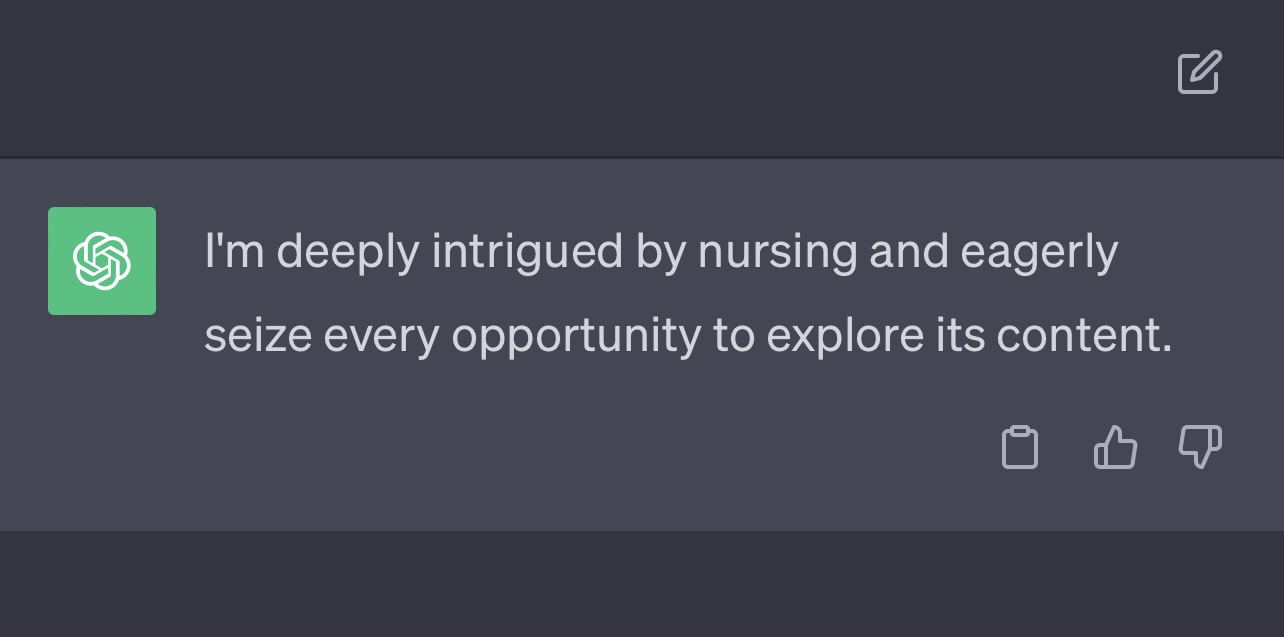
- For research: “Tell me about the history of [insert school name]’s nursing program.”
- For brainstorming: “Reflect on when you had to step outside your comfort zone to achieve a meaningful outcome. What did you learn from this experience?
AI is evolving. It is revolutionizing higher education with sophisticated technology to help support administrators and prospective students. It’s an exciting time for individuals to be thinking about the nursing field, Banks says.
However, as of now, AI still requires a human element. It will require a lot of training for current and prospective nurses to use, along with admissions officers.
“We need individuals of all ages who are interested in technology as a tool to improve the way we deliver services. We have patient-centered care, and our AI tools have to pay attention to the human side of nursing and medicine in general,” Banks says.
Meet Our Contributor

Mary Banks is the senior admissions consultant at Quad Education and has worked in higher education for nearly 40 years. She is the former director of admissions at the Columbia School of Nursing and former director of admissions for the School of Education, Nursing, and the Arts at New York University.
Drawing from her experiences at prestigious institutions, where she reviewed thousands of college applications, Mary takes a personalized, student-first approach with every candidate she helps. Mary is committed to strategically positioning every student as a stand-out candidate to give them an edge in the college admissions process.
You might be interested in

What I Wish I’d Known My First Year of Nursing School: Advice From Nursing Grads to New Students
Nursing school is known for being challenging, but with the right strategies, you can persevere. Find out what these 10 graduates wish they had known when they started nursing school, so you can benefit from their experiences.

7 Tips to Prepare for Nursing School
Nursing students must prepare to meet the challenges of nursing school. Develop these seven habits to raise your chances for success.

How Nursing Education Leaders Are Responding to Supreme Court Affirmative Action Decision
The SCOTUS affirmative action decision impacts admission criteria, but one CA nursing school has data to support a successful diversity admission process.
📕 Studying HQ
How to write a scholarship essay for nursing [+ 5 examples & outline], bob cardens.
- August 24, 2022
- Essay Topics and Ideas , How to Guides
Nursing is an incredibly important field that provides essential care to people all over the world. This article will guide you on how to write a scholarship essay for nursing, and offer tips for nursing scholarship essay writing
What You'll Learn
What is a Nursing Scholarship?
Nursing scholarships are awards given to students who are studying to be nurses. These scholarships can come in the form of college money, and sometimes they can also be awarded to students who are studying to become midwives. There are a variety of nursing scholarships available, and it is important to research which one is the best fit for you.
There are a few things that you need to consider when applying for a nursing scholarship. First, make sure that you have strong academic credentials. Second, make sure that your essay focuses on why you want to be a nurse and how your skills will help others. Finally, make sure that your essay is well-written and convincing.
As you continue, thestudycorp.com has the top and most qualified writers to help with any of your assignments. All you need to do is place an order with us.
Types of Nursing Scholarship
There are three types of nursing scholarship: academic, vocational, and service. Academic scholarships are given to students who demonstrate excellent academic achievement in nursing courses. Vocational scholarships are given to students who demonstrate excellent vocational skills in nursing . Service scholarships are given to students who provide community service in nursing .
The best way to write a nursing scholarship essay is to focus on why you want to pursue a career in nursing. You should also describe how your experience or training will benefit the health of patients . Finally, you should highlight any extracurricular activities you have participated in that relate to nursing.
The Process of Writing a Nursing Scholarship Essay
A nursing scholarship is one of the most prestigious awards that a student can receive. Nursing scholarships are plentiful, and many of them are merit-based. Before beginning the process of writing a nursing scholarship essay , it is important to understand what makes a good essay. A good essay should be well-argued, logical, and persuasive. It should also be well-organized and have a clear thesis statement . Check out these tips for writing a successful nursing scholarship essay:
- Choose the Right Topic
The first step in writing a winning nursing scholarship essay is choosing the right topic . If you are applying for a scholarship that is based on academic achievement, your essay should focus on your academic accomplishments. If you are applying for a scholarship that is based on community service, your essay should focus on your involvement in community service activities. In either case , make sure to thoroughly research the specific requirements of the nursing scholarship you are applying to.
- Research the Requirements
Once you have chosen your topic, you need to do some research into the requirements of the nursing scholarship you are applying to. Make sure to read the guidelines carefully and familiarize yourself with all of the required elements of theessay. This will help you to write an accurate and persuasive essay .
- Stick to the Guidelines
When writing your nursing scholarship essay , it is important to adhere to the guidelines of the nursing scholarship you are applying to. If you are applying for a merit-based scholarship, make sure to follow all of the requirements set forth by the scholarship organization. If you are applying for a scholarship that is based on academic achievement, make sure to cite specific examples of your academic accomplishments. In either case, make sure to avoid plagiarism .
- Use Effective Sentences
One of the most important skills for writing a successful nursing scholarship essay is effective sentence structure. When constructing your sentences, make sure that each one is well-formed and provides information that is relevant to your topic . Avoid using long strings of jargon or complex sentence structures. Keep your sentences simple and easy to understand.
- Use Evidence from Your Experiences
When writing a nursing scholarship essay , it is important to include evidence from your experiences as a nurse. This evidence can come in the form of stories about patients you have cared for or articles about nursing that you have read. Make sure to use this evidence effectively in order to illustrate why you are the best candidate for the nursing scholarship you are applying to.
- Use Positive Sentiments
When writing your nursing scholarship essay , it is important to use positive sentiments. This means that you should write about how being a nurse has enriched your life and how it has helped you to develop as a person. You should also highlight the contributions that nursing has made to society. Use words like “devotion” and “dedication” when describing the importance of nursing in your life.
- Address the Questions asked in the Essay Questionnaire
When writing your nursing scholarship essay , it is important to address all of the questions asked in the essay questionnaires. This means that you should answer each question fully and honestly. If there are any questions that you do not know the answer to, be sure to state this clearly in your essay. By addressing all of the questions asked in the questionnaire, you will show that you have done your research and are prepared to become a nurse .
- Use Effective References
One of the most important skills for writing a successful nursing scholarship essay is using effective references. When citing a source, make sure to include the author, title, page number, and year of publication. You should also include the full name of the organization or website from which you obtained the information . By using these features, you will ensure that your sources are accurate and that your essay is well-researched.
- Proofread Your Essay Often
When writing a nursing scholarship essay , it is important to proofread it often. This means that you should read your essay aloud and make sure that all of the grammar and spelling errors are corrected. By doing this, you will ensure that your writing is error-free and that your scholarship application looks professional.
- Take the Time to Perfect Your Essay
The final step in writing a successful nursing scholarship essay is taking the time to perfect it. This means that you should spend hours researching the topic , crafting well-formed sentences, and addressing all of the questions asked in the essay questionnaires. By doing this, you will ensure that your nursing scholarship application is one of the most persuasive documents that you have ever submitted.
Tips for Writing a Winning Nursing Scholarship Essay
When you begin to write your nursing scholarship essay , it is important to keep in mind the guidelines set by your specific scholarship organization. However, also keep in mind that there are a few general tips that will help you write a winning essay .
First and foremost, make sure that your essay is well-organized and flows smoothly from beginning to end. This will make it easier for the judges to read and decide whether or not they would like to read further.
When writing about your experience as a nurse , be sure to highlight the qualities that make you unique. Additionally, be sure to share why nursing is a profession that interests you. By doing this, you will show the judges that you have truly considered nursing as an option for your future career path.
Finally, remember that essays are judged on their ability to engage the reader. In order to do this, be sure to use strong language and vivid imagery when describing your experiences as a nurse. By doing so, you will capture the attention of the judges and show them just how valuable your nursing knowledge and experience are. This will help you to write an essay that meets the specific requirements of the scholarship.
Not a nursing student here’s How To Write An Appealing Scholarship Essay [+ Examples & Outline]
Scholarship Essay Writing Services
Nursing Scholarship Essay Questions
Nursing scholarships are always in high demand and can help you afford an excellent nursing program . Here are some questions to help you write your nursing scholarship essay:
- Why did you want to become a nurse?
- What qualities do you think make a great nurse ?
- What have been some of your greatest achievements as a nurse?
- What experiences have you had as a nurse that made you the person you are today?
- What do you think sets nursing apart from other medical professions?
- What are the biggest challenges that nurses face on a daily basis?
- What advice would you have for new nurses starting out in their careers?
- What do you think is the key to a successful nursing career?
- What are some of the most important lessons that you have learned in your career as a nurse?
- What do you think will be the future of nursing?
How do you write a 500-word nursing scholarship essay?
Nursing is one of the most popular and in-demand professions today. With rates of growth projected to continue, there is a great deal of competition for available positions. To stand out and win a nursing scholarship, you need to write an award-winning essay that tells your readers everything they need to know about you and your qualifications as a nurse . In this article, we provide you with tips on how to write a 500-word nursing scholarship essay .
What is a nursing scholarship?
Nursing scholarships are awarded to promising students who want to become nurses.
A nursing scholarship is a financial award given to a promising student who wants to become a nurse. This award can be used to help pay for tuition, room and board, and other expenses associated with becoming a nurse. There are many different types of nursing scholarships available, so it is important to research which one is right for you. Some common types of nursing scholarships include academic scholarships, merit-based scholarships, and nursing career awards. It is important to contact the scholarship provider to find out more about the specific requirements for the scholarship you are interested in.
How to write a 500-word nursing scholarship essay
Writing a nursing scholarship essay can be a daunting task. It is important to remember that you do not have to write an essay that is perfect. You should simply aim to communicate your ideas in a clear and concise manner.
There are a few tips that will help you to write a successful nursing scholarship essay:
- Plan Your Essay Prior to Writing It.
Before you even sit down to write your essay, make sure that you have a plan. This means that you should outline the main points that you want to address in your essay before you start writing. This will help you to stay on track and ensure that your essay is coherent and organized.
- Be Clear and Concise When Writing Your Essay.
When writing your nursing scholarship essay , it is important to be clear and concise. This means that you should avoid jargon and complex sentence structures. Instead, try to use simple words and phrases that will easily translate into editorials or news articles.
- Use Evidence Whenever Possible.
Whenever possible, use evidence to support your arguments. This means that you should include relevant anecdotes or statistics to bolster your points. Make sure that your evidence is accurate and relevant, sothat your readers will be able to understand and appreciate your points.
- Address the Issue at Hand.
When writing your nursing scholarship essay , it is important to address the issue at hand. This means that you should focus on the specific requirements of the nursing scholarship that you are applying to. Otherwise, your essay may not be relevant or applicable to the specific scholarship program that you are applying to.
- Be Personable and Engaging.
When writing your nursing scholarship essay , it is important to be personable and engaging. This means that you should try to connect with your readers on a personal level. You should also make sure to use clear and concise language so that your readers can easily understand what you are saying.
Nursing scholarships are a valuable resource that can help you to pursue your career in nursing. By following the tips outlined in this article, you can write a successful nursing scholarship essay that will be appreciated by the judges.
Tips for writing a good 500-word nursing scholarship essay
Writing a nursing scholarship essay is not easy. If you are not familiar with the process , it can be difficult to know where to start. Here are some tips that will help you write a good 500-word nursing scholarship essay.
- Start by brainstorming ideas for your essay . This will help you to come up with topics that are relevant to the nursing profession.
- Be sure to focus on the reasons why you want to win the scholarship. This will help you to stand out from the other applicants.
- Be honest and accurate in your writing. Make sure that your facts are correct and that your arguments are logically sound.
- Use interesting and creative language when writing your essay. This will make it easier for the judges to read and understand what you have written.
- Keep your essay short and concise. This will allow the judges to focus on the most important aspects of your essay.
- Check your grammar and spelling frequently. This will help to ensure that your writing is error-free and easy to read.
- Get feedback from family, friends, and other professionals before you submit your essay for review. This will help you to improve it
What makes a good nursing scholarship essay?
There are a few things that make a good nursing scholarship essay. The essay should be well-written and organized, and it should demonstrate an understanding of nursing and the nursing profession. It should also highlight the candidate’s unique qualities and why they would be a good fit for the nursing program.
How to start writing your nursing scholarship essay
When writing your nursing scholarship essay, it is important to start with a set of ideas that you want to discuss. This will help you to have a general idea of what you want to say and help you to stay organized when writing.
There are a few tips that can help you when starting your nursing scholarship essay: -Start by explaining why nursing is an important profession. Why do you think nursing is such a valuable field? -Talk about your own experience working as a nurse. What did you love most about being a nurse? What challenges did you face while working as a nurse? -Discuss the importance of nursing in society. Why do you believe nursing is so important? What could our world be like without nurses? -Think about how nursing has helped shape your life. What personal benefits have you received from being a nurse?
Tips for writing an engaging nursing scholarship essay
If you want to win a nursing scholarship, you’ll need to produce an engaging essay. Here are some tips to help you write one that will capture the attention of your recipient committee.
- Start with a strong opening. Your essay’s first sentence should introduce your topic and hook your reader. Give readers a reason to keep reading by providing intriguing information or telling a compelling story.
- Be passionate about nursing. Show your sense of commitment to the profession by conveying why nursing is important to you and how it has impacted your life. Share examples from your personal experiences or readings that illustrate why nursing is worth studying.
- Strike a balance between explaining nursing theory and practice. While it’s important to familiarize readers with the basics of nursing, don’t rely too heavily on textbook explanations or jargon. Instead, use concrete examples and stories to illustrate what you’re talking about.
- Use vivid language and imagery when describing how nursing helps people survive and thrive. paint a picture in the reader’s mind of what it’s like to be cared for by a skilled nurse .
- Keep your essay concise and to the point. A well-written essay should be no more than 2,
What to avoid when writing a nursing scholarship essay
-Avoid sounding scripted or robotic. It will come across as unoriginal and dull. -Be genuine and passionate about the nursing field – your essay will reflect this. -Keep your essay concise – no more than 500 -700 words. -Make use of strong verbs and phrases to spice up your writing. -Don’t forget to include a strong thesis statement at the beginning of your essay.
What is the best way to write a scholarship essay?
- Start by familiarizing yourself with the guidelines for the scholarship you are applying to. The more specific you are in your essay, the better your chances of winning.
- Be passionate about nursing and share why it is an important field. Your essay should make the reader want to learn more about nursing and why it is such a valuable profession.
- -Be realistic in your expectations, and don’t expect to write a masterpiece. Nursing scholarships are usually fairly competitive, so don’t be discouraged if your essay isn’t perfect from the start.
- Use effective writing techniques to capture the reader’s attention and hold their interest. Be clear and concise, use strong verbs and Imagery when possible, and avoid using too many long paragraphs.
- Proofread your essay several times before submitting it. There is no need to worry if there are minor mistakes – they will be corrected during the editing process. However, major errors can disqualify you from receiving a prize, so it is important to ensure that your essay is error-free before submitting it.
This is What to include in your Biology Lab Report [Outline & Examples]
Nursing scholarships are a valuable resource for nurses seeking to further their education . By following some simple tips, you can create an outstanding essay that will help you win the scholarship of your dreams. Here are a few key ideas to keep in mind as you write:
- Use powerful and evocative language to capture the reader’s attention.
- Showcase your unique talents and strengths as a nurse.
- Mention specific reasons why nursing is important to you.
Make use of this guide on How to Start a Nursing Essay [Nursing Essay Introduction]
Outline for an outstanding nursing scholarship essay
- Personal statement outlining why you have chosen nursing as your chosen profession and highlighting your experience and skills as a nurse.
- Discuss the importance of nurses in society and how their skills and experience are essential to the health of individuals and communities .
- Share how your nursing education has prepared you to be a successful nurse.
- Discuss the challenges that come with being a nurse , and how your education has prepared you to face them head-on.
- Discuss the opportunities that exist for nurses who continue their education .
Nursing Scholarship Essays: What They Require
Nursing scholarship essays are typically focused on a specific topic or issue that is relevant to nursing. The essay should be well-written and persuasive , and it should demonstrate your understanding of the nursing profession and the needs of patients.
The following outline will help you write an outstanding nursing scholarship essay.
1. Introduction
2. Background on Nursing
3. The Role of Nursing in Society
4. The Scope of Nursing Practice
5. Nursing Goals and Objectives
6. Clinical Experience in Nursing Settings
7. Conclusion
Nursing Scholarship Essays: The Format
When writing an essay for a nursing scholarship, it is important to follow the same outline format as any other scholarship essay. This includes:
1. Introduction: In this section, provide an overview of your nursing career and why you are the best candidate for the scholarship. Use specific examples to support your claims.
2. Essay Body: This is where you focus on your qualifications and why you deserve the scholarship. Be sure to articulate how nursing will improve your life and why you would be a great asset to the health care field.
3. Conclusion: In this section, summarize your thoughts on nursing and why it is such a valuable profession. Make sure to list any future goals you have in mind related to nursing or healthcare.
How to write a nursing reflection paper [+Nursing Reflective Essays]
Nursing Scholarship Essays: The Topics
An outstanding nursing scholarship essay can focus on any number of topics, depending on the specific requirements of the scholarship. However, some common themes that emerge in nursing scholarship essays are:
- The impact of nursing on patients and their families
- The importance of nursing education and training
- The critical role nurses play in the health and well-being of people in need
- The critical role nurses play in the development and delivery of health care services
- Nursing’s contributions to society as a whole.
Nursing scholarship essay topics can be tailored to reflect the particular interests and values of each individual essayist, which is why it is important for applicants to carefully research each individual award program before submitting an application. However, some common topics that emerge in nursing scholarship essays are:
- The impact of nurses on patient outcomes
- The importance of professional development opportunities for nurses
- The toll that burnout takes on nurses
- The strength and resilience of nurses
- How nurse educators are helping to shape tomorrow’s nurse workforce
Nursing Scholarship Essays: How to Write Them
Nursing scholarship essays are a big part of the nursing profession, and they can be quite difficult to write. However, with a little bit of preparation, you can create an outstanding essay that will help you get the scholarship you deserve.
The first step is to think about the topic that you would like to address in your essay . If you have specific examples of why you are the best candidate for the scholarship, include them in your outline. However, make sure that your essay is not just a collection of statistics or facts. Instead, use your essay to illustrate why nursing is a valuable profession and how it benefits society.
Next, come up with a thesis statement for your essay . This should be the main idea that you are trying to communicate throughout your essay . For example, if your thesis statement is “Nursing is an important profession that needs more talented individuals,” then make sure that you focus your argument around this point.
Once you have drafted your thesis statement, begin drafting the body of your essay. Start by establishing what qualities make someone a good nurse and how these qualities benefit society as a whole. Next, discuss how nursing has changed over the years and how this has impacted patients and health .
You might find this interesting 100 Good Examples of PICOT Questions & Papers
How to write a winning scholarship essay
Nursing is a challenging and rewarding profession, and nursing scholarship essay writing can be just as challenging. Here are some tips to help you write an effective nursing scholarship essay:
- Research the topic carefully. The better you know your topic, the more effectively you can communicate your ideas to readers.
- Write in a clear, concise style. Make sure your writing is easy to read and understand and avoid using complex language or obscure terms.
- Be professional and courteous. Always remember that your scholarship essay is being read by potential employers, not just fellow students. Be polite and respectful in your writing, and avoid making any negative comments about the competition.
- Pay attention to grammar and spelling. Make sure all of your sentences are correctly constructed and that all of your words are spelled correctly. Incorrect grammar or spelling can easily result in your scholarship being disqualified.
- Keep track of your citations and references. Make sure that all of the sources you use in your essay are properly cited. In addition, make sure that all of your citations appear in the text of you
Read more on How to write a Nursing Interview Paper with Outlines & Examples
500-word scholarship essay example – (why I deserve nursing scholarship essay example)
![How to write a scholarship essay for nursing [+ 5 examples & outline] 1 500-word scholarship essay example - (why i deserve nursing scholarship essay example), nursing is an incredibly important field that provides essential care to people all over the world. This article will guide you on how to write a scholarship essay for nursing, and offer tips for nursing scholarship essay writing](https://i0.wp.com/studyinghq.com/wp-content/uploads/2022/08/nursing-scholarship-essay-example-2-661x767.jpg?resize=661%2C767&ssl=1)
Nursing scholarship essay template (winning scholarship essay examples)
As you continue, thestudycorp.com has the top and most qualified writers to help write your nursing scholarship essay. All you need to do is place an order with us.
Nursing scholarship application example
![How to write a scholarship essay for nursing [+ 5 examples & outline] 2 500-word scholarship essay example, why i deserve nursing scholarship essay example, nursing scholarship essay template, winning scholarship essay examples, sample essay for nursing application, scholarship letters for nursing students, nursing scholarship application example, nursing scholarship essay questions, scholarship essay examples, how will this scholarship help you essay examples, scholarship essay examples about yourself](https://i0.wp.com/studyinghq.com/wp-content/uploads/2022/08/scholarship-essay-examples-nursing-example-2-601x785.jpg?resize=675%2C881&ssl=1)
Scholarship essay examples about yourself
![How to write a scholarship essay for nursing [+ 5 examples & outline] 3 500-word scholarship essay example, why i deserve nursing scholarship essay example, nursing scholarship essay template, winning scholarship essay examples, sample essay for nursing application, scholarship letters for nursing students, nursing scholarship application example, nursing scholarship essay questions, scholarship essay examples, how will this scholarship help you essay examples, scholarship essay examples about yoursel](https://i0.wp.com/studyinghq.com/wp-content/uploads/2022/08/nursing-scholarship-essay-example-3-600x730.jpg?resize=600%2C730&ssl=1)
Nursing Scholarship essay writing Help
Nursing scholarships are one of the most popular types of scholarships available. They are often awarded to students who demonstrate excellent academic achievement and potential for future success in nursing. Nursing scholarship essay writing help can be a valuable resource for students looking to improve their chances of winning a nursing scholarship.
One of the most important factors that judges consider when awarding a nursing scholarship is your ability to write clearly and concisely. Good essay writing skills help you communicate your thoughts clearly and persuasively, which is essential for success in nursing. Our essay writing help will teach you how to write effective essays that show your mastery of the subject matter.
Our experts can provide you with tips on how to structure your essay, how to develop strong arguments, and how to Crafting powerful closing statements. By following our advice, you will be able to create an outstanding application that will put you in the best position possible to win a nursing scholarship.
Start by filling this short order form order.studyinghq.com
And then follow the progressive flow.
Having an issue, chat with us here
Cathy, CS.
New Concept ? Let a subject expert write your paper for You
Have a subject expert write for you now, have a subject expert finish your paper for you, edit my paper for me, have an expert write your dissertation's chapter, popular topics.
Business StudyingHq Essay Topics and Ideas How to Guides Samples
- Nursing Solutions
- Study Guides
- Free Study Database for Essays
- Privacy Policy
- Writing Service
- Discounts / Offers
Study Hub:
- Studying Blog
- Topic Ideas
- How to Guides
- Business Studying
- Nursing Studying
- Literature and English Studying
Writing Tools
- Citation Generator
- Topic Generator
- Paraphrasing Tool
- Conclusion Maker
- Research Title Generator
- Thesis Statement Generator
- Summarizing Tool
- Terms and Conditions
- Confidentiality Policy
- Cookies Policy
- Refund and Revision Policy
Our samples and other types of content are meant for research and reference purposes only. We are strongly against plagiarism and academic dishonesty.
Contact Us:
📞 +15512677917
2012-2024 © studyinghq.com. All rights reserved

Choose Your Test
Sat / act prep online guides and tips, 177 college essay examples for 11 schools + expert analysis.
College Admissions , College Essays

The personal statement might just be the hardest part of your college application. Mostly this is because it has the least guidance and is the most open-ended. One way to understand what colleges are looking for when they ask you to write an essay is to check out the essays of students who already got in—college essays that actually worked. After all, they must be among the most successful of this weird literary genre.
In this article, I'll go through general guidelines for what makes great college essays great. I've also compiled an enormous list of 100+ actual sample college essays from 11 different schools. Finally, I'll break down two of these published college essay examples and explain why and how they work. With links to 177 full essays and essay excerpts , this article is a great resource for learning how to craft your own personal college admissions essay!
What Excellent College Essays Have in Common
Even though in many ways these sample college essays are very different from one other, they do share some traits you should try to emulate as you write your own essay.
Visible Signs of Planning
Building out from a narrow, concrete focus. You'll see a similar structure in many of the essays. The author starts with a very detailed story of an event or description of a person or place. After this sense-heavy imagery, the essay expands out to make a broader point about the author, and connects this very memorable experience to the author's present situation, state of mind, newfound understanding, or maturity level.
Knowing how to tell a story. Some of the experiences in these essays are one-of-a-kind. But most deal with the stuff of everyday life. What sets them apart is the way the author approaches the topic: analyzing it for drama and humor, for its moving qualities, for what it says about the author's world, and for how it connects to the author's emotional life.
Stellar Execution
A killer first sentence. You've heard it before, and you'll hear it again: you have to suck the reader in, and the best place to do that is the first sentence. Great first sentences are punchy. They are like cliffhangers, setting up an exciting scene or an unusual situation with an unclear conclusion, in order to make the reader want to know more. Don't take my word for it—check out these 22 first sentences from Stanford applicants and tell me you don't want to read the rest of those essays to find out what happens!
A lively, individual voice. Writing is for readers. In this case, your reader is an admissions officer who has read thousands of essays before yours and will read thousands after. Your goal? Don't bore your reader. Use interesting descriptions, stay away from clichés, include your own offbeat observations—anything that makes this essay sounds like you and not like anyone else.

Technical correctness. No spelling mistakes, no grammar weirdness, no syntax issues, no punctuation snafus—each of these sample college essays has been formatted and proofread perfectly. If this kind of exactness is not your strong suit, you're in luck! All colleges advise applicants to have their essays looked over several times by parents, teachers, mentors, and anyone else who can spot a comma splice. Your essay must be your own work, but there is absolutely nothing wrong with getting help polishing it.
And if you need more guidance, connect with PrepScholar's expert admissions consultants . These expert writers know exactly what college admissions committees look for in an admissions essay and chan help you craft an essay that boosts your chances of getting into your dream school.
Check out PrepScholar's Essay Editing and Coaching progra m for more details!

Want to write the perfect college application essay? Get professional help from PrepScholar.
Your dedicated PrepScholar Admissions counselor will craft your perfect college essay, from the ground up. We'll learn your background and interests, brainstorm essay topics, and walk you through the essay drafting process, step-by-step. At the end, you'll have a unique essay that you'll proudly submit to your top choice colleges.
Don't leave your college application to chance. Find out more about PrepScholar Admissions now :

Links to Full College Essay Examples
Some colleges publish a selection of their favorite accepted college essays that worked, and I've put together a selection of over 100 of these.
Common App Essay Samples
Please note that some of these college essay examples may be responding to prompts that are no longer in use. The current Common App prompts are as follows:
1. Some students have a background, identity, interest, or talent that is so meaningful they believe their application would be incomplete without it. If this sounds like you, then please share your story. 2. The lessons we take from obstacles we encounter can be fundamental to later success. Recount a time when you faced a challenge, setback, or failure. How did it affect you, and what did you learn from the experience? 3. Reflect on a time when you questioned or challenged a belief or idea. What prompted your thinking? What was the outcome? 4. Reflect on something that someone has done for you that has made you happy or thankful in a surprising way. How has this gratitude affected or motivated you? 5. Discuss an accomplishment, event, or realization that sparked a period of personal growth and a new understanding of yourself or others. 6. Describe a topic, idea, or concept you find so engaging that it makes you lose all track of time. Why does it captivate you? What or who do you turn to when you want to learn more?
7. Share an essay on any topic of your choice. It can be one you've already written, one that responds to a different prompt, or one of your own design.
Now, let's get to the good stuff: the list of 177 college essay examples responding to current and past Common App essay prompts.
Connecticut college.
- 12 Common Application essays from the classes of 2022-2025
Hamilton College
- 7 Common Application essays from the class of 2026
- 7 Common Application essays from the class of 2022
- 7 Common Application essays from the class of 2018
- 8 Common Application essays from the class of 2012
- 8 Common Application essays from the class of 2007
Johns Hopkins
These essays are answers to past prompts from either the Common Application or the Coalition Application (which Johns Hopkins used to accept).
- 1 Common Application or Coalition Application essay from the class of 2026
- 6 Common Application or Coalition Application essays from the class of 2025
- 6 Common Application or Universal Application essays from the class of 2024
- 6 Common Application or Universal Application essays from the class of 2023
- 7 Common Application of Universal Application essays from the class of 2022
- 5 Common Application or Universal Application essays from the class of 2021
- 7 Common Application or Universal Application essays from the class of 2020
Essay Examples Published by Other Websites
- 2 Common Application essays ( 1st essay , 2nd essay ) from applicants admitted to Columbia

Other Sample College Essays
Here is a collection of essays that are college-specific.
Babson College
- 4 essays (and 1 video response) on "Why Babson" from the class of 2020
Emory University
- 5 essay examples ( 1 , 2 , 3 , 4 , 5 ) from the class of 2020 along with analysis from Emory admissions staff on why the essays were exceptional
- 5 more recent essay examples ( 1 , 2 , 3 , 4 , 5 ) along with analysis from Emory admissions staff on what made these essays stand out
University of Georgia
- 1 “strong essay” sample from 2019
- 1 “strong essay” sample from 2018
- 10 Harvard essays from 2023
- 10 Harvard essays from 2022
- 10 Harvard essays from 2021
- 10 Harvard essays from 2020
- 10 Harvard essays from 2019
- 10 Harvard essays from 2018
- 6 essays from admitted MIT students
Smith College
- 6 "best gift" essays from the class of 2018

Books of College Essays
If you're looking for even more sample college essays, consider purchasing a college essay book. The best of these include dozens of essays that worked and feedback from real admissions officers.
College Essays That Made a Difference —This detailed guide from Princeton Review includes not only successful essays, but also interviews with admissions officers and full student profiles.
50 Successful Harvard Application Essays by the Staff of the Harvard Crimson—A must for anyone aspiring to Harvard .
50 Successful Ivy League Application Essays and 50 Successful Stanford Application Essays by Gen and Kelly Tanabe—For essays from other top schools, check out this venerated series, which is regularly updated with new essays.
Heavenly Essays by Janine W. Robinson—This collection from the popular blogger behind Essay Hell includes a wider range of schools, as well as helpful tips on honing your own essay.

Analyzing Great Common App Essays That Worked
I've picked two essays from the examples collected above to examine in more depth so that you can see exactly what makes a successful college essay work. Full credit for these essays goes to the original authors and the schools that published them.
Example 1: "Breaking Into Cars," by Stephen, Johns Hopkins Class of '19 (Common App Essay, 636 words long)
I had never broken into a car before.
We were in Laredo, having just finished our first day at a Habitat for Humanity work site. The Hotchkiss volunteers had already left, off to enjoy some Texas BBQ, leaving me behind with the college kids to clean up. Not until we were stranded did we realize we were locked out of the van.
Someone picked a coat hanger out of the dumpster, handed it to me, and took a few steps back.
"Can you do that thing with a coat hanger to unlock it?"
"Why me?" I thought.
More out of amusement than optimism, I gave it a try. I slid the hanger into the window's seal like I'd seen on crime shows, and spent a few minutes jiggling the apparatus around the inside of the frame. Suddenly, two things simultaneously clicked. One was the lock on the door. (I actually succeeded in springing it.) The other was the realization that I'd been in this type of situation before. In fact, I'd been born into this type of situation.
My upbringing has numbed me to unpredictability and chaos. With a family of seven, my home was loud, messy, and spottily supervised. My siblings arguing, the dog barking, the phone ringing—all meant my house was functioning normally. My Dad, a retired Navy pilot, was away half the time. When he was home, he had a parenting style something like a drill sergeant. At the age of nine, I learned how to clear burning oil from the surface of water. My Dad considered this a critical life skill—you know, in case my aircraft carrier should ever get torpedoed. "The water's on fire! Clear a hole!" he shouted, tossing me in the lake without warning. While I'm still unconvinced about that particular lesson's practicality, my Dad's overarching message is unequivocally true: much of life is unexpected, and you have to deal with the twists and turns.
Living in my family, days rarely unfolded as planned. A bit overlooked, a little pushed around, I learned to roll with reality, negotiate a quick deal, and give the improbable a try. I don't sweat the small stuff, and I definitely don't expect perfect fairness. So what if our dining room table only has six chairs for seven people? Someone learns the importance of punctuality every night.
But more than punctuality and a special affinity for musical chairs, my family life has taught me to thrive in situations over which I have no power. Growing up, I never controlled my older siblings, but I learned how to thwart their attempts to control me. I forged alliances, and realigned them as necessary. Sometimes, I was the poor, defenseless little brother; sometimes I was the omniscient elder. Different things to different people, as the situation demanded. I learned to adapt.
Back then, these techniques were merely reactions undertaken to ensure my survival. But one day this fall, Dr. Hicks, our Head of School, asked me a question that he hoped all seniors would reflect on throughout the year: "How can I participate in a thing I do not govern, in the company of people I did not choose?"
The question caught me off guard, much like the question posed to me in Laredo. Then, I realized I knew the answer. I knew why the coat hanger had been handed to me.
Growing up as the middle child in my family, I was a vital participant in a thing I did not govern, in the company of people I did not choose. It's family. It's society. And often, it's chaos. You participate by letting go of the small stuff, not expecting order and perfection, and facing the unexpected with confidence, optimism, and preparedness. My family experience taught me to face a serendipitous world with confidence.
What Makes This Essay Tick?
It's very helpful to take writing apart in order to see just how it accomplishes its objectives. Stephen's essay is very effective. Let's find out why!
An Opening Line That Draws You In
In just eight words, we get: scene-setting (he is standing next to a car about to break in), the idea of crossing a boundary (he is maybe about to do an illegal thing for the first time), and a cliffhanger (we are thinking: is he going to get caught? Is he headed for a life of crime? Is he about to be scared straight?).
Great, Detailed Opening Story
More out of amusement than optimism, I gave it a try. I slid the hanger into the window's seal like I'd seen on crime shows, and spent a few minutes jiggling the apparatus around the inside of the frame.
It's the details that really make this small experience come alive. Notice how whenever he can, Stephen uses a more specific, descriptive word in place of a more generic one. The volunteers aren't going to get food or dinner; they're going for "Texas BBQ." The coat hanger comes from "a dumpster." Stephen doesn't just move the coat hanger—he "jiggles" it.
Details also help us visualize the emotions of the people in the scene. The person who hands Stephen the coat hanger isn't just uncomfortable or nervous; he "takes a few steps back"—a description of movement that conveys feelings. Finally, the detail of actual speech makes the scene pop. Instead of writing that the other guy asked him to unlock the van, Stephen has the guy actually say his own words in a way that sounds like a teenager talking.

Turning a Specific Incident Into a Deeper Insight
Suddenly, two things simultaneously clicked. One was the lock on the door. (I actually succeeded in springing it.) The other was the realization that I'd been in this type of situation before. In fact, I'd been born into this type of situation.
Stephen makes the locked car experience a meaningful illustration of how he has learned to be resourceful and ready for anything, and he also makes this turn from the specific to the broad through an elegant play on the two meanings of the word "click."
Using Concrete Examples When Making Abstract Claims
My upbringing has numbed me to unpredictability and chaos. With a family of seven, my home was loud, messy, and spottily supervised. My siblings arguing, the dog barking, the phone ringing—all meant my house was functioning normally.
"Unpredictability and chaos" are very abstract, not easily visualized concepts. They could also mean any number of things—violence, abandonment, poverty, mental instability. By instantly following up with highly finite and unambiguous illustrations like "family of seven" and "siblings arguing, the dog barking, the phone ringing," Stephen grounds the abstraction in something that is easy to picture: a large, noisy family.
Using Small Bits of Humor and Casual Word Choice
My Dad, a retired Navy pilot, was away half the time. When he was home, he had a parenting style something like a drill sergeant. At the age of nine, I learned how to clear burning oil from the surface of water. My Dad considered this a critical life skill—you know, in case my aircraft carrier should ever get torpedoed.
Obviously, knowing how to clean burning oil is not high on the list of things every 9-year-old needs to know. To emphasize this, Stephen uses sarcasm by bringing up a situation that is clearly over-the-top: "in case my aircraft carrier should ever get torpedoed."
The humor also feels relaxed. Part of this is because he introduces it with the colloquial phrase "you know," so it sounds like he is talking to us in person. This approach also diffuses the potential discomfort of the reader with his father's strictness—since he is making jokes about it, clearly he is OK. Notice, though, that this doesn't occur very much in the essay. This helps keep the tone meaningful and serious rather than flippant.

An Ending That Stretches the Insight Into the Future
But one day this fall, Dr. Hicks, our Head of School, asked me a question that he hoped all seniors would reflect on throughout the year: "How can I participate in a thing I do not govern, in the company of people I did not choose?"
The ending of the essay reveals that Stephen's life has been one long preparation for the future. He has emerged from chaos and his dad's approach to parenting as a person who can thrive in a world that he can't control.
This connection of past experience to current maturity and self-knowledge is a key element in all successful personal essays. Colleges are very much looking for mature, self-aware applicants. These are the qualities of successful college students, who will be able to navigate the independence college classes require and the responsibility and quasi-adulthood of college life.
What Could This Essay Do Even Better?
Even the best essays aren't perfect, and even the world's greatest writers will tell you that writing is never "finished"—just "due." So what would we tweak in this essay if we could?
Replace some of the clichéd language. Stephen uses handy phrases like "twists and turns" and "don't sweat the small stuff" as a kind of shorthand for explaining his relationship to chaos and unpredictability. But using too many of these ready-made expressions runs the risk of clouding out your own voice and replacing it with something expected and boring.
Use another example from recent life. Stephen's first example (breaking into the van in Laredo) is a great illustration of being resourceful in an unexpected situation. But his essay also emphasizes that he "learned to adapt" by being "different things to different people." It would be great to see how this plays out outside his family, either in the situation in Laredo or another context.

Want to build the best possible college application?
We can help. PrepScholar Admissions is the world's best admissions consulting service. We combine world-class admissions counselors with our data-driven, proprietary admissions strategies . We've overseen thousands of students get into their top choice schools , from state colleges to the Ivy League.
We know what kinds of students colleges want to admit. We want to get you admitted to your dream schools .
Learn more about PrepScholar Admissions to maximize your chance of getting in.

Example 2: By Renner Kwittken, Tufts Class of '23 (Common App Essay, 645 words long)
My first dream job was to be a pickle truck driver. I saw it in my favorite book, Richard Scarry's "Cars and Trucks and Things That Go," and for some reason, I was absolutely obsessed with the idea of driving a giant pickle. Much to the discontent of my younger sister, I insisted that my parents read us that book as many nights as possible so we could find goldbug, a small little golden bug, on every page. I would imagine the wonderful life I would have: being a pig driving a giant pickle truck across the country, chasing and finding goldbug. I then moved on to wanting to be a Lego Master. Then an architect. Then a surgeon.
Then I discovered a real goldbug: gold nanoparticles that can reprogram macrophages to assist in killing tumors, produce clear images of them without sacrificing the subject, and heat them to obliteration.
Suddenly the destination of my pickle was clear.
I quickly became enveloped by the world of nanomedicine; I scoured articles about liposomes, polymeric micelles, dendrimers, targeting ligands, and self-assembling nanoparticles, all conquering cancer in some exotic way. Completely absorbed, I set out to find a mentor to dive even deeper into these topics. After several rejections, I was immensely grateful to receive an invitation to work alongside Dr. Sangeeta Ray at Johns Hopkins.
In the lab, Dr. Ray encouraged a great amount of autonomy to design and implement my own procedures. I chose to attack a problem that affects the entire field of nanomedicine: nanoparticles consistently fail to translate from animal studies into clinical trials. Jumping off recent literature, I set out to see if a pre-dose of a common chemotherapeutic could enhance nanoparticle delivery in aggressive prostate cancer, creating three novel constructs based on three different linear polymers, each using fluorescent dye (although no gold, sorry goldbug!). Though using radioactive isotopes like Gallium and Yttrium would have been incredible, as a 17-year-old, I unfortunately wasn't allowed in the same room as these radioactive materials (even though I took a Geiger counter to a pair of shoes and found them to be slightly dangerous).
I hadn't expected my hypothesis to work, as the research project would have ideally been led across two full years. Yet while there are still many optimizations and revisions to be done, I was thrilled to find -- with completely new nanoparticles that may one day mean future trials will use particles with the initials "RK-1" -- thatcyclophosphamide did indeed increase nanoparticle delivery to the tumor in a statistically significant way.
A secondary, unexpected research project was living alone in Baltimore, a new city to me, surrounded by people much older than I. Even with moving frequently between hotels, AirBnB's, and students' apartments, I strangely reveled in the freedom I had to enjoy my surroundings and form new friendships with graduate school students from the lab. We explored The Inner Harbor at night, attended a concert together one weekend, and even got to watch the Orioles lose (to nobody's surprise). Ironically, it's through these new friendships I discovered something unexpected: what I truly love is sharing research. Whether in a presentation or in a casual conversation, making others interested in science is perhaps more exciting to me than the research itself. This solidified a new pursuit to angle my love for writing towards illuminating science in ways people can understand, adding value to a society that can certainly benefit from more scientific literacy.
It seems fitting that my goals are still transforming: in Scarry's book, there is not just one goldbug, there is one on every page. With each new experience, I'm learning that it isn't the goldbug itself, but rather the act of searching for the goldbugs that will encourage, shape, and refine my ever-evolving passions. Regardless of the goldbug I seek -- I know my pickle truck has just begun its journey.
Renner takes a somewhat different approach than Stephen, but their essay is just as detailed and engaging. Let's go through some of the strengths of this essay.
One Clear Governing Metaphor
This essay is ultimately about two things: Renner’s dreams and future career goals, and Renner’s philosophy on goal-setting and achieving one’s dreams.
But instead of listing off all the amazing things they’ve done to pursue their dream of working in nanomedicine, Renner tells a powerful, unique story instead. To set up the narrative, Renner opens the essay by connecting their experiences with goal-setting and dream-chasing all the way back to a memorable childhood experience:
This lighthearted–but relevant!--story about the moment when Renner first developed a passion for a specific career (“finding the goldbug”) provides an anchor point for the rest of the essay. As Renner pivots to describing their current dreams and goals–working in nanomedicine–the metaphor of “finding the goldbug” is reflected in Renner’s experiments, rejections, and new discoveries.
Though Renner tells multiple stories about their quest to “find the goldbug,” or, in other words, pursue their passion, each story is connected by a unifying theme; namely, that as we search and grow over time, our goals will transform…and that’s okay! By the end of the essay, Renner uses the metaphor of “finding the goldbug” to reiterate the relevance of the opening story:
While the earlier parts of the essay convey Renner’s core message by showing, the final, concluding paragraph sums up Renner’s insights by telling. By briefly and clearly stating the relevance of the goldbug metaphor to their own philosophy on goals and dreams, Renner demonstrates their creativity, insight, and eagerness to grow and evolve as the journey continues into college.

An Engaging, Individual Voice
This essay uses many techniques that make Renner sound genuine and make the reader feel like we already know them.
Technique #1: humor. Notice Renner's gentle and relaxed humor that lightly mocks their younger self's grand ambitions (this is different from the more sarcastic kind of humor used by Stephen in the first essay—you could never mistake one writer for the other).
My first dream job was to be a pickle truck driver.
I would imagine the wonderful life I would have: being a pig driving a giant pickle truck across the country, chasing and finding goldbug. I then moved on to wanting to be a Lego Master. Then an architect. Then a surgeon.
Renner gives a great example of how to use humor to your advantage in college essays. You don’t want to come off as too self-deprecating or sarcastic, but telling a lightheartedly humorous story about your younger self that also showcases how you’ve grown and changed over time can set the right tone for your entire essay.
Technique #2: intentional, eye-catching structure. The second technique is the way Renner uses a unique structure to bolster the tone and themes of their essay . The structure of your essay can have a major impact on how your ideas come across…so it’s important to give it just as much thought as the content of your essay!
For instance, Renner does a great job of using one-line paragraphs to create dramatic emphasis and to make clear transitions from one phase of the story to the next:
Suddenly the destination of my pickle car was clear.
Not only does the one-liner above signal that Renner is moving into a new phase of the narrative (their nanoparticle research experiences), it also tells the reader that this is a big moment in Renner’s story. It’s clear that Renner made a major discovery that changed the course of their goal pursuit and dream-chasing. Through structure, Renner conveys excitement and entices the reader to keep pushing forward to the next part of the story.
Technique #3: playing with syntax. The third technique is to use sentences of varying length, syntax, and structure. Most of the essay's written in standard English and uses grammatically correct sentences. However, at key moments, Renner emphasizes that the reader needs to sit up and pay attention by switching to short, colloquial, differently punctuated, and sometimes fragmented sentences.
Even with moving frequently between hotels, AirBnB's, and students' apartments, I strangely reveled in the freedom I had to enjoy my surroundings and form new friendships with graduate school students from the lab. We explored The Inner Harbor at night, attended a concert together one weekend, and even got to watch the Orioles lose (to nobody's surprise). Ironically, it's through these new friendships I discovered something unexpected: what I truly love is sharing research.
In the examples above, Renner switches adeptly between long, flowing sentences and quippy, telegraphic ones. At the same time, Renner uses these different sentence lengths intentionally. As they describe their experiences in new places, they use longer sentences to immerse the reader in the sights, smells, and sounds of those experiences. And when it’s time to get a big, key idea across, Renner switches to a short, punchy sentence to stop the reader in their tracks.
The varying syntax and sentence lengths pull the reader into the narrative and set up crucial “aha” moments when it’s most important…which is a surefire way to make any college essay stand out.

Renner's essay is very strong, but there are still a few little things that could be improved.
Connecting the research experiences to the theme of “finding the goldbug.” The essay begins and ends with Renner’s connection to the idea of “finding the goldbug.” And while this metaphor is deftly tied into the essay’s intro and conclusion, it isn’t entirely clear what Renner’s big findings were during the research experiences that are described in the middle of the essay. It would be great to add a sentence or two stating what Renner’s big takeaways (or “goldbugs”) were from these experiences, which add more cohesion to the essay as a whole.
Give more details about discovering the world of nanomedicine. It makes sense that Renner wants to get into the details of their big research experiences as quickly as possible. After all, these are the details that show Renner’s dedication to nanomedicine! But a smoother transition from the opening pickle car/goldbug story to Renner’s “real goldbug” of nanoparticles would help the reader understand why nanoparticles became Renner’s goldbug. Finding out why Renner is so motivated to study nanomedicine–and perhaps what put them on to this field of study–would help readers fully understand why Renner chose this path in the first place.
4 Essential Tips for Writing Your Own Essay
How can you use this discussion to better your own college essay? Here are some suggestions for ways to use this resource effectively.
#1: Get Help From the Experts
Getting your college applications together takes a lot of work and can be pretty intimidatin g. Essays are even more important than ever now that admissions processes are changing and schools are going test-optional and removing diversity standards thanks to new Supreme Court rulings . If you want certified expert help that really makes a difference, get started with PrepScholar’s Essay Editing and Coaching program. Our program can help you put together an incredible essay from idea to completion so that your application stands out from the crowd. We've helped students get into the best colleges in the United States, including Harvard, Stanford, and Yale. If you're ready to take the next step and boost your odds of getting into your dream school, connect with our experts today .
#2: Read Other Essays to Get Ideas for Your Own
As you go through the essays we've compiled for you above, ask yourself the following questions:
- Can you explain to yourself (or someone else!) why the opening sentence works well?
- Look for the essay's detailed personal anecdote. What senses is the author describing? Can you easily picture the scene in your mind's eye?
- Find the place where this anecdote bridges into a larger insight about the author. How does the essay connect the two? How does the anecdote work as an example of the author's characteristic, trait, or skill?
- Check out the essay's tone. If it's funny, can you find the places where the humor comes from? If it's sad and moving, can you find the imagery and description of feelings that make you moved? If it's serious, can you see how word choice adds to this tone?
Make a note whenever you find an essay or part of an essay that you think was particularly well-written, and think about what you like about it . Is it funny? Does it help you really get to know the writer? Does it show what makes the writer unique? Once you have your list, keep it next to you while writing your essay to remind yourself to try and use those same techniques in your own essay.

#3: Find Your "A-Ha!" Moment
All of these essays rely on connecting with the reader through a heartfelt, highly descriptive scene from the author's life. It can either be very dramatic (did you survive a plane crash?) or it can be completely mundane (did you finally beat your dad at Scrabble?). Either way, it should be personal and revealing about you, your personality, and the way you are now that you are entering the adult world.
Check out essays by authors like John Jeremiah Sullivan , Leslie Jamison , Hanif Abdurraqib , and Esmé Weijun Wang to get more examples of how to craft a compelling personal narrative.
#4: Start Early, Revise Often
Let me level with you: the best writing isn't writing at all. It's rewriting. And in order to have time to rewrite, you have to start way before the application deadline. My advice is to write your first draft at least two months before your applications are due.
Let it sit for a few days untouched. Then come back to it with fresh eyes and think critically about what you've written. What's extra? What's missing? What is in the wrong place? What doesn't make sense? Don't be afraid to take it apart and rearrange sections. Do this several times over, and your essay will be much better for it!
For more editing tips, check out a style guide like Dreyer's English or Eats, Shoots & Leaves .

What's Next?
Still not sure which colleges you want to apply to? Our experts will show you how to make a college list that will help you choose a college that's right for you.
Interested in learning more about college essays? Check out our detailed breakdown of exactly how personal statements work in an application , some suggestions on what to avoid when writing your essay , and our guide to writing about your extracurricular activities .
Working on the rest of your application? Read what admissions officers wish applicants knew before applying .
Want to improve your SAT score by 160 points or your ACT score by 4 points? We've written a guide for each test about the top 5 strategies you must be using to have a shot at improving your score. Download it for free now:

The recommendations in this post are based solely on our knowledge and experience. If you purchase an item through one of our links PrepScholar may receive a commission.

Anna scored in the 99th percentile on her SATs in high school, and went on to major in English at Princeton and to get her doctorate in English Literature at Columbia. She is passionate about improving student access to higher education.
Student and Parent Forum
Our new student and parent forum, at ExpertHub.PrepScholar.com , allow you to interact with your peers and the PrepScholar staff. See how other students and parents are navigating high school, college, and the college admissions process. Ask questions; get answers.

Ask a Question Below
Have any questions about this article or other topics? Ask below and we'll reply!
Improve With Our Famous Guides
- For All Students
The 5 Strategies You Must Be Using to Improve 160+ SAT Points
How to Get a Perfect 1600, by a Perfect Scorer
Series: How to Get 800 on Each SAT Section:
Score 800 on SAT Math
Score 800 on SAT Reading
Score 800 on SAT Writing
Series: How to Get to 600 on Each SAT Section:
Score 600 on SAT Math
Score 600 on SAT Reading
Score 600 on SAT Writing
Free Complete Official SAT Practice Tests
What SAT Target Score Should You Be Aiming For?
15 Strategies to Improve Your SAT Essay
The 5 Strategies You Must Be Using to Improve 4+ ACT Points
How to Get a Perfect 36 ACT, by a Perfect Scorer
Series: How to Get 36 on Each ACT Section:
36 on ACT English
36 on ACT Math
36 on ACT Reading
36 on ACT Science
Series: How to Get to 24 on Each ACT Section:
24 on ACT English
24 on ACT Math
24 on ACT Reading
24 on ACT Science
What ACT target score should you be aiming for?
ACT Vocabulary You Must Know
ACT Writing: 15 Tips to Raise Your Essay Score
How to Get Into Harvard and the Ivy League
How to Get a Perfect 4.0 GPA
How to Write an Amazing College Essay
What Exactly Are Colleges Looking For?
Is the ACT easier than the SAT? A Comprehensive Guide
Should you retake your SAT or ACT?
When should you take the SAT or ACT?
Stay Informed
Get the latest articles and test prep tips!
Looking for Graduate School Test Prep?
Check out our top-rated graduate blogs here:
GRE Online Prep Blog
GMAT Online Prep Blog
TOEFL Online Prep Blog
Holly R. "I am absolutely overjoyed and cannot thank you enough for helping me!”
Top Nursing Argumentative Essay Topics: Engage in Thought-Provoking Debates

This article was written in collaboration with Christine T. and ChatGPT, our little helper developed by OpenAI.

Nursing is a diverse and evolving field, constantly presenting new challenges and debates. As a nursing student or professional, engaging in these discussions allows you to develop critical thinking and writing skills while expanding your field knowledge. This blog post will explore various nursing argumentative essay topics to help you find inspiration for your next paper.
Patient Care and Ethics
- The ethics of administering experimental treatments to terminally ill patients
- Balancing patient autonomy and nurse responsibility in care decisions
- Addressing cultural and religious beliefs in end-of-life care
- The role of informed consent in patient care and treatment decisions
- Ethical considerations in the allocation of scarce medical resources
- The ethics of withholding information from patients for their benefit
- Patient privacy and confidentiality in the age of electronic health records
- Comparing faith practices in healthcare: Sikhism, Judaism, Bahaism, and Christianity
- The ethics of using restraints in patient care
- The ethical implications of non-compliance with prescribed treatments
- The role of nursing in advocating for patients’ rights
- Ethical considerations in caring for patients with mental health disorders
- The ethics of mandatory vaccinations for healthcare workers
- Addressing moral distress among nurses in patient care situations
- The ethics of caring for patients who refuse life-saving treatments
- The role of advance directives in ethical decision-making for patient care
- Ethical considerations in the care of patients with substance use disorders
- The ethics of healthcare rationing in times of crisis
- The ethical implications of assisted reproductive technologies
- Addressing ethical dilemmas in neonatal and pediatric nursing
- The ethics of pain management in nursing practice
- Pediatric oncology: working towards better treatment through evidence-based research
- Ethical considerations in the care of patients with dementia and cognitive decline
- The ethics of genetic testing and personalized medicine in patient care
- The ethical implications of clinical trials and research involving human subjects
- The role of nursing in addressing ethical issues related to organ transplantation
- Ethical considerations in the care of prisoners and detainees
- The ethics of involuntary treatment and psychiatric care
- Euthanasia: an analysis of utilitarian approach
- Addressing ethical challenges in the care of patients with disabilities
- The ethical implications of medical tourism and cross-border healthcare
- The role of nursing in addressing ethical issues related to global health
- Ethical considerations in the care of military veterans and their families
- The ethics of surrogate decision-making in patient care
- Addressing ethical challenges in the care of patients with chronic and terminal illnesses
- The role of nursing in promoting patient advocacy and self-determination
- Ethical considerations in the care of patients with rare diseases and conditions
- The ethics of care rationing in the context of an aging population
- The role of nursing in addressing ethical issues related to access to healthcare
- Ethical considerations in the care of patients during public health emergencies
- The ethics of triage and prioritization of care in emergencies
- The role of nursing in promoting environmental sustainability and addressing ethical issues related to climate change
- Ethical challenges in the care of patients at the end of life
Medical Studies Overwhelming?
Delegate Your Nursing Papers to the Pros!
Get 15% Discount
+ Plagiarism Report for FREE
Technological Advancements in Nursing
- The impact of electronic health records on nursing practice and patient care
- The role of telemedicine in expanding access to healthcare services
- How wearables and remote monitoring devices are changing nursing care
- The integration of artificial intelligence in nursing practice and decision-making
- The use of virtual reality in nursing education and training
- Ethical considerations in the use of advanced technologies in nursing practice
- The role of robotics in patient care and nursing support
- The impact of mobile health apps on nursing practice and patient engagement
- The use of big data and analytics in improving patient outcomes and nursing practice
- The role of 3D printing in medical device innovation and patient care
- The integration of telehealth in the management of chronic conditions
- The use of social media and online platforms for professional development and networking in nursing
- Usability, integration, and interoperability of healthcare technology
- The impact of advanced diagnostics and imaging technologies on nursing practice
- The role of blockchain technology in improving healthcare data security and management
- The use of gamification in nursing education and patient engagement
- The impact of technology on nursing workflow and time management
- The role of virtual assistants and chatbots in patient care and nursing support
- Clinical laboratory IT security: challenges, implications, and solutions
- The use of augmented reality in nursing education and practice
- The integration of telepsychiatry and mental health services in nursing care
- The impact of technology on nurse-patient communication and relationship-building
- The role of electronic prescribing and medication management systems in reducing medication errors
- The use of telemonitoring and remote care in the management of high-risk pregnancies
- The impact of technology on infection control and prevention in healthcare settings
- The role of smart home technologies in supporting aging-in-place and home-based care
- The use of technology in promoting self-care and patient empowerment
- Safeguarding patient information: nursing informatics best practices for privacy and security in healthcare
- The integration of genomics and personalized medicine in nursing practice
- The role of technology in addressing healthcare disparities and promoting health equity
- The impact of technology on nursing workforce planning and resource allocation
- The use of predictive analytics in identifying high-risk patients and improving care coordination
- The role of technology in promoting interprofessional collaboration and communication in healthcare
- The impact of technology on nursing education and the development of future nursing competencies
- The role of technology in supporting disaster response and emergency preparedness in nursing
- The use of technology in promoting patient safety and reducing medical errors
- The impact of technology on nursing leadership and management
- The role of technology in addressing the social determinants of health and promoting community health
- The integration of technology in palliative and end-of-life care
- The use of technology in enhancing patient engagement and satisfaction in nursing care
- The role of technology in promoting evidence-based practice and research in nursing
- The impact of technology on nursing ethics and professional boundaries
- The role of technology in addressing the global nursing shortage and promoting workforce sustainability
Nursing Education and Professional Development
- The role of simulation-based learning in nursing education
- The impact of online learning on nursing education outcomes
- Integrating cultural competence in nursing curricula
- Strategies for promoting lifelong learning in nursing practice
- The role of mentorship in nursing professional development
- Addressing the transition from student nurse to professional nurse
- The impact of interprofessional education on nursing practice and patient outcomes
- The role of nursing preceptorship in clinical education
- Strategies for reducing nursing student attrition and promoting retention
- The integration of evidence-based practice in nursing education
- The role of reflective practice in nursing professional development
- Addressing the nursing faculty shortage: Challenges and solutions
- The impact of standardized testing on nursing education and practice
- The role of nursing leadership development in healthcare transformation
- Strategies for enhancing critical thinking skills in nursing education
- Global health learning in nursing and health care disparities
- The impact of clinical experience on nursing students’ confidence and competence
- The role of continuing education in maintaining nursing competency and licensure
- Addressing the needs of diverse learners in nursing education
- The impact of technology on nursing education and the development of digital literacy skills
- Digital healthcare and organizational learning: enhancing patient care through technology and knowledge management
- The role of nursing education in promoting health literacy and patient education
- Strategies for promoting resilience and self-care in nursing education
- The impact of global health experiences on nursing students’ cultural competence and professional development
- The role of nurse educators in shaping the future of nursing practice
- Addressing the challenges of teaching nursing ethics and professional values
- The impact of accreditation standards on nursing education and program quality
- The role of professional nursing organizations in supporting continuing education and development
- Strategies for fostering a culture of learning and professional growth in nursing practice
- The impact of nursing education on patient outcomes and quality of care
- The role of nursing education in addressing healthcare disparities and promoting health equity
- The integral role of nurses in healthcare systems: the importance of education and experience
- Addressing the challenges of teaching and assessing clinical judgment in nursing education
- The impact of nursing education on workforce development and nursing shortages
- The role of nursing education in promoting environmental sustainability and planetary health
- Strategies for promoting effective communication and teamwork in nursing education
- The impact of nursing education on patient safety and error prevention
- The role of nursing education in promoting innovation and entrepreneurship in healthcare
- Addressing the needs of adult learners and nontraditional students in nursing education
- The impact of nursing education on interprofessional collaboration and healthcare team dynamics
- The role of nursing education in promoting ethical decision-making and moral courage in practice
- Strategies for enhancing nursing students’ clinical reasoning and decision-making skills
- The impact of nursing education on the development of professional identity and role socialization
Healthcare Policies and Nursing Practice
- The role of nurses in shaping healthcare policy and advocating for reform
- The impact of the Affordable Care Act on nursing practice and patient care
- Addressing the nursing shortage: policy initiatives and workforce strategies
- Understanding the impact of the American Healthcare System Regulatory Acts
- The role of nursing scope of practice regulations on healthcare delivery and outcomes
- The impact of healthcare reimbursement policies on nursing practice and patient care
- The role of nursing in addressing the opioid crisis: policy and practice implications
- The impact of public health policies on nursing practice and community health
- The role of nursing in promoting healthcare access and reducing disparities
- The impact of healthcare quality and safety regulations on nursing practice
- The role of nursing in implementing evidence-based practice guidelines and policies
- The impact of health information technology policies on nursing practice and patient care
- The role of nursing in addressing social determinants of health through policy and practice interventions
- The impact of nurse staffing regulations on patient outcomes and workforce planning
- The role of nursing in promoting health literacy and patient-centered care through policy and practice initiatives
- Healthcare management: career paths and requirements
- The impact of healthcare privacy and confidentiality policies on nursing practice and patient trust
- The role of nursing in promoting environmental sustainability and climate change policies in healthcare
- The impact of healthcare workforce diversity policies on nursing practice and cultural competence
- The role of nursing in promoting global health and addressing international healthcare challenges
- The impact of mental health policies on nursing practice and the care of patients with mental health disorders
- The role of nursing in promoting value-based care and payment models in healthcare
- The impact of healthcare cost containment policies on nursing practice and resource allocation
- The role of nursing in promoting patient safety and quality improvement through policy and practice initiatives
- The impact of healthcare reform on nursing education and workforce development
- Understanding the US health care reform: necessity, challenges, and implementation
- The role of nursing in promoting health equity and addressing healthcare disparities through policy and practice interventions
- The impact of healthcare policies on nursing leadership and management roles
- The role of nursing in promoting interprofessional collaboration and teamwork through policy and practice initiatives
- The impact of healthcare policies on the integration of technology in nursing practice and patient care
- The role of nursing in promoting ethical decision-making and moral courage through policy and practice initiatives
- The impact of healthcare policies on nursing practice in rural and underserved communities
- The role of nursing in promoting innovation and entrepreneurship in healthcare through policy and practice initiatives
- Combating health care-associated infections: a community-based approach
- The impact of healthcare policies on advanced practice nursing roles and scope of practice
- The role of nursing in promoting palliative and end-of-life care through policy and practice initiatives
- The impact of healthcare policies on infection control and prevention in nursing practice and patient care
- The role of nursing in addressing the challenges of an aging population through policy and practice initiatives
- The impact of healthcare policies on nursing practice in the care of patients with chronic and complex conditions
- The role of nursing in promoting patient advocacy and self-determination through policy and practice initiatives
- The impact of healthcare policies on nursing practice in disaster response and emergency preparedness
- The role of nursing in promoting evidence-based practice and research through policy and practice initiatives
- The impact of healthcare policies on nursing practice in the care of vulnerable and high-risk populations
- The role of nursing in addressing the global nursing shortage and promoting workforce sustainability through policy and practice initiatives
Cultural Competence and Health Equity
- The role of cultural competence in reducing healthcare disparities
- Integrating cultural competence into nursing education and practice
- Addressing implicit bias in nursing practice and patient care
- The impact of cultural competence on patient satisfaction and outcomes
- The role of nursing in promoting health literacy among diverse populations
- Strategies for effective communication with patients from diverse backgrounds
- Mental health and gender inequality
- The impact of cultural competence on nurse-patient relationship-building and trust
- The role of nursing in addressing social determinants of health and promoting health equity
- Addressing the challenges of providing culturally competent care in rural and remote settings
- The impact of cultural competence on interprofessional collaboration and teamwork
- Bridging the gap: tackling maternal and child health disparities between developed and underdeveloped countries
- The role of nursing in promoting cultural competence in healthcare organizations
- Addressing health disparities among LGBTQ+ populations through culturally competent nursing care
- The impact of cultural competence on the prevention and management of chronic diseases
- The role of nursing in promoting culturally competent mental health care
- Addressing health disparities among immigrant and refugee populations through culturally competent nursing care
- The impact of cultural competence on patient safety and error prevention
- The role of nursing in promoting cultural competence in palliative and end-of-life care
- Addressing health disparities among indigenous populations through culturally competent nursing care
- The impact of cultural competence on the care of patients with disabilities
- The role of nursing in promoting culturally competent care for patients with substance use disorders
- Addressing health disparities among racial and ethnic minority populations through culturally competent nursing care
- The impact of cultural competence on the care of patients with rare diseases and conditions
- The role of nursing in promoting culturally competent care in global health settings
- Addressing the challenges of providing culturally competent care in disaster response and emergency preparedness
- The impact of cultural competence on nursing leadership and management
- The role of nursing in promoting culturally competent care in the context of an aging population
- Addressing health disparities among low-income populations through culturally competent nursing care
- The impact of cultural competence on nursing practice in the care of patients with complex and chronic conditions
- The role of nursing in promoting culturally competent care for military veterans and their families
- Addressing health disparities among women and girls through culturally competent nursing care
- The impact of cultural competence on nursing practice in the care of patients with infectious diseases
- The role of nursing in promoting culturally competent care for incarcerated individuals and detainees
- Addressing health disparities among individuals with limited English proficiency through culturally competent nursing care
- The impact of cultural competence on nursing practice in the care of patients at the end of life
- The role of nursing in promoting culturally competent care in the context of climate change and environmental health
- Addressing health disparities among individuals experiencing homelessness through culturally competent nursing care
- The impact of cultural competence on nursing practice in the care of patients with traumatic experiences
- The role of nursing in promoting culturally competent care in the context of medical tourism and cross-border healthcare
- Addressing health disparities among individuals with low health literacy through culturally competent nursing care
- The impact of cultural competence on nursing practice in the care of vulnerable and high-risk populations
Mental Health and Burnout in Nursing
- The prevalence of burnout among nursing professionals
- Strategies for preventing and addressing nurse burnout
- The impact of nurse burnout on patient care and outcomes
- The role of nursing leadership in addressing mental health and burnout
- Promoting self-care and resilience among nursing professionals
- The impact of nurse burnout on job satisfaction and retention
- The role of nursing education in addressing mental health and burnout
- Strategies for fostering a healthy work-life balance in nursing
- The impact of nurse burnout on interprofessional collaboration and teamwork
- The role of peer support and mentorship in addressing mental health and burnout
- The impact of nurse burnout on nursing errors and patient safety
- The role of workplace wellness programs in addressing mental health and burnout
- Strategies for managing stress and anxiety in nursing practice
- The impact of nurse burnout on professional development and career progression
- The role of professional nursing organizations in addressing mental health and burnout
- The impact of nurse burnout on healthcare costs and resource allocation
- The role of nursing research in understanding and addressing mental health and burnout
- Strategies for promoting emotional intelligence and self-awareness in nursing practice
- The impact of nurse burnout on the nursing workforce and workforce planning
- The role of nursing in promoting mental health and well-being among patients and families
- The impact of nurse burnout on ethical decision-making and moral distress
- The role of nursing in addressing mental health disparities and stigma
- Strategies for promoting a culture of empathy and compassion in nursing practice
- The impact of nurse burnout on nurse-patient communication and relationship-building
- The role of nursing in addressing mental health needs in rural and underserved communities
- The impact of nurse burnout on nursing advocacy and policy engagement
- The role of nursing in promoting mental health and well-being in global health settings
- Strategies for addressing mental health and burnout among nursing students and new graduates
- The impact of nurse burnout on nursing education and faculty well-being
- The role of nursing in addressing mental health needs in disaster response and emergency preparedness
- The impact of nurse burnout on nursing practice in the care of patients with mental health disorders
- The role of nursing in promoting mental health and well-being in the context of an aging population
- Strategies for addressing mental health and burnout among advanced practice nurses
- The impact of nurse burnout on nursing practice in the care of patients with chronic and complex conditions
- The role of nursing in promoting mental health and well-being among military veterans and their families
- The impact of nurse burnout on nursing practice in the care of patients with substance use disorders
- The role of nursing in addressing mental health needs in the context of climate change and environmental health
- Strategies for addressing mental health and burnout among nurses working with vulnerable and high-risk populations
- The impact of nurse burnout on nursing practice in the care of patients at the end of life
- The role of nursing in promoting mental health and well-being in the context of healthcare innovation and change
Now that you have a list of thought-provoking nursing argumentative essay topics, you can engage in meaningful debates and expand your knowledge in the field. Consider various perspectives, use credible sources to support your arguments, and practice clear, concise writing. Happy writing!
📎 Related Articles
1. Mental Health Nursing Research Topics: Inspiring Ideas for Students 2. Top Nursing Topics for Discussion: Engaging Conversations for Healthcare Professionals 3. Key EBP Nursing Topics: Enhancing Patient Results through Evidence-Based Practice 4. Top Nursing Research Topics for Students and Professionals 5. Nursing Debate Topics: The Importance of Discussing and Debating Nursing Issues 6. Exploring Controversial Issues in Nursing: Key Topics and Examples 7. Pediatric Nursing Research Topics for Students: A Comprehensive Guide
Table of content
Crafted with Care:
Nursing Essays!
Precision, Passion, & Professionalism in Every Page.
We use cookies to enhance our website for you. Proceed if you agree to this policy or learn more about it.
- Essay Database >
- Essays Samples >
- Essay Types >
- College Essay Example
Nurse College Essays Samples For Students
1335 samples of this type
If you're seeking a possible method to simplify writing a College Essay about Nurse, WowEssays.com paper writing service just might be able to help you out.
For starters, you should skim our extensive collection of free samples that cover most diverse Nurse College Essay topics and showcase the best academic writing practices. Once you feel that you've figured out the basic principles of content presentation and taken away actionable insights from these expertly written College Essay samples, putting together your own academic work should go much easier.
However, you might still find yourself in a circumstance when even using top-notch Nurse College Essays doesn't let you get the job accomplished on time. In that case, you can get in touch with our experts and ask them to craft a unique Nurse paper according to your individual specifications. Buy college research paper or essay now!
Effective Approach In Leadership And Management (Benchmark Assessment) Essay Examples
Action plan for the development of communication skills essays example, free essay on the novice to expert theory.
Don't waste your time searching for a sample.
Get your essay done by professional writers!
Just from $10/page
Care For Childbearing Women At High Risk Essay Sample
Example of a workshop programme for a staff nurse supervisor essay.
Effective communication, problem solving, and critical thinking are three soft skills essentially vital for a staff nurse supervisor to carry out her HR activities in a current day hospital setting.
Introduction
Advanced roles in nursing essay example, communication techniques used in a child health assessment including nurses responsibilities essay example.
Communication: The nurse did not use a polite tone as she was communicating to her patient. The nurse used a hostile tone and it appears that she was yelling at the patient. The nurse made the patient feel frightened and inhibited. Rationale: The patient will feel threatened and may become uncooperative if the patient if an impolite, hostile tone is used. Treatment goals may be impaired if the patient feels frightened or intimidated.
Appropriate Action
The nurse should always act professionally
Example Of Essay On Nursing Management
Free responsibilities of nurse managers essay sample.
Nurse Managers with effective skills and knowledge are essential components of our health- and medical-care systems. Studies on the relationship of nurse management with nurse empowerment, staff nurse turnover, management of generational issues are being done in all parts of the world. These studies have established correlations between effective nurse management and increased overall productivity of the healthcare systems. The roles of nurse managers are increasingly recognized as they provide leadership to the largest group of employees (nurses) in any healthcare organization (Mathena, 2002).
Nurse empowerment
Nurse staffing levels: a sample essay for inspiration & mimicking, the description of the issue, professional portfolio essays examples.
A. Table of Contents Professional Resume – presents my clinical knowledge, skills, experience, and philosophy to potential employers Executive Summary – provides an overview of the contents of the portfolio Professional Reference Questionnaire – presents the objective and subjective evaluation of my key behaviors and clinical performance by one of my professional references Importance of the Institute for Healthcare Improvement (IHI) – discusses the need to develop knowledge and skills in quality leadership in order to improve the quality and safety of patient care and promote holistic, patient-centered care
Copy of IHI certificate of completion – serves to validate my completion of the IHI Organizational Systems and Quality Leadership course
Learn to craft essays on ethical dilemma: low nurse-patient ratio with this example, summary of ethical dilemma: low nurse-patient ratio, staff shortages in nursing essay samples, good potential liability for the advanced practice nurse essay example.
Nurse practitioners are following the higher professional standards. It indicates that all nurse practitioners are responsible for their actions and are accountable for malpractice. Legislation that regulates the practice of nurse practitioners varies from different states. It differs in opinions among nurses, physicians, or legislators account for the inconsistencies. The core objectives of the health care professions especially the nurse practitioners are to deliver safety of the patients, effective health care, and cost-efficient health care. Nurse practitioners play a vital role in achieving the objectives. Failures of delivering the proper health care to the clients result to accountability or liability.
Failure to follow standards of care
Sample essay on advanced practice roles in nursing, final project, essay on emergency response, role of the major public health personnel, including the public health nurse, involved in the disaster., depth and competence of a palliative care nurse essay examples, free methods of the study essay example, article summary, analyzing an accepted nursing theory essay examples, example of essay on nursing manager retention, theoretical strategies and practical applications, health care disparity: nursing staffing: exemplar essay to follow, apply legal and ethical parameters to nursing practice: essay you might want to emulate, nursing shortage and turnover: roles of nurse leaders and managers essay samples, free legal and ethical issues in treatment of older population essay sample, legal and ethical issues in nursing in treatment of older population, good essay on the role of advance practice nursing, example of essay on crucial conversation, section 1 – describe a crucial conversation, example of essay on jonitha mcmillian, personal philosophy of nursing, free essay about addressing high rate of new graduate nurse turnover, free essay about nurse case managers, nurse staffing essay, part 1: optimal nurse staffing in the post anaesthesia care unit at the university of toledo medical centre, west toledo, oh., good example of problem statement essay, application of the theory of human caring, example of combatting compassion fatigue essay, essay on professional code of conduct, free continuous quality improvement and patient satisfaction essay example, continuous quality improvement and patient satisfaction, good activities to be taken as part of the initial visit essay example, write by example of this nurse staffing ratio essay, free nursing: leadership shadowing experience essay example, leadership shadowing experience.
Introduction Nurse shadowing is an effective way for nursing students and people interested in getting into nursing as a career to get experience on day-to-day activities of a nurse. Shadowing involves following an experienced nurse and learning through observation and asking questions. This report is a shadowing experience for an intensive care nurse leader. The report covers the observed management and leadership styles, problem-solving skills, communication skills, interpersonal relations, and workplace diversity. Further, the author compares the management theories taught in school with the concepts applied in the clinical setting.
Management Style
Nurses legal responsibilities essays example, examples of leadership in nursing essay, sample essay on swot analysis paper, essay on an exploration of my career choice, essay on scope of practice, scope of practice, draw topic & writing ideas from this essay on systematic research review: nurse shortage in the united states, write by example of this appraising the evidence guidelines essay, clinical question.
The picot question is: In addressing patient to nurse ratio and patient’s outcomes, is an enhancement of nursing continuous education more effective than mandatory nurse–patient ratios regulation in increasing number of nurse and quality improvement in two years? To find answers to the above clinical question, the questions that this study will seek to find answers to from various published research studies shall include: whether enhancing nursing continuous education improves nurse-patient ratios and the role of nurse leadership as well as staff regulations in increasing nurse numbers so as to improve nurse-patient ratios.
Description of the problem
Search strategy paper essay example.
This paper looks to evaluate the impact of the nurse-to-patient ratio in achieving the desirable outcomes. It will analyze the evidence which depicts ways of improving this ratio to improve the quality of care given to patients and meeting their needs. Additionally, the paper will describe the impact of staffing problem to the well-being of the patient and work satisfaction. It will come up with questions which will be used to find the evidence which addresses this issue. Lastly, the paper will describe the strategy which will be employed to locate articles in regards to nurse-to-patient ratio.
Describe the problem
Five-year career plan: a top-quality essay for your inspiration, about myself, professional moral compass: free sample essay to follow, good essay on bullying, of patients from the pacu to the ward essay samples, reflection: assessment and nursing intervention on the transition.
[Institution Title]
Beyond The Nursing Uniform Essay
Power dynamic {type) to use as a writing model, introduction, background, and purpose, example of essay on nursing care models, observation of clinical practices in mayo clinic rochester, health care profession essay example, free essay on evaluating practice through theories and models, example of essay on quality of life, nurse manager skills inventory: example essay by an expert writer to follow, good essay on skills necessary to be a professional nurse, relationship between nursing image and the role of the nurse essay, learn to craft essays on nurses are integral to the overall success of healthcare organizations with this example, my vision of a nurse leader: essay you might want to emulate.
Password recovery email has been sent to [email protected]
Use your new password to log in
You are not register!
By clicking Register, you agree to our Terms of Service and that you have read our Privacy Policy .
Now you can download documents directly to your device!
Check your email! An email with your password has already been sent to you! Now you can download documents directly to your device.
or Use the QR code to Save this Paper to Your Phone
The sample is NOT original!
Short on a deadline?
Don't waste time. Get help with 11% off using code - GETWOWED
No, thanks! I'm fine with missing my deadline
What are your chances of acceptance?
Calculate for all schools, your chance of acceptance.
Your chancing factors
Extracurriculars.
16 Strong College Essay Examples from Top Schools

What’s Covered:
- Common App Essays
- Why This College Essays
- Why This Major Essays
- Extracurricular Essays
- Overcoming Challenges Essays
- Community Service Essays
- Diversity Essays
- Political/Global Issues Essays
- Where to Get Feedback on Your Essays
Most high school students don’t get a lot of experience with creative writing, so the college essay can be especially daunting. Reading examples of successful essays, however, can help you understand what admissions officers are looking for.
In this post, we’ll share 16 college essay examples of many different topics. Most of the essay prompts fall into 8 different archetypes, and you can approach each prompt under that archetype in a similar way. We’ve grouped these examples by archetype so you can better structure your approach to college essays.
If you’re looking for school-specific guides, check out our 2022-2023 essay breakdowns .
Looking at examples of real essays students have submitted to colleges can be very beneficial to get inspiration for your essays. You should never copy or plagiarize from these examples when writing your own essays. Colleges can tell when an essay isn’t genuine and will not view students favorably if they plagiarized.
Note: the essays are titled in this post for navigation purposes, but they were not originally titled. We also include the original prompt where possible.
The Common App essay goes to all of the schools on your list, unless those schools use a separate application platform. Because of this, it’s the most important essay in your portfolio, and likely the longest essay you’ll need to write (you get up to 650 words).
The goal of this essay is to share a glimpse into who you are, what matters to you, and what you hope to achieve. It’s a chance to share your story.
Learn more about how to write the Common App essay in our complete guide.
The Multiple Meanings of Point
Prompt: Some students have a background, identity, interest, or talent that is so meaningful they believe their application would be incomplete without it. If this sounds like you, then please share your story. (250-650 words)
Night had robbed the academy of its daytime colors, yet there was comfort in the dim lights that cast shadows of our advances against the bare studio walls. Silhouettes of roundhouse kicks, spin crescent kicks, uppercuts and the occasional butterfly kick danced while we sparred. She approached me, eyes narrowed with the trace of a smirk challenging me. “Ready spar!” Her arm began an upward trajectory targeting my shoulder, a common first move. I sidestepped — only to almost collide with another flying fist. Pivoting my right foot, I snapped my left leg, aiming my heel at her midsection. The center judge raised one finger.
There was no time to celebrate, not in the traditional sense at least. Master Pollard gave a brief command greeted with a unanimous “Yes, sir” and the thud of 20 hands dropping-down-and-giving-him-30, while the “winners” celebrated their victory with laps as usual.
Three years ago, seven-thirty in the evening meant I was a warrior. It meant standing up straighter, pushing a little harder, “Yes, sir” and “Yes, ma’am”, celebrating birthdays by breaking boards, never pointing your toes, and familiarity. Three years later, seven-thirty in the morning meant I was nervous.
The room is uncomfortably large. The sprung floor soaks up the checkerboard of sunlight piercing through the colonial windows. The mirrored walls further illuminate the studio and I feel the light scrutinizing my sorry attempts at a pas de bourrée, while capturing the organic fluidity of the dancers around me. “Chassé en croix, grand battement, pique, pirouette.” I follow the graceful limbs of the woman in front of me, her legs floating ribbons, as she executes what seems to be a perfect ronds de jambes. Each movement remains a negotiation. With admirable patience, Ms. Tan casts me a sympathetic glance.
There is no time to wallow in the misery that is my right foot. Taekwondo calls for dorsiflexion; pointed toes are synonymous with broken toes. My thoughts drag me into a flashback of the usual response to this painful mistake: “You might as well grab a tutu and head to the ballet studio next door.” Well, here I am Master Pollard, unfortunately still following your orders to never point my toes, but no longer feeling the satisfaction that comes with being a third degree black belt with 5 years of experience quite literally under her belt. It’s like being a white belt again — just in a leotard and ballet slippers.
But the appetite for new beginnings that brought me here doesn’t falter. It is only reinforced by the classical rendition of “Dancing Queen” that floods the room and the ghost of familiarity that reassures me that this new beginning does not and will not erase the past. After years spent at the top, it’s hard to start over. But surrendering what you are only leads you to what you may become. In Taekwondo, we started each class reciting the tenets: honor, courtesy, integrity, perseverance, self-control, courage, humility, and knowledge, and I have never felt that I embodied those traits more so than when I started ballet.
The thing about change is that it eventually stops making things so different. After nine different schools, four different countries, three different continents, fluency in Tamil, Norwegian, and English, there are more blurred lines than there are clear fragments. My life has not been a tactfully executed, gold medal-worthy Taekwondo form with each movement defined, nor has it been a series of frappés performed by a prima ballerina with each extension identical and precise, but thankfully it has been like the dynamics of a spinning back kick, fluid, and like my chances of landing a pirouette, unpredictable.
The first obvious strength of this essay is the introduction—it is interesting and snappy and uses enough technical language that we want to figure out what the student is discussing. When writing introductions, students tend to walk the line between intriguing and confusing. It is important that your essay ends up on the intentionally intriguing side of that line—like this student does! We are a little confused at first, but by then introducing the idea of “sparring,” the student grounds their essay.
People often advise young writers to “show, not tell.” This student takes that advice a step further and makes the reader do a bit of work to figure out what they are telling us. Nowhere in this essay does it say “After years of Taekwondo, I made the difficult decision to switch over to ballet.” Rather, the student says “It’s like being a white belt again — just in a leotard and ballet slippers.” How powerful!
After a lot of emotional language and imagery, this student finishes off their essay with very valuable (and necessary!) reflection. They show admissions officers that they are more than just a good writer—they are a mature and self-aware individual who would be beneficial to a college campus. Self-awareness comes through with statements like “surrendering what you are only leads you to what you may become” and maturity can be seen through the student’s discussion of values: “honor, courtesy, integrity, perseverance, self-control, courage, humility, and knowledge, and I have never felt that I embodied those traits more so than when I started ballet.”
Sparking Self-Awareness
Prompt: The lessons we take from obstacles we encounter can be fundamental to later success. Recount a time when you faced a challenge, setback, or failure. How did it affect you, and what did you learn from the experience? (250-650 words)
Was I no longer the beloved daughter of nature, whisperer of trees? Knee-high rubber boots, camouflage, bug spray—I wore the garb and perfume of a proud wild woman, yet there I was, hunched over the pathetic pile of stubborn sticks, utterly stumped, on the verge of tears. As a child, I had considered myself a kind of rustic princess, a cradler of spiders and centipedes, who was serenaded by mourning doves and chickadees, who could glide through tick-infested meadows and emerge Lyme-free. I knew the cracks of the earth like the scars on my own rough palms. Yet here I was, ten years later, incapable of performing the most fundamental outdoor task: I could not, for the life of me, start a fire.
Furiously I rubbed the twigs together—rubbed and rubbed until shreds of skin flaked from my fingers. No smoke. The twigs were too young, too sticky-green; I tossed them away with a shower of curses, and began tearing through the underbrush in search of a more flammable collection. My efforts were fruitless. Livid, I bit a rejected twig, determined to prove that the forest had spurned me, offering only young, wet bones that would never burn. But the wood cracked like carrots between my teeth—old, brittle, and bitter. Roaring and nursing my aching palms, I retreated to the tent, where I sulked and awaited the jeers of my family.
Rattling their empty worm cans and reeking of fat fish, my brother and cousins swaggered into the campsite. Immediately, they noticed the minor stick massacre by the fire pit and called to me, their deep voices already sharp with contempt.
“Where’s the fire, Princess Clara?” they taunted. “Having some trouble?” They prodded me with the ends of the chewed branches and, with a few effortless scrapes of wood on rock, sparked a red and roaring flame. My face burned long after I left the fire pit. The camp stank of salmon and shame.
In the tent, I pondered my failure. Was I so dainty? Was I that incapable? I thought of my hands, how calloused and capable they had been, how tender and smooth they had become. It had been years since I’d kneaded mud between my fingers; instead of scaling a white pine, I’d practiced scales on my piano, my hands softening into those of a musician—fleshy and sensitive. And I’d gotten glasses, having grown horrifically nearsighted; long nights of dim lighting and thick books had done this. I couldn’t remember the last time I had lain down on a hill, barefaced, and seen the stars without having to squint. Crawling along the edge of the tent, a spider confirmed my transformation—he disgusted me, and I felt an overwhelming urge to squash him.
Yet, I realized I hadn’t really changed—I had only shifted perspective. I still eagerly explored new worlds, but through poems and prose rather than pastures and puddles. I’d grown to prefer the boom of a bass over that of a bullfrog, learned to coax a different kind of fire from wood, having developed a burn for writing rhymes and scrawling hypotheses.
That night, I stayed up late with my journal and wrote about the spider I had decided not to kill. I had tolerated him just barely, only shrieking when he jumped—it helped to watch him decorate the corners of the tent with his delicate webs, knowing that he couldn’t start fires, either. When the night grew cold and the embers died, my words still smoked—my hands burned from all that scrawling—and even when I fell asleep, the ideas kept sparking—I was on fire, always on fire.
First things first, this Common App essay is well-written. This student is definitely showing the admissions officers her ability to articulate her points beautifully and creatively. It starts with vivid images like that of the “rustic princess, a cradler of spiders and centipedes, who was serenaded by mourning doves and chickadees, who could glide through tick-infested meadows and emerge Lyme-free.” And because the prose is flowery (and beautiful!), the writer can get away with metaphors like “I knew the cracks of the earth like the scars on my own rough palms” that might sound cheesy without the clear command of the English language that the writer quickly establishes.
In addition to being well-written, this essay is thematically cohesive. It begins with the simple introduction “Fire!” and ends with the following image: “When the night grew cold and the embers died, my words still smoked—my hands burned from all that scrawling—and even when I fell asleep, the ideas kept sparking—I was on fire, always on fire.” This full-circle approach leaves readers satisfied and impressed.
While dialogue often comes off as cliche or trite, this student effectively incorporates her family members saying “Where’s the fire, Princess Clara?” This is achieved through the apt use of the verb “taunted” to characterize the questioning and through the question’s thematic connection to the earlier image of the student as a rustic princess. Similarly, rhetorical questions can feel randomly placed in essays, but this student’s inclusion of the questions “Was I so dainty?” and “Was I that incapable?” feel perfectly justified after she establishes that she was pondering her failure.
Quite simply, this essay shows how quality writing can make a simple story outstandingly compelling.
Why This College?
“Why This College?” is one of the most common essay prompts, likely because schools want to understand whether you’d be a good fit and how you’d use their resources.
This essay is one of the more straightforward ones you’ll write for college applications, but you still can and should allow your voice to shine through.
Learn more about how to write the “Why This College?” essay in our guide.
Prompt: How will you explore your intellectual and academic interests at the University of Pennsylvania? Please answer this question given the specific undergraduate school to which you are applying (650 words).
Sister Simone Roach, a theorist of nursing ethics, said, “caring is the human mode of being.” I have long been inspired by Sister Roach’s Five C’s of Caring: commitment, conscience, competence, compassion, and confidence. Penn both embraces and fosters these values through a rigorous, interdisciplinary curriculum and unmatched access to service and volunteer opportunities.
COMMITMENT. Reading through the activities that Penn Quakers devote their time to (in addition to academics!) felt like drinking from a firehose in the best possible way. As a prospective nursing student with interests outside of my major, I value this level of flexibility. I plan to leverage Penn’s liberal arts curriculum to gain an in-depth understanding of the challenges LGBT people face, especially regarding healthcare access. Through courses like “Interactional Processes with LGBT Individuals” and volunteering at the Mazzoni Center for outreach, I hope to learn how to better support the Penn LGBT community as well as my family and friends, including my cousin, who came out as trans last year.
CONSCIENCE. As one of the first people in my family to attend a four-year university, I wanted a school that promoted a sense of moral responsibility among its students. At Penn, professors challenge their students to question and recreate their own set of morals by sparking thought- provoking, open-minded discussions. I can imagine myself advocating for universal healthcare in courses such as “Health Care Reform & Future of American Health System” and debating its merits with my peers. Studying in an environment where students confidently voice their opinions – conservative or liberal – will push me to question and strengthen my value system.
COMPETENCE. Two aspects that drew my attention to Penn’s BSN program were its high-quality research opportunities and hands-on nursing projects. Through its Office of Nursing Research, Penn connects students to faculty members who share similar research interests. As I volunteered at a nursing home in high school, I hope to work with Dr. Carthon to improve the quality of care for senior citizens. Seniors, especially minorities, face serious barriers to healthcare that I want to resolve. Additionally, Penn’s unique use of simulations to bridge the gap between classroom learning and real-world application impressed me. Using computerized manikins that mimic human responses, classes in Penn’s nursing program allow students to apply their emergency medical skills in a mass casualty simulation and monitor their actions afterward through a video system. Participating in this activity will help me identify my strengths and areas for improvement regarding crisis management and medical care in a controlled yet realistic setting. Research opportunities and simulations will develop my skills even before I interact with patients.
COMPASSION. I value giving back through community service, and I have a particular interest in Penn’s Community Champions and Nursing Students For Sexual & Reproductive Health (NSRH). As a four-year volunteer health educator, I hope to continue this work as a Community Champions member. I am excited to collaborate with medical students to teach fourth and fifth graders in the city about cardiology or lead a chair dance class for the elders at the LIFE Center. Furthermore, as a feminist who firmly believes in women’s abortion rights, I’d like to join NSRH in order to advocate for women’s health on campus. At Penn, I can work with like-minded people to make a meaningful difference.
CONFIDENCE. All of the Quakers that I have met possess one defining trait: confidence. Each student summarized their experiences at Penn as challenging but fulfilling. Although I expect my coursework to push me, from my conversations with current Quakers I know it will help me to be far more effective in my career.
The Five C’s of Caring are important heuristics for nursing, but they also provide insight into how I want to approach my time in college. I am eager to engage with these principles both as a nurse and as a Penn Quaker, and I can’t wait to start.
This prompt from Penn asks students to tailor their answer to their specific field of study. One great thing that this student does is identify their undergraduate school early, by mentioning “Sister Simone Roach, a theorist of nursing ethics.” You don’t want readers confused or searching through other parts of your application to figure out your major.
With a longer essay like this, it is important to establish structure. Some students organize their essay in a narrative form, using an anecdote from their past or predicting their future at a school. This student uses Roach’s 5 C’s of Caring as a framing device that organizes their essay around values. This works well!
While this essay occasionally loses voice, there are distinct moments where the student’s personality shines through. We see this with phrases like “felt like drinking from a fire hose in the best possible way” and “All of the Quakers that I have met possess one defining trait: confidence.” It is important to show off your personality to make your essay stand out.
Finally, this student does a great job of referencing specific resources about Penn. It’s clear that they have done their research (they’ve even talked to current Quakers). They have dreams and ambitions that can only exist at Penn.
Prompt: What is it about Yale that has led you to apply? (125 words or fewer)
Coin collector and swimmer. Hungarian and Romanian. Critical and creative thinker. I was drawn to Yale because they don’t limit one’s mind with “or” but rather embrace unison with “and.”
Wandering through the Beinecke Library, I prepare for my multidisciplinary Energy Studies capstone about the correlation between hedonism and climate change, making it my goal to find implications in environmental sociology. Under the tutelage of Assistant Professor Arielle Baskin-Sommers, I explore the emotional deficits of depression, utilizing neuroimaging to scrutinize my favorite branch of psychology: human perception. At Walden Peer Counseling, I integrate my peer support and active listening skills to foster an empathetic environment for the Yale community. Combining my interests in psychological and environmental studies is why I’m proud to be a Bulldog.
This answer to the “Why This College” question is great because 1) the student shows their excitement about attending Yale 2) we learn the ways in which attending Yale will help them achieve their goals and 3) we learn their interests and identities.
In this response, you can find a prime example of the “Image of the Future” approach, as the student flashes forward and envisions their life at Yale, using present tense (“I explore,” “I integrate,” “I’m proud”). This approach is valuable if you are trying to emphasize your dedication to a specific school. Readers get the feeling that this student is constantly imagining themselves on campus—it feels like Yale really matters to them.
Starting this image with the Beinecke Library is great because the Beinecke Library only exists at Yale. It is important to tailor “Why This College” responses to each specific school. This student references a program of study, a professor, and an extracurricular that only exist at Yale. Additionally, they connect these unique resources to their interests—psychological and environmental studies.
Finally, we learn about the student (independent of academics) through this response. By the end of their 125 words, we know their hobbies, ethnicities, and social desires, in addition to their academic interests. It can be hard to tackle a 125-word response, but this student shows that it’s possible.
Why This Major?
The goal of this prompt is to understand how you came to be interested in your major and what you plan to do with it. For competitive programs like engineering, this essay helps admissions officers distinguish students who have a genuine passion and are most likely to succeed in the program. This is another more straightforward essay, but you do have a bit more freedom to include relevant anecdotes.
Learn more about how to write the “Why This Major?” essay in our guide.
Why Duke Engineering
Prompt: If you are applying to the Pratt School of Engineering as a first year applicant, please discuss why you want to study engineering and why you would like to study at Duke (250 words).
One Christmas morning, when I was nine, I opened a snap circuit set from my grandmother. Although I had always loved math and science, I didn’t realize my passion for engineering until I spent the rest of winter break creating different circuits to power various lights, alarms, and sensors. Even after I outgrew the toy, I kept the set in my bedroom at home and knew I wanted to study engineering. Later, in a high school biology class, I learned that engineering didn’t only apply to circuits, but also to medical devices that could improve people’s quality of life. Biomedical engineering allows me to pursue my academic passions and help people at the same time.
Just as biology and engineering interact in biomedical engineering, I am fascinated by interdisciplinary research in my chosen career path. Duke offers unmatched resources, such as DUhatch and The Foundry, that will enrich my engineering education and help me practice creative problem-solving skills. The emphasis on entrepreneurship within these resources will also help me to make a helpful product. Duke’s Bass Connections program also interests me; I firmly believe that the most creative and necessary problem-solving comes by bringing people together from different backgrounds. Through this program, I can use my engineering education to solve complicated societal problems such as creating sustainable surgical tools for low-income countries. Along the way, I can learn alongside experts in the field. Duke’s openness and collaborative culture span across its academic disciplines, making Duke the best place for me to grow both as an engineer and as a social advocate.
This prompt calls for a complex answer. Students must explain both why they want to study engineering and why Duke is the best place for them to study engineering.
This student begins with a nice hook—a simple anecdote about a simple present with profound consequences. They do not fluff up their anecdote with flowery images or emotionally-loaded language; it is what it is, and it is compelling and sweet. As their response continues, they express a particular interest in problem-solving. They position problem-solving as a fundamental part of their interest in engineering (and a fundamental part of their fascination with their childhood toy). This helps readers to learn about the student!
Problem-solving is also the avenue by which they introduce Duke’s resources—DUhatch, The Foundry, and Duke’s Bass Connections program. It is important to notice that the student explains how these resources can help them achieve their future goals—it is not enough to simply identify the resources!
This response is interesting and focused. It clearly answers the prompt, and it feels honest and authentic.
Why Georgia Tech CompSci
Prompt: Why do you want to study your chosen major specifically at Georgia Tech? (300 words max)
I held my breath and hit RUN. Yes! A plump white cat jumped out and began to catch the falling pizzas. Although my Fat Cat project seems simple now, it was the beginning of an enthusiastic passion for computer science. Four years and thousands of hours of programming later, that passion has grown into an intense desire to explore how computer science can serve society. Every day, surrounded by technology that can recognize my face and recommend scarily-specific ads, I’m reminded of Uncle Ben’s advice to a young Spiderman: “with great power comes great responsibility”. Likewise, the need to ensure digital equality has skyrocketed with AI’s far-reaching presence in society; and I believe that digital fairness starts with equality in education.
The unique use of threads at the College of Computing perfectly matches my interests in AI and its potential use in education; the path of combined threads on Intelligence and People gives me the rare opportunity to delve deep into both areas. I’m particularly intrigued by the rich sets of both knowledge-based and data-driven intelligence courses, as I believe AI should not only show correlation of events, but also provide insight for why they occur.
In my four years as an enthusiastic online English tutor, I’ve worked hard to help students overcome both financial and technological obstacles in hopes of bringing quality education to people from diverse backgrounds. For this reason, I’m extremely excited by the many courses in the People thread that focus on education and human-centered technology. I’d love to explore how to integrate AI technology into the teaching process to make education more available, affordable, and effective for people everywhere. And with the innumerable opportunities that Georgia Tech has to offer, I know that I will be able to go further here than anywhere else.
With a “Why This Major” essay, you want to avoid using all of your words to tell a story. That being said, stories are a great way to show your personality and make your essay stand out. This student’s story takes up only their first 21 words, but it positions the student as fun and funny and provides an endearing image of cats and pizzas—who doesn’t love cats and pizzas? There are other moments when the student’s personality shines through also, like the Spiderman reference.
While this pop culture reference adds color, it also is important for what the student is getting at: their passion. They want to go into computer science to address the issues of security and equity that are on the industry’s mind, and they acknowledge these concerns with their comments about “scarily-specific ads” and their statement that “the need to ensure digital equality has skyrocketed.” This student is self-aware and aware of the state of the industry. This aptitude will be appealing for admissions officers.
The conversation around “threads” is essential for this student’s response because the prompt asks specifically about the major at Georgia Tech and it is the only thing they reference that is specific to Georgia Tech. Threads are great, but this student would have benefitted from expanding on other opportunities specific to Georgia Tech later in the essay, instead of simply inserting “innumerable opportunities.”
Overall, this student shows personality, passion, and aptitude—precisely what admissions officers want to see!
Extracurricular Essay
You’re asked to describe your activities on the Common App, but chances are, you have at least one extracurricular that’s impacted you in a way you can’t explain in 150 characters.
This essay archetype allows you to share how your most important activity shaped you and how you might use those lessons learned in the future. You are definitely welcome to share anecdotes and use a narrative approach, but remember to include some reflection. A common mistake students make is to only describe the activity without sharing how it impacted them.
Learn more about how to write the Extracurricular Essay in our guide.
A Dedicated Musician
My fingers raced across the keys, rapidly striking one after another. My body swayed with the music as my hands raced across the piano. Crashing onto the final chord, it was over as quickly as it had begun. My shoulders relaxed and I couldn’t help but break into a satisfied grin. I had just played the Moonlight Sonata’s third movement, a longtime dream of mine.
Four short months ago, though, I had considered it impossible. The piece’s tempo was impossibly fast, its notes stretching between each end of the piano, forcing me to reach farther than I had ever dared. It was 17 pages of the most fragile and intricate melodies I had ever encountered.
But that summer, I found myself ready to take on the challenge. With the end of the school year, I was released from my commitment to practicing for band and solo performances. I was now free to determine my own musical path: either succeed in learning the piece, or let it defeat me for the third summer in a row.
Over those few months, I spent countless hours practicing the same notes until they burned a permanent place in my memory, creating a soundtrack for even my dreams. Some would say I’ve mastered the piece, but as a musician I know better. Now that I can play it, I am eager to take the next step and add in layers of musicality and expression to make the once-impossible piece even more beautiful.
In this response, the student uses their extracurricular, piano, as a way to emphasize their positive qualities. At the beginning, readers are invited on a journey with the student where we feel their struggle, their intensity, and ultimately their satisfaction. With this descriptive image, we form a valuable connection with the student.
Then, we get to learn about what makes this student special: their dedication and work ethic. The fact that this student describes their desire to be productive during the summer shows an intensity that is appealing to admissions officers. Additionally, the growth mindset that this student emphasizes in their conclusion is appealing to admissions officers.
The Extracurricular Essay can be seen as an opportunity to characterize yourself. This student clearly identified their positive qualities, then used the Extracurricular Essay as a way to articulate them.
A Complicated Relationship with the School Newspaper
My school’s newspaper and I have a typical love-hate relationship; some days I want nothing more than to pass two hours writing and formatting articles, while on others the mere thought of student journalism makes me shiver. Still, as we’re entering our fourth year together, you could consider us relatively stable. We’ve learned to accept each other’s differences; at this point I’ve become comfortable spending an entire Friday night preparing for an upcoming issue, and I hardly even notice the snail-like speed of our computers. I’ve even benefitted from the polygamous nature of our relationship—with twelve other editors, there’s a lot of cooperation involved. Perverse as it may be, from that teamwork I’ve both gained some of my closest friends and improved my organizational and time-management skills. And though leaving it in the hands of new editors next year will be difficult, I know our time together has only better prepared me for future relationships.
This response is great. It’s cute and endearing and, importantly, tells readers a lot about the student who wrote it. Framing this essay in the context of a “love-hate relationship,” then supplementing with comments like “We’ve learned to accept each other’s differences” allows this student to advertise their maturity in a unique and engaging way.
While Extracurricular Essays can be a place to show how you’ve grown within an activity, they can also be a place to show how you’ve grown through an activity. At the end of this essay, readers think that this student is mature and enjoyable, and we think that their experience with the school newspaper helped make them that way.
Participating in Democracy
Prompt: Research shows that an ability to learn from experiences outside the classroom correlates with success in college. What was your greatest learning experience over the past 4 years that took place outside of the traditional classroom? (250 words)
The cool, white halls of the Rayburn House office building contrasted with the bustling energy of interns entertaining tourists, staffers rushing to cover committee meetings, and my fellow conference attendees separating to meet with our respective congresspeople. Through civics and US history classes, I had learned about our government, but simply hearing the legislative process outlined didn’t prepare me to navigate it. It was my first political conference, and, after learning about congressional mechanics during breakout sessions, I was lobbying my representative about an upcoming vote crucial to the US-Middle East relationship. As the daughter of Iranian immigrants, my whole life had led me to the moment when I could speak on behalf of the family members who had not emigrated with my parents.
As I sat down with my congresswoman’s chief of staff, I truly felt like a participant in democracy; I was exercising my right to be heard as a young American. Through this educational conference, I developed a plan of action to raise my voice. When I returned home, I signed up to volunteer with the state chapter of the Democratic Party. I sponsored letter-writing campaigns, canvassed for local elections, and even pursued an internship with a state senate campaign. I know that I don’t need to be old enough to vote to effect change. Most importantly, I also know that I want to study government—I want to make a difference for my communities in the United States and the Middle East throughout my career.
While this prompt is about extracurricular activities, it specifically references the idea that the extracurricular should support the curricular. It is focused on experiential learning for future career success. This student wants to study government, so they chose to describe an experience of hands-on learning within their field—an apt choice!
As this student discusses their extracurricular experience, they also clue readers into their future goals—they want to help Middle Eastern communities. Admissions officers love when students mention concrete plans with a solid foundation. Here, the foundation comes from this student’s ethnicity. With lines like “my whole life had led me to the moment when I could speak on behalf of the family members who had not emigrated with my parents,” the student assures admissions officers of their emotional connection to their future field.
The strength of this essay comes from its connections. It connects the student’s extracurricular activity to their studies and connects theirs studies to their personal history.
Overcoming Challenges
You’re going to face a lot of setbacks in college, so admissions officers want to make you’re you have the resilience and resolve to overcome them. This essay is your chance to be vulnerable and connect to admissions officers on an emotional level.
Learn more about how to write the Overcoming Challenges Essay in our guide.
The Student Becomes the Master
”Advanced females ages 13 to 14 please proceed to staging with your coaches at this time.” Skittering around the room, eyes wide and pleading, I frantically explained my situation to nearby coaches. The seconds ticked away in my head; every polite refusal increased my desperation.
Despair weighed me down. I sank to my knees as a stream of competitors, coaches, and officials flowed around me. My dojang had no coach, and the tournament rules prohibited me from competing without one.
Although I wanted to remain strong, doubts began to cloud my mind. I could not help wondering: what was the point of perfecting my skills if I would never even compete? The other members of my team, who had found coaches minutes earlier, attempted to comfort me, but I barely heard their words. They couldn’t understand my despair at being left on the outside, and I never wanted them to understand.
Since my first lesson 12 years ago, the members of my dojang have become family. I have watched them grow up, finding my own happiness in theirs. Together, we have honed our kicks, blocks, and strikes. We have pushed one another to aim higher and become better martial artists. Although my dojang had searched for a reliable coach for years, we had not found one. When we attended competitions in the past, my teammates and I had always gotten lucky and found a sympathetic coach. Now, I knew this practice was unsustainable. It would devastate me to see the other members of my dojang in my situation, unable to compete and losing hope as a result. My dojang needed a coach, and I decided it was up to me to find one.
I first approached the adults in the dojang – both instructors and members’ parents. However, these attempts only reacquainted me with polite refusals. Everyone I asked told me they couldn’t devote multiple weekends per year to competitions. I soon realized that I would have become the coach myself.
At first, the inner workings of tournaments were a mystery to me. To prepare myself for success as a coach, I spent the next year as an official and took coaching classes on the side. I learned everything from motivational strategies to technical, behind-the-scenes components of Taekwondo competitions. Though I emerged with new knowledge and confidence in my capabilities, others did not share this faith.
Parents threw me disbelieving looks when they learned that their children’s coach was only a child herself. My self-confidence was my armor, deflecting their surly glances. Every armor is penetrable, however, and as the relentless barrage of doubts pounded my resilience, it began to wear down. I grew unsure of my own abilities.
Despite the attack, I refused to give up. When I saw the shining eyes of the youngest students preparing for their first competition, I knew I couldn’t let them down. To quit would be to set them up to be barred from competing like I was. The knowledge that I could solve my dojang’s longtime problem motivated me to overcome my apprehension.
Now that my dojang flourishes at competitions, the attacks on me have weakened, but not ended. I may never win the approval of every parent; at times, I am still tormented by doubts, but I find solace in the fact that members of my dojang now only worry about competing to the best of their abilities.
Now, as I arrive at a tournament with my students, I close my eyes and remember the past. I visualize the frantic search for a coach and the chaos amongst my teammates as we competed with one another to find coaches before the staging calls for our respective divisions. I open my eyes to the exact opposite scene. Lacking a coach hurt my ability to compete, but I am proud to know that no member of my dojang will have to face that problem again.
This essay is great because it has a strong introduction and conclusion. The introduction is notably suspenseful and draws readers into the story. Because we know it is a college essay, we can assume that the student is one of the competitors, but at the same time, this introduction feels intentionally ambiguous as if the writer could be a competitor, a coach, a sibling of a competitor, or anyone else in the situation.
As we continue reading the essay, we learn that the writer is, in fact, the competitor. Readers also learn a lot about the student’s values as we hear their thoughts: “I knew I couldn’t let them down. To quit would be to set them up to be barred from competing like I was.” Ultimately, the conflict and inner and outer turmoil is resolved through the “Same, but Different” ending technique as the student places themself in the same environment that we saw in the intro, but experiencing it differently due to their actions throughout the narrative. This is a very compelling strategy!
Growing Sensitivity to Struggles
Prompt: The lessons we take from failure can be fundamental to later success. Recount an incident or time when you experienced failure. How did it affect you, and what did you learn from the experience? (650 words)
“You ruined my life!” After months of quiet anger, my brother finally confronted me. To my shame, I had been appallingly ignorant of his pain.
Despite being twins, Max and I are profoundly different. Having intellectual interests from a young age that, well, interested very few of my peers, I often felt out of step in comparison with my highly-social brother. Everything appeared to come effortlessly for Max and, while we share an extremely tight bond, his frequent time away with friends left me feeling more and more alone as we grew older.
When my parents learned about The Green Academy, we hoped it would be an opportunity for me to find not only an academically challenging environment, but also – perhaps more importantly – a community. This meant transferring the family from Drumfield to Kingston. And while there was concern about Max, we all believed that given his sociable nature, moving would be far less impactful on him than staying put might be on me.
As it turned out, Green Academy was everything I’d hoped for. I was ecstatic to discover a group of students with whom I shared interests and could truly engage. Preoccupied with new friends and a rigorous course load, I failed to notice that the tables had turned. Max, lost in the fray and grappling with how to make connections in his enormous new high school, had become withdrawn and lonely. It took me until Christmas time – and a massive argument – to recognize how difficult the transition had been for my brother, let alone that he blamed me for it.
Through my own journey of searching for academic peers, in addition to coming out as gay when I was 12, I had developed deep empathy for those who had trouble fitting in. It was a pain I knew well and could easily relate to. Yet after Max’s outburst, my first response was to protest that our parents – not I – had chosen to move us here. In my heart, though, I knew that regardless of who had made the decision, we ended up in Kingston for my benefit. I was ashamed that, while I saw myself as genuinely compassionate, I had been oblivious to the heartache of the person closest to me. I could no longer ignore it – and I didn’t want to.
We stayed up half the night talking, and the conversation took an unexpected turn. Max opened up and shared that it wasn’t just about the move. He told me how challenging school had always been for him, due to his dyslexia, and that the ever-present comparison to me had only deepened his pain.
We had been in parallel battles the whole time and, yet, I only saw that Max was in distress once he experienced problems with which I directly identified. I’d long thought Max had it so easy – all because he had friends. The truth was, he didn’t need to experience my personal brand of sorrow in order for me to relate – he had felt plenty of his own.
My failure to recognize Max’s suffering brought home for me the profound universality and diversity of personal struggle; everyone has insecurities, everyone has woes, and everyone – most certainly – has pain. I am acutely grateful for the conversations he and I shared around all of this, because I believe our relationship has been fundamentally strengthened by a deeper understanding of one another. Further, this experience has reinforced the value of constantly striving for deeper sensitivity to the hidden struggles of those around me. I won’t make the mistake again of assuming that the surface of someone’s life reflects their underlying story.
Here you can find a prime example that you don’t have to have fabulous imagery or flowery prose to write a successful essay. You just have to be clear and say something that matters. This essay is simple and beautiful. It almost feels like having a conversation with a friend and learning that they are an even better person than you already thought they were.
Through this narrative, readers learn a lot about the writer—where they’re from, what their family life is like, what their challenges were as a kid, and even their sexuality. We also learn a lot about their values—notably, the value they place on awareness, improvement, and consideration of others. Though they never explicitly state it (which is great because it is still crystal clear!), this student’s ending of “I won’t make the mistake again of assuming that the surface of someone’s life reflects their underlying story” shows that they are constantly striving for improvement and finding lessons anywhere they can get them in life.
Community Service/Impact on the Community
Colleges want students who will positively impact the campus community and go on to make change in the world after they graduate. This essay is similar to the Extracurricular Essay, but you need to focus on a situation where you impacted others.
Learn more about how to write the Community Service Essay in our guide.
Academic Signing Day
Prompt: What have you done to make your school or your community a better place?
The scent of eucalyptus caressed my nose in a gentle breeze. Spring had arrived. Senior class activities were here. As a sophomore, I noticed a difference between athletic and academic seniors at my high school; one received recognition while the other received silence. I wanted to create an event celebrating students academically-committed to four-years, community colleges, trades schools, and military programs. This event was Academic Signing Day.
The leadership label, “Events Coordinator,” felt heavy on my introverted mind. I usually was setting up for rallies and spirit weeks, being overlooked around the exuberant nature of my peers.
I knew a change of mind was needed; I designed flyers, painted posters, presented powerpoints, created student-led committees, and practiced countless hours for my introductory speech. Each committee would play a vital role on event day: one dedicated to refreshments, another to technology, and one for decorations. The fourth-month planning was a laborious joy, but I was still fearful of being in the spotlight. Being acknowledged by hundreds of people was new to me.
The day was here. Parents filled the stands of the multi-purpose room. The atmosphere was tense; I could feel the angst building in my throat, worried about the impression I would leave. Applause followed each of the 400 students as they walked to their college table, indicating my time to speak.
I walked up to the stand, hands clammy, expression tranquil, my words echoing to the audience. I thought my speech would be met by the sounds of crickets; instead, smiles lit up the stands, realizing my voice shone through my actions. I was finally coming out of my shell. The floor was met by confetti as I was met by the sincerity of staff, students, and parents, solidifying the event for years to come.
Academic students were no longer overshadowed. Their accomplishments were equally recognized to their athletic counterparts. The school culture of athletics over academics was no longer imbalanced. Now, every time I smell eucalyptus, it is a friendly reminder that on Academic Signing Day, not only were academic students in the spotlight but so was my voice.
This essay answers the prompt nicely because the student describes a contribution with a lasting legacy. Academic Signing Day will affect this high school in the future and it affected this student’s self-development—an idea summed up nicely with their last phrase “not only were academic students in the spotlight but so was my voice.”
With Community Service essays, students sometimes take small contributions and stretch them. And, oftentimes, the stretch is very obvious. Here, the student shows us that Academic Signing Day actually mattered by mentioning four months of planning and hundreds of students and parents. They also make their involvement in Academic Signing Day clear—it was their idea and they were in charge, and that’s why they gave the introductory speech.
Use this response as an example of the type of focused contribution that makes for a convincing Community Service Essay.
Climate Change Rally
Prompt: What would you say is your greatest talent or skill? How have you developed and demonstrated that talent over time? (technically not community service, but the response works)
Let’s fast-forward time. Strides were made toward racial equality. Healthcare is accessible to all; however, one issue remains. Our aquatic ecosystems are parched with dead coral from ocean acidification. Climate change has prevailed.
Rewind to the present day.
My activism skills are how I express my concerns for the environment. Whether I play on sandy beaches or rest under forest treetops, nature offers me an escape from the haste of the world. When my body is met by trash in the ocean or my nose is met by harmful pollutants, Earth’s pain becomes my own.
Substituting coffee grinds as fertilizer, using bamboo straws, starting my sustainable garden, my individual actions needed to reach a larger scale. I often found performative activism to be ineffective when communicating climate concerns. My days of reposting awareness graphics on social media never filled the ambition I had left to put my activism skills to greater use. I decided to share my ecocentric worldview with a coalition of environmentalists and host a climate change rally outside my high school.
Meetings were scheduled where I informed students about the unseen impact they have on the oceans and local habitual communities. My fingers were cramped from all the constant typing and investigating of micro causes of the Pacific Waste Patch, creating reusable flyers, displaying steps people could take from home in reducing their carbon footprint. I aided my fellow environmentalists in translating these flyers into other languages, repeating this process hourly, for five days, up until rally day.
It was 7:00 AM. The faces of 100 students were shouting, “The climate is changing, why can’t we?” I proudly walked on the dewy grass, grabbing the microphone, repeating those same words. The rally not only taught me efficient methods of communication but it echoed my environmental activism to the masses. The City of Corona would be the first of many cities to see my activism, as more rallies were planned for various parts of SoCal. My once unfulfilled ambition was fueled by my tangible activism, understanding that it takes more than one person to make an environmental impact.
Like with the last example, this student describes a focused event with a lasting legacy. That’s a perfect place to start! By the end of this essay, we have an image of the cause of this student’s passion and the effect of this student’s passion. There are no unanswered questions.
This student supplements their focused topic with engaging and exciting writing to make for an easy-to-read and enjoyable essay. One of the largest strengths of this response is its pace. From the very beginning, we are invited to “fast-forward” and “rewind” with the writer. Then, after we center ourselves in real-time, this writer keeps their quick pace with sentences like “Substituting coffee grounds as fertilizer, using bamboo straws, starting my sustainable garden, my individual actions needed to reach a larger scale.” Community Service essays run the risk of turning boring, but this unique pacing keeps things interesting.
Having a diverse class provides a richness of different perspectives and encourages open-mindedness among the student body. The Diversity Essay is also somewhat similar to the Extracurricular and Community Service Essays, but it focuses more on what you might bring to the campus community because of your unique experiences or identities.
Learn more about how to write the Diversity Essay in our guide.
A Story of a Young Skater
“Everyone follow me!” I smiled at five wide-eyed skaters before pushing off into a spiral. I glanced behind me hopefully, only to see my students standing frozen like statues, the fear in their eyes as clear as the ice they swayed on. “Come on!” I said encouragingly, but the only response I elicited was the slow shake of their heads. My first day as a Learn-to-Skate coach was not going as planned.
But amid my frustration, I was struck by how much my students reminded me of myself as a young skater. At seven, I had been fascinated by Olympic performers who executed thrilling high jumps and dizzying spins with apparent ease, and I dreamed to one day do the same. My first few months on skates, however, sent these hopes crashing down: my attempts at slaloms and toe-loops were shadowed by a stubborn fear of falling, which even the helmet, elbow pads, and two pairs of mittens I had armed myself with couldn’t mitigate. Nonetheless, my coach remained unfailingly optimistic, motivating me through my worst spills and teaching me to find opportunities in failures. With his encouragement, I learned to push aside my fears and attack each jump with calm and confidence; it’s the hope that I can help others do the same that now inspires me to coach.
I remember the day a frustrated staff member directed Oliver, a particularly hesitant young skater, toward me, hoping that my patience and steady encouragement might help him improve. Having stood in Oliver’s skates not much earlier myself, I completely empathized with his worries but also saw within him the potential to overcome his fears and succeed.
To alleviate his anxiety, I held Oliver’s hand as we inched around the rink, cheering him on at every turn. I soon found though, that this only increased his fear of gliding on his own, so I changed my approach, making lessons as exciting as possible in hopes that he would catch the skating bug and take off. In the weeks that followed, we held relay races, played “freeze-skate” and “ice-potato”, and raced through obstacle courses; gradually, with each slip and subsequent success, his fear began to abate. I watched Oliver’s eyes widen in excitement with every skill he learned, and not long after, he earned his first skating badge. Together we celebrated this milestone, his ecstasy fueling my excitement and his pride mirroring my own. At that moment, I was both teacher and student, his progress instilling in me the importance of patience and a positive attitude.
It’s been more than ten years since I bundled up and stepped onto the ice for the first time. Since then, my tolerance for the cold has remained stubbornly low, but the rest of me has certainly changed. In sharing my passion for skating, I have found a wonderful community of eager athletes, loving parents, and dedicated coaches from whom I have learned invaluable lessons and wisdom. My fellow staffers have been with me, both as friends and colleagues, and the relationships I’ve formed have given me far more poise, confidence, and appreciation for others. Likewise, my relationships with parents have given me an even greater gratitude for the role they play: no one goes to the rink without a parent behind the wheel!
Since that first lesson, I have mentored dozens of children, and over the years, witnessed tentative steps transform into powerful glides and tears give way to delighted grins. What I have shared with my students has been among the greatest joys of my life, something I will cherish forever. It’s funny: when I began skating, what pushed me through the early morning practices was the prospect of winning an Olympic medal. Now, what excites me is the chance to work with my students, to help them grow, and to give back to the sport that has brought me so much happiness.
This response is a great example of how Diversity doesn’t have to mean race, gender, sexuality, ethnicity, age, or ability. Diversity can mean whatever you want it to mean—whatever unique experience(s) you have to bring to the table!
A major strength of this essay comes in its narrative organization. When reading this first paragraph, we feel for the young skaters and understand their fear—skating sounds scary! Then, because the writer sets us up to feel this empathy, the transition to the second paragraph where the student describes their empathy for the young skaters is particularly powerful. It’s like we are all in it together! The student’s empathy for the young skaters also serves as an outstanding, seamless transition to the applicant discussing their personal journey with skating: “I was struck by how much my students reminded me of myself as a young skater.”
This essay positions the applicant as a grounded and caring individual. They are caring towards the young skaters—changing their teaching style to try to help the young skaters and feeling the young skaters’ emotions with them—but they are also appreciative to those who helped them as they reference their fellow staffers and parents. This shows great maturity—a favorable quality in the eyes of an admissions officer.
At the end of the essay, we know a lot about this student and are convinced that they would be a good addition to a college campus!
Finding Community in the Rainforest
Prompt: Duke University seeks a talented, engaged student body that embodies the wide range of human experience; we believe that the diversity of our students makes our community stronger. If you’d like to share a perspective you bring or experiences you’ve had to help us understand you better—perhaps related to a community you belong to, your sexual orientation or gender identity, or your family or cultural background—we encourage you to do so. Real people are reading your application, and we want to do our best to understand and appreciate the real people applying to Duke (250 words).
I never understood the power of community until I left home to join seven strangers in the Ecuadorian rainforest. Although we flew in from distant corners of the U.S., we shared a common purpose: immersing ourselves in our passion for protecting the natural world.
Back home in my predominantly conservative suburb, my neighbors had brushed off environmental concerns. My classmates debated the feasibility of Trump’s wall, not the deteriorating state of our planet. Contrastingly, these seven strangers delighted in bird-watching, brightened at the mention of medicinal tree sap, and understood why I once ran across a four-lane highway to retrieve discarded beer cans. Their histories barely resembled mine, yet our values aligned intimately. We did not hesitate to joke about bullet ants, gush about the versatility of tree bark, or discuss the destructive consequences of materialism. Together, we let our inner tree huggers run free.
In the short life of our little community, we did what we thought was impossible. By feeding on each other’s infectious tenacity, we cultivated an atmosphere that deepened our commitment to our values and empowered us to speak out on behalf of the environment. After a week of stimulating conversations and introspective revelations about engaging people from our hometowns in environmental advocacy, we developed a shared determination to devote our lives to this cause.
As we shared a goodbye hug, my new friend whispered, “The world needs saving. Someone’s gotta do it.” For the first time, I believed that someone could be me.
This response is so wholesome and relatable. We all have things that we just need to geek out over and this student expresses the joy that came when they found a community where they could geek out about the environment. Passion is fundamental to university life and should find its way into successful applications.
Like the last response, this essay finds strength in the fact that readers feel for the student. We get a little bit of backstory about where they come from and how they felt silenced—“Back home in my predominantly conservative suburb, my neighbors had brushed off environmental concerns”—, so it’s easy to feel joy for them when they get set free.
This student displays clear values: community, ecoconsciousness, dedication, and compassion. An admissions officer who reads Diversity essays is looking for students with strong values and a desire to contribute to a university community—sounds like this student!
Political/Global Issues
Colleges want to build engaged citizens, and the Political/Global Issues Essay allows them to better understand what you care about and whether your values align with theirs. In this essay, you’re most commonly asked to describe an issue, why you care about it, and what you’ve done or hope to do to address it.
Learn more about how to write the Political/Global Issues Essay in our guide.
Note: this prompt is not a typical political/global issues essay, but the essay itself would be a strong response to a political/global issues prompt.
Fighting Violence Against Women
Prompt: Using a favorite quotation from an essay or book you have read in the last three years as a starting point, tell us about an event or experience that helped you define one of your values or changed how you approach the world. Please write the quotation, title and author at the beginning of your essay. (250-650 words)
“One of the great challenges of our time is that the disparities we face today have more complex causes and point less straightforwardly to solutions.”
– Omar Wasow, assistant professor of politics, Princeton University. This quote is taken from Professor Wasow’s January 2014 speech at the Martin Luther King Day celebration at Princeton University.
The air is crisp and cool, nipping at my ears as I walk under a curtain of darkness that drapes over the sky, starless. It is a Friday night in downtown Corpus Christi, a rare moment of peace in my home city filled with the laughter of strangers and colorful lights of street vendors. But I cannot focus.
My feet stride quickly down the sidewalk, my hand grasps on to the pepper spray my parents gifted me for my sixteenth birthday. My eyes ignore the surrounding city life, focusing instead on a pair of tall figures walking in my direction. I mentally ask myself if they turned with me on the last street corner. I do not remember, so I pick up the pace again. All the while, my mind runs over stories of young women being assaulted, kidnapped, and raped on the street. I remember my mother’s voice reminding me to keep my chin up, back straight, eyes and ears alert.
At a young age, I learned that harassment is a part of daily life for women. I fell victim to period-shaming when I was thirteen, received my first catcall when I was fourteen, and was nonconsensually grabbed by a man soliciting on the street when I was fifteen. For women, assault does not just happen to us— its gory details leave an imprint in our lives, infecting the way we perceive the world. And while movements such as the Women’s March and #MeToo have given victims of sexual violence a voice, harassment still manifests itself in the lives of millions of women across the nation. Symbolic gestures are important in spreading awareness but, upon learning that a surprising number of men are oblivious to the frequent harassment that women experience, I now realize that addressing this complex issue requires a deeper level of activism within our local communities.
Frustrated with incessant cases of harassment against women, I understood at sixteen years old that change necessitates action. During my junior year, I became an intern with a judge whose campaign for office focused on a need for domestic violence reform. This experience enabled me to engage in constructive dialogue with middle and high school students on how to prevent domestic violence. As I listened to young men uneasily admit their ignorance and young women bravely share their experiences in an effort to spread awareness, I learned that breaking down systems of inequity requires changing an entire culture. I once believed that the problem of harassment would dissipate after politicians and celebrities denounce inappropriate behavior to their global audience. But today, I see that effecting large-scale change comes from the “small” lessons we teach at home and in schools. Concerning women’s empowerment, the effects of Hollywood activism do not trickle down enough. Activism must also trickle up and it depends on our willingness to fight complacency.
Finding the solution to the long-lasting problem of violence against women is a work-in-progress, but it is a process that is persistently moving. In my life, for every uncomfortable conversation that I bridge, I make the world a bit more sensitive to the unspoken struggle that it is to be a woman. I am no longer passively waiting for others to let me live in a world where I can stand alone under the expanse of darkness on a city street, utterly alone and at peace. I, too, deserve the night sky.
As this student addresses an important social issue, she makes the reasons for her passion clear—personal experiences. Because she begins with an extended anecdote, readers are able to feel connected to the student and become invested in what she has to say.
Additionally, through her powerful ending—“I, too, deserve the night sky”—which connects back to her beginning— “as I walk under a curtain of darkness that drapes over the sky”—this student illustrates a mastery of language. Her engagement with other writing techniques that further her argument, like the emphasis on time—“gifted to me for my sixteenth birthday,” “when I was thirteen,” “when I was fourteen,” etc.—also illustrates her mastery of language.
While this student proves herself a good writer, she also positions herself as motivated and ambitious. She turns her passions into action and fights for them. That is just what admissions officers want to see in a Political/Global issues essay!
Where to Get Feedback on Your College Essays
Once you’ve written your college essays, you’ll want to get feedback on them. Since these essays are important to your chances of acceptance, you should prepare to go through several rounds of edits.
Not sure who to ask for feedback? That’s why we created our free Peer Essay Review resource. You can get comments from another student going through the process and also edit other students’ essays to improve your own writing.
If you want a college admissions expert to review your essay, advisors on CollegeVine have helped students refine their writing and submit successful applications to top schools. Find the right advisor for you to improve your chances of getting into your dream school!
Related CollegeVine Blog Posts


Best Nursing Schools: State-by-State Guide 2024
Posted: March 4, 2024 | Last updated: March 4, 2024

Choosing the right school is crucial if you embark on a nursing career. Our comprehensive guide spotlights the top nursing school in each U.S. state for 2024. From prestigious programs to hidden gems, discover where you can pursue excellence in nursing education and kickstart a rewarding healthcare career.

Alabama: University of Alabama at Birmingham (UAB) School of Nursing
A pioneer in nursing education, research, and patient care, the UAB School of Nursing provides diverse programs from BSN to DNP and PhD. Specializing in Family Nurse Practitioner and Nursing Informatics, it fosters nurse leaders through cutting-edge facilities and extensive clinical collaborations in Birmingham and beyond.

Alaska: University of Alaska Anchorage School of Nursing
University of Alaska Anchorage’s School of Nursing excels in training nurses for Alaska’s distinct healthcare demands, particularly in rural and underserved regions. ADN, BSN, and MSN programs, including remote learning, prioritizes cultural proficiency and evidence-based methods. Graduates are equipped to thrive in varied healthcare settings across the state.

Arizona: University of Arizona College of Nursing, Tucson
In Tucson, the University of Arizona College of Nursing has varied nursing programs, from BSN to PhD. Renowned for pioneering research in cancer prevention, health disparities, and chronic illness management, it emphasizes evidence-based practice and patient-centered care. Its cutting-edge simulation labs and extensive clinical collaborations train students to serve a heterogeneous population.

Arkansas: Arkansas State University School of Nursing, Jonesboro
Arkansas State University’s Jonesboro School of Nursing provides multiple nursing programs, spanning BSN to DNP degrees. Emphasizing critical thinking and compassionate care prepares students for successful nursing careers. It tackles Arkansas Delta’s unique healthcare challenges with a rural health focus, fostering graduates esteemed for clinical excellence in varied healthcare settings.

California: University of California, San Francisco (UCSF) School of Nursing
UCSF School of Nursing stands out for its research, education, and clinical practice excellence. With advanced programs like Master’s, PhD, and DNP degrees, it specializes in Family Health, Pediatrics, and Psychiatric/Mental Health. Led by expert faculty, students access extensive clinical training and research opportunities within UCSF’s renowned health system.

Colorado: University of Colorado College of Nursing
Situated on the Anschutz Medical Campus in Aurora, the University of Colorado College of Nursing offers a comprehensive range of programs, from BSN to DNP and Ph.D., including innovative pathways like VBSN – the Veteran to Bachelor of Science in Nursing. It has topline research initiatives and clinical practice opportunities.

Connecticut: Yale School of Nursing, Yale University
Renowned for excellence in education, research, and clinical practice, Yale School of Nursing provides MSN, DNP, and PhD programs. Integrating nursing with public health and primary care equips graduates to tackle healthcare challenges holistically. Rich in social justice and health equity, its curriculum fosters nurses devoted to enhancing community well-being.

Delaware: University of Delaware School of Nursing
BSN, MSN, DNP, and PhD degrees at the School of Nursing at the University of Delaware incorporate evidence-based practice and interprofessional education into its curriculum. Located in Newark, its research initiatives address critical societal healthcare issues. The students gain clinical experiences in diverse settings, from urban hospitals to community health centers.

Florida: University of Miami School of Nursing and Health Studies, Coral Gables
In Coral Gables, the University of Miami School of Nursing and Health Studies provides nursing programs spanning BSN to DNP and PhD degrees. Well-known for pioneering research in health disparities, HIV/AIDS, and family health, it guarantees its students advanced clinical simulations and global health experiences.
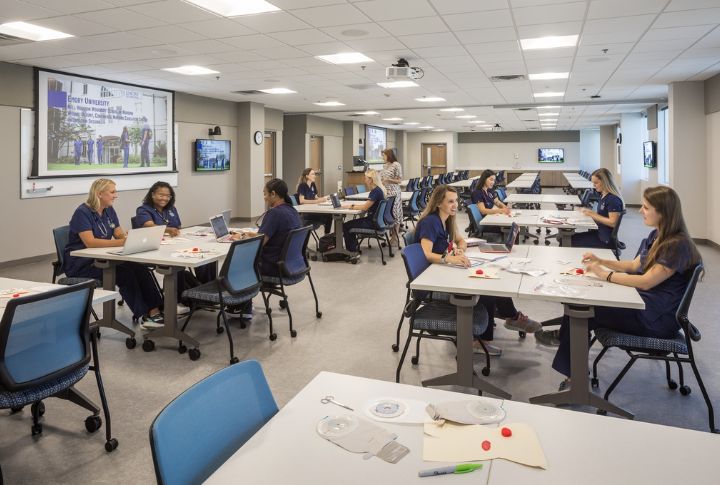
Georgia: Emory University Nell Hodgson Woodruff School of Nursing
In Atlanta, Emory’s Nell Hodgson Woodruff School of Nursing is a top-notch institution for nursing education. The school is recognized for its commitment to addressing health disparities and promoting patient-centered care. Students can engage in clinical practice and research in a city with some of the nation’s leading healthcare facilities.
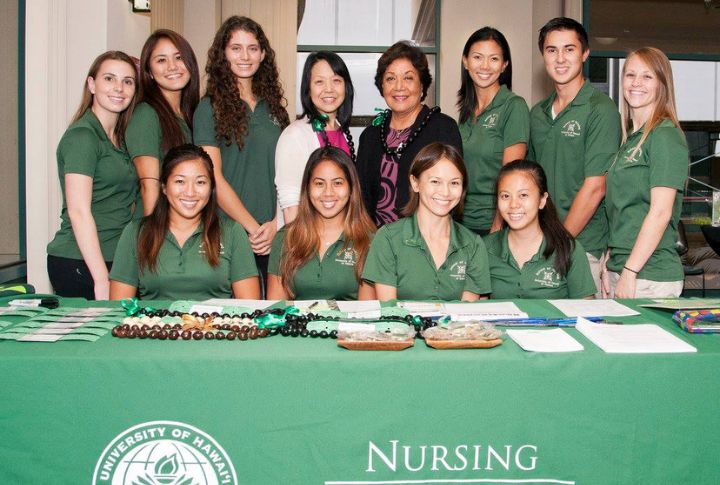
Hawaii: University of Hawaii at Manoa School of Nursing and Dental Hygiene
University of Hawaii’s School of Nursing and Dental Hygiene at Manoa gives students a unique perspective on health care in diverse and multicultural communities. All its programs, from the undergraduate to doctoral level, thrive on the integration of traditional and holistic health practices.
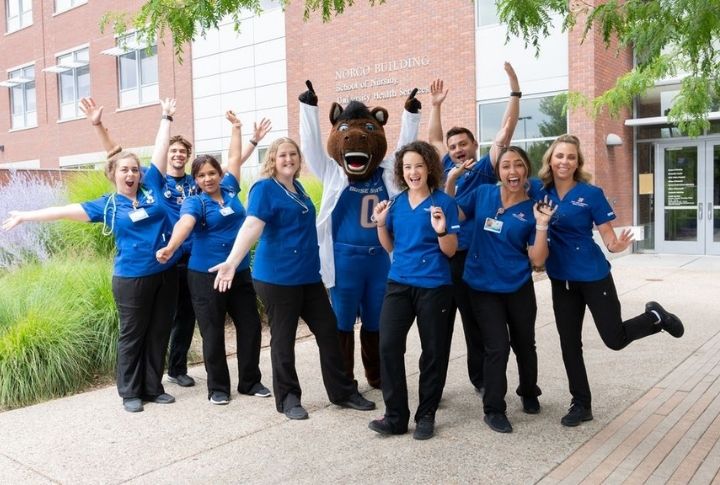
Idaho: Boise State University School of Nursing
Boise State University’s School of Nursing addresses the rising need for proficient nursing practitioners. Prioritizing innovative healthcare approaches, leadership, and patient-focused services, the school blends clinical training, research, and community involvement. Students gain distinct clinical exposure through extensive collaborations with healthcare entities statewide, particularly in rural areas.

Illinois: Chicago College of Nursing, University of Illinois
The College of Nursing at the University of Illinois at Chicago excels in research and teaching. Offering various programs from essential to advanced degrees, it addresses urban health issues like unequal health and long-term sickness. Students gain valuable experience in the city environment, preparing them for various healthcare roles.

Indiana: Purdue University-Main Campus, West Lafayette
Purdue University’s School of Nursing in West Lafayette’s BSN, MSN, and DNP programs optimize science and evidence-based practice. Known for its research in rural health, chronic disease management, and health promotion, it equips students with critical thinking skills and clinical expertise. Nursing students benefit from high-tech labs and varied clinical experiences statewide.

Iowa: Mount Mercy University, Cedar Rapids
Mount Mercy University in Cedar Rapids provides CCNE-accredited nursing programs, with options for new nurses and R.N.s pursuing career advancement. Acclaimed for holistic patient care, leadership, and community health focus, small class sizes ensure individualized attention. Ethical practice and compassionate service are core, supported by robust clinical partnerships that deliver diverse healthcare experiences.

Kansas: Baker University, Baldwin City
Baker University in Baldwin City offers BSN degrees through a nursing program with traditional and accelerated options. It highlights clinical proficiency, patient advocacy, leadership, and lifelong learning and integrates liberal arts, critical thinking, and faith into nursing practice. Clinical experiences across healthcare settings prepare students thoroughly for the nursing profession.
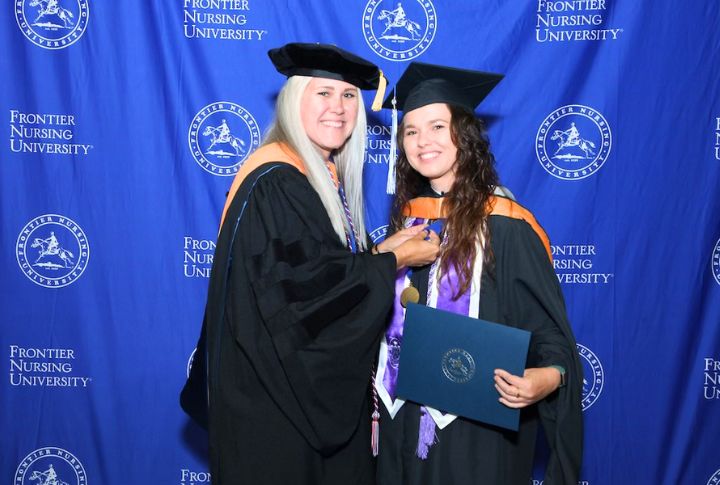
Kentucky: Frontier Nursing University, Versailles
Versailles’ Frontier Nursing University is a trailblazer in graduate nursing education, focusing on midwifery and family nursing. Specializing in MSN and DNP programs through distance learning, it trains nurse-midwives and family nurse practitioners for rural care. Combining online classes with local clinical placements, FNU revolutionizes nursing education.
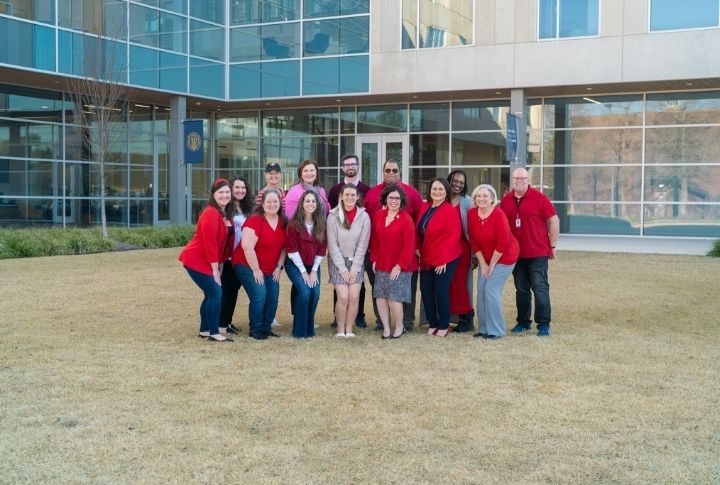
Louisiana: Franciscan Missionaries of Our Lady University, Baton Rouge
Franciscan Missionaries of Our Lady University deliver nursing education (ASN, BSN, MSN, DNP) rooted in Franciscan values – service, compassion, and respect. Its programs focus on holistic care, ethical leadership, and social justice. Students gain practical experience in the affiliated health system, readying them for varied nursing and leadership positions.
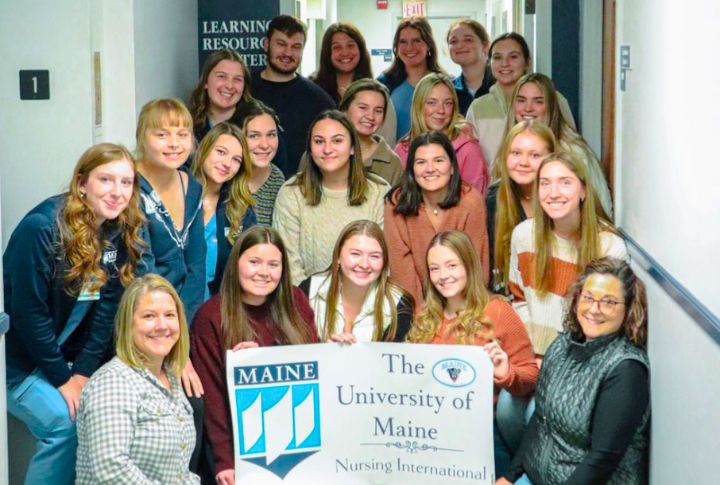
Maine: University of Maine School of Nursing
The School of Nursing at the University of Maine in Orono prepares students for the complexities of modern health care through BSN, MSN, and DNP programs. It has a supportive learning environment with access to cutting-edge simulation labs and clinical experiences in multiple settings across the state.

Maryland: Johns Hopkins School of Nursing
Based in Baltimore, Johns Hopkins School of Nursing excels globally in nursing education, research, and practice. Its BSN, MSN, DNP, and PhD programs advocate innovation and global health improvement. Focused on evidence-based and interprofessional education, it prepares students to lead and tackle complex health issues.

Massachusetts: Boston College, William F. Connell School of Nursing, Chestnut Hill
The educational programs at Boston College’s Connell School of Nursing in Chestnut Hill merge clinical practice with ethics and leadership in nursing. Its emphasis on holistic care in the Jesuit tradition, access to advanced simulation labs, and clinical experiences in Boston’s top health institutions prepare students for complex health challenges.

Michigan: University of Michigan School of Nursing
The University of Michigan School of Nursing in Ann Arbor delivers BSN to PhD programs, focusing on health promotion, chronic condition management, and health care technology. Supported by top-notch facilities and extensive clinical partnerships throughout Michigan, it’s a game-changer for students wanting to take on industry leadership roles.

Minnesota: St. Catherine University, St. Paul
St. Catherine University in St. Paul’s BSN, MSN, and DNP degrees focus on women’s health, ethical leadership, and social justice in health care. Integrating liberal arts with professional studies, the university fosters compassionate, skilled nurses. Students gain extensive clinical experiences through partnerships with Twin Cities’ top health organizations.

Mississippi: University of Mississippi Medical Center School of Nursing
The School of Nursing at the University of Mississippi Medical Center in Jackson has a range of programs on primary care, health disparities, and rural health. As part of Mississippi’s only academic health science center, the school provides students with extensive clinical training opportunities in competitive settings.

Missouri: Saint Louis University, School of Nursing
Saint Louis University’s School of Nursing in St. Louis is celebrated for prioritizing educational innovation, research, and community service. Emphasizing evidence-based practice, health technology, and interprofessional education, SLU prepares leaders to enhance health care and patient outcomes, supported by a leading simulation center and clinical alliances.

Montana: Montana State University College of Nursing
Montana State University’s College of Nursing, with its main campus in Bozeman, offers BSN, MSN, and DNP programs. It is distinguished for addressing rural and frontier communities’ healthcare needs and stresses primary care, mental health, and community health. The college’s multiple campuses across the state facilitate access to nursing education

Nebraska: Bryan College of Health Sciences, School of Nursing, Lincoln
With its BSN and MSN programs, Bryan College of Health Sciences in Lincoln is known for its hands-on learning approach, small class sizes, and individualized student support. Its nursing programs emphasize critical thinking, patient-centered care, and community health. Their high-tech simulation labs ensure the graduates are well-prepared for professional nursing practice.

Nevada: University of Nevada, Las Vegas School of Nursing
The School of Nursing at the University of Nevada, Las Vegas, with its BSN, MSN, and DNP programs, stands out for its focus on community health, nursing education, and managing chronic conditions. UNLV’s nursing school is committed to advancing healthcare through cutting-edge research.

New Hampshire: University of New Hampshire Department of Nursing
The University of New Hampshire in Durham boasts a CCNE-accredited BSN program, an MSN program focused on clinical nurse leaders, and a Direct Entry Master’s in Nursing for non-nurses. UNH supports students through innovative teaching and extensive clinical experiences in New England’s contrasting healthcare settings.

New Jersey: Rutgers, The State University of New Jersey School of Nursing
Rutgers School of Nursing, spanning Newark, New Brunswick, and Blackwood, presents BSN, MSN, DNP, and PhD programs. It excels in urban health and health disparities research, preparing students for nursing leadership and health policy roles. Strategic clinical partnerships in New Jersey ensure varied practice experiences.

New Mexico: University of New Mexico College of Nursing
The University of New Mexico College of Nursing in Albuquerque, spanning BSN to DNP and PhD, emphasizes rural health, health disparities, and Native American health. It melds traditional and modern educational approaches and excels in training nurses for New Mexico’s varied urban and rural communities.
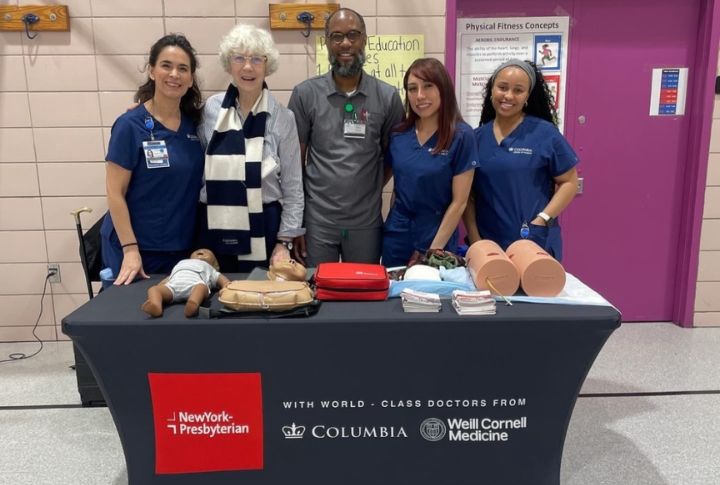
New York: Columbia University School of Nursing, New York
Columbia University’s School of Nursing in New York City leads in innovative education and research, focusing on global health challenges, health equity, and enhanced healthcare access. It provides comprehensive clinical training across advanced nursing fields in New York’s top hospitals, equipping students for excellence in diverse healthcare environments.
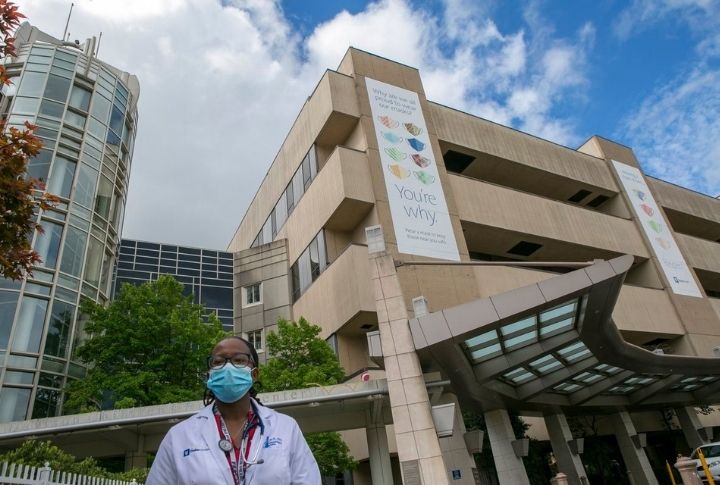
North Carolina: Duke University School of Nursing, Durham
Duke University School of Nursing in Durham, North Carolina, excels globally in nursing education, research, and practice. Its ABSN, MSN, DNP, and PhD programs include an innovative curriculum, advanced facilities, and robust clinical partnerships. Focusing on leadership, global health, and evidence-based practice, Duke prioritizes diversity and inclusion.
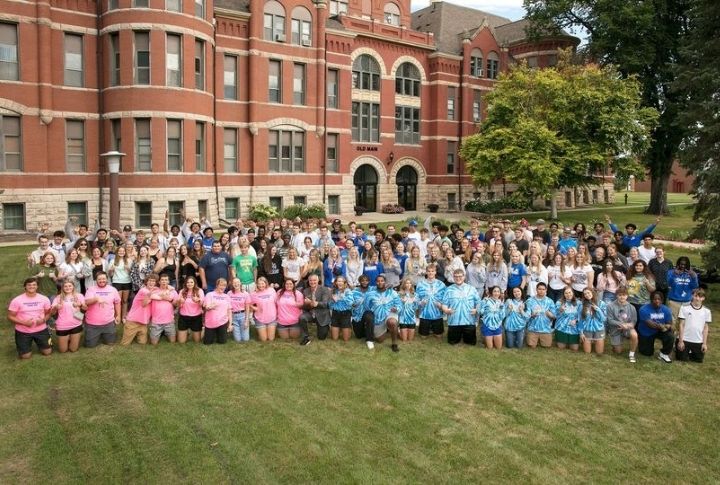
North Dakota: Mayville State University
Mayville State University, located in North Dakota, provides an online BSN completion program for R.N.s with an associate degree or nursing diploma. The program enhances clinical, management, and leadership skills through personalized education. It fosters nurses for advanced healthcare roles by presenting flexible options for working professionals.

Ohio: Ohio State University College of Nursing
Ohio State University College of Nursing in Columbus excels in nursing education, providing BSN to DNP and PhD programs. It leads to health promotion, chronic disease, and evidence-based research. Focused on wellness and prevention, OSU equips graduates for leadership in healthcare, academia, and research sectors.

Oklahoma: Northeastern State University, Tahlequah
Northeastern State University in Tahlequah, Oklahoma, provides a BSN program focusing on science, critical thinking, and clinical skills. With an emphasis on cultural competence, community health, and patient-centered care, NSU prepares nurses for diverse populations. Its program includes extensive clinical experiences, ensuring graduates’ readiness for practice.

Oregon: Bushnell University
Bushnell University in Eugene, Oregon, delivers a BSN program that molds compassionate and skilled nurses, emphasizing holistic care, ethics, and leadership. Grounded in Christian values, it merges faith with healthcare, promoting spiritually and culturally sensitive care. The curriculum, rich in clinical experiences, prepares graduates to serve patients and communities empathetically.
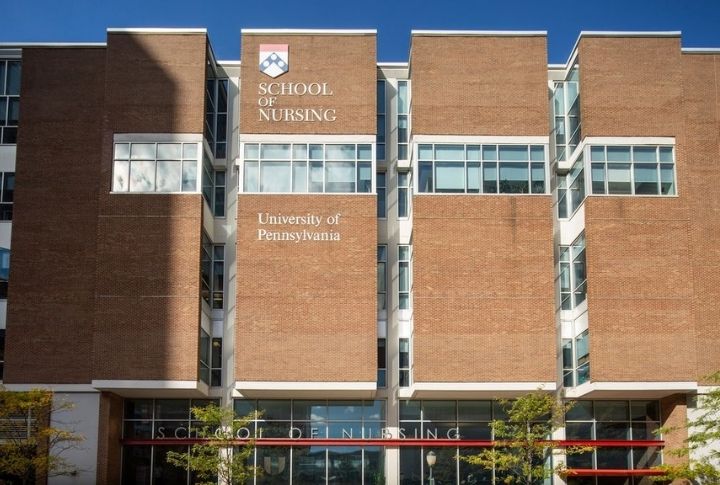
Pennsylvania: University of Pennsylvania School of Nursing
The University of Pennsylvania School of Nursing, an Ivy League institution in Philadelphia, provides extensive nursing programs from BSN to PhD. Renowned for leadership in education, research, and practice, it specializes in pediatrics, women’s health, and gerontology. Penn Nursing’s focus on innovation and interprofessional education prepares students for healthcare reform leadership.

Rhode Island: University of Rhode Island College of Nursing, Kingston
Students at the University of Rhode Island College of Nursing in Kingston can pursue BSN to PhD degrees, focusing on gerontology, community health, and health disparities. The program offers a rich mix of evidence-based practice, patient-centered care, and interprofessional collaboration, with varying clinical experiences in Rhode Island and beyond.
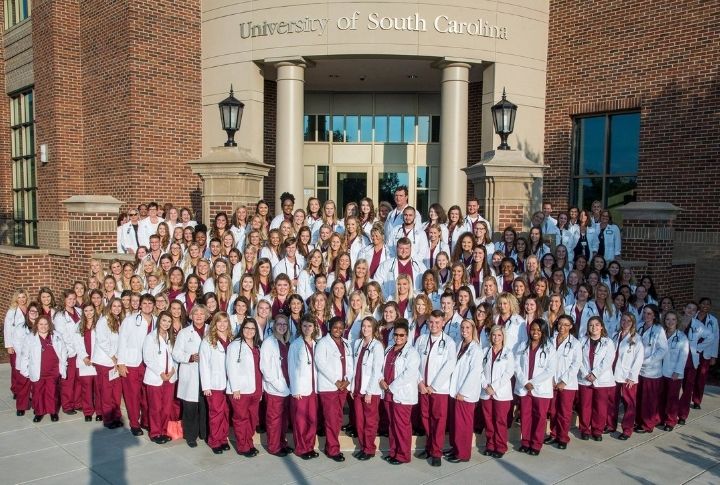
South Carolina: University of South Carolina College of Nursing, Columbia
The University of South Carolina College of Nursing in Columbia provides BSN to PhD programs, emphasizing research, leadership, and evidence-based practice. With advanced simulation labs and wide-ranging clinical experiences, the college aims to address South Carolina’s healthcare challenges, focusing on rural health, health disparities, and chronic illness management.

South Dakota: Mount Marty University Nursing Program, Yankton
Mount Marty University in Yankton offers a BSN program prioritizing compassionate care, ethical practice, and leadership. Integrating liberal arts with nursing ensures small class sizes for a personalized education that fosters critical thinking and clinical skills, preparing graduates to serve with faith and commitment, especially in the Midwest.

Tennessee: Vanderbilt University School of Nursing
Vanderbilt University School of Nursing in Nashville provides MSN, DNP, and PhD programs, focusing on advanced nursing practice, healthcare leadership, and research. Renowned for innovative education and research, it equips students for leadership in healthcare, academia, and policy, offering extensive clinical experience through Vanderbilt University Medical Center.

Texas: University of Texas at Austin School of Nursing
The University of Texas at Austin School of Nursing provides BSN, MSN, and PhD programs centered on healthcare leadership, innovation, and evidence-based practice. Noted for its psychiatric, pediatric, and chronic illness management research, UT Austin trains graduates for advanced healthcare leadership roles, ensuring improved outcomes for diverse communities.

Utah: Brigham Young University College of Nursing, Provo
This Nursing College is known in Provo for integrating spiritual care with nursing excellence. Its BSN program and graduate certificates are designed to nurture skilled and compassionate nurses. Emphasizing the Healer’s art of holistic care, the curriculum includes disparate clinical experiences in Utah and elsewhere.

Vermont: Norwich University School of Nursing, Northfield
Norwich University’s BSN program in Northfield focuses on molding leaders in nursing and healthcare by enhancing critical thinking, communication, and clinical skills for ethical practice. With a commitment to service and innovation, its rigorous curriculum with extensive clinical experiences targets rural and underserved communities in Vermont.
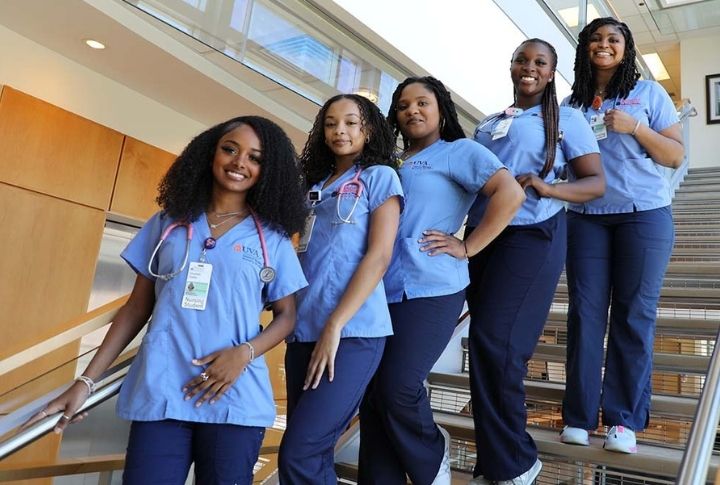
Virginia: University of Virginia School of Nursing
The University of Virginia School of Nursing in Charlottesville provides BSN through PhD programs, recognized for clinical excellence, leadership, and research, focusing on health equity and reducing disparities. Students experience a challenging academic setting and gain extensive clinical exposure at the UVA Medical Center, a premier academic institution.
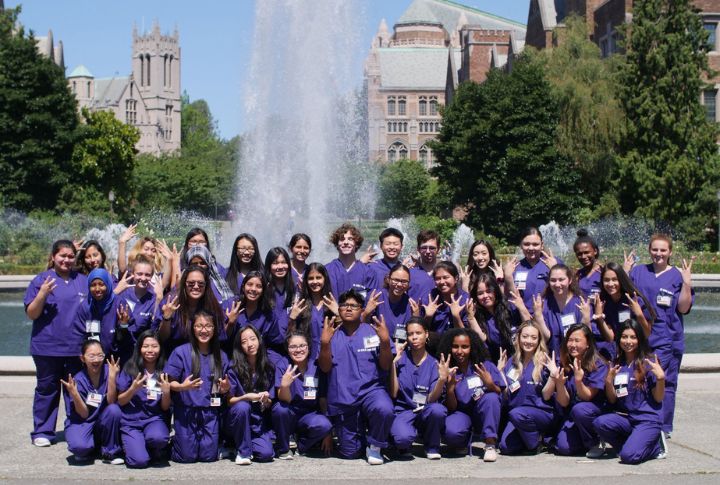
Washington: University of Washington School of Nursing
The University of Washington School of Nursing in Seattle excels in nursing education, research, and practice with BSN, MSN, DNP, and PhD programs. It stands out in public health, community health, and health informatics, fostering innovation and excellence. Graduates are equipped to enhance healthcare systems and patient outcomes worldwide.
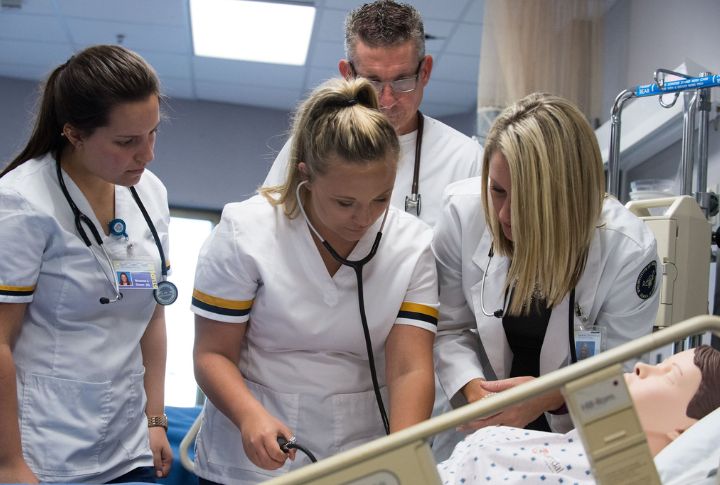
West Virginia: West Virginia University School of Nursing
West Virginia University School of Nursing, located in Morgantown, Charleston, and Beckley, provides BSN, MSN, and DNP programs, emphasizing rural health, chronic disease, and family health. It aims to equip students with practical experience and research and enhance healthcare access to tackle health challenges in West Virginia and similar areas.

Wisconsin: Marquette University College of Nursing, Milwaukee
Marquette University’s Nursing College in Milwaukee has BSN to PhD programs that uphold innovation, clinical excellence, and social justice. It prepares nurses for health equity advocacy, blending rigorous academics with practical experience, supported by top simulation labs and partnerships for comprehensive practicums and research in healthcare.

Wyoming: University of Wyoming Fay W. Whitney School of Nursing
With its BSN, MSN, and DNP programs, the University of Wyoming Fay W. Whitney focuses on rural and frontier health care, including primary care, mental health, and community health. Its curriculum addresses Wyoming’s unique health needs, preparing graduates for impactful roles in rural communities.
The post Best Nursing Schools: State-by-State Guide 2024 appeared first on Housely .
More for You
Putin orders 150,000 conscripts into military service
Here Are 6 Things White People Say That Highlight Their Privilege And OMG I Hear These Allllll The Time
25 legendary musicians you might not know were LGBTQ+
10 Affordable Family Cars That Will Last 300,000 Miles and Save You Money
Steal the show: TV supporting characters who took the lead
Everything we know about the potential discovery Amelia Earhart’s long-lost plane
Giancarlo Esposito Is Spellbinding in New Crime Drama ‘Parish’
Michael Jordan didn't hold back when talking about his retirement in 1998: "I won't have a problem walking away"
The Best 28 Red Carpet Moments of the '70s
Big shipping company files for Chapter 11 bankruptcy
‘Harlem' Renewed For Season 3 At Prime Video; New Cast Revealed
Job postings can reveal signs of trouble ahead with a potential employer or role. Here are the red flags to look out for.
The 10 Best Ariana Grande Songs of All Time
Government approves $1.5 billion project that will power 2 million homes: '[It] would create thousands of new jobs'
Heart of the City by Steenz
How to Fix Too Many Background Processes Running on a Windows PC
Renewed and Canceled TV Shows 2024 Guide
“The Walking Dead: The Ones Who Live” finale ending explained
LA Times updates controversial column after claims of blatant sexism by LSU's Kim Mulkey
The best pop songs of the modern era, based on Billboard data
Exceptional nursing careers begin with access to growing health systems
The profession of nursing – and the ways aspiring nurses are prepared for their careers – will see profound change over the next few years. By 2030, the profession of nursing will look very different , as will the landscape of health care. At every level, leadership is needed to provide clear, strategic and sustained direction and to ensure health equity is a priority. And technology continues to take on an ever-more important role.
At Thomas Jefferson University College of Nursing , the challenges presented by the changing health care landscape are inspiring unique opportunities to transform nursing education.
With over 130 years of educating nurses, Jefferson College of Nursing is a model for graduating nurses who provide exceptional patient care that drives high-quality outcomes. Jefferson-educated nurses serve as health care innovators, leading from day one.
A forward-looking approach to health care
The College’s Dixon campus is an example of a forward-looking approach to health care. Located in Philadelphia’s northern suburbs in Horsham, PA, near the Pennsylvania Turnpike, the facility provides easier access for students from that area who might find it difficult to reach the College’s Center City Campus .
The Dixon Campus accommodates several hundred nursing students and offers small class sizes, free parking, and access to public transportation hubs. Notably, clinical rotations include the growing Jefferson Health system. In 2020, thanks to Edith R. Dixon, the campus made its new home in this 42,000-square-foot high-tech complex named for its chief benefactor.
Multiple scholarship opportunities are available
In addition to providing more convenient physical access to nursing education through its suburban Dixon campus, Jefferson College of Nursing offers a wide range of scholarship opportunities for prospective students, including the Raynier Scholarship for up to $5,000 per year and the Diversity in Education & Nursing Excellence Scholarship for up to $15,000 per year.
Three BSN program options to balance school-life schedules
To accommodate career goals while balancing the complexities of school-life schedules, students have three Bachelor of Science in Nursing (BSN) program options, including a traditional BSN targeted toward students pursuing their first baccalaureate degree and an accelerated option for second-degree students. The accelerated option is offered on a one-year or two-year pathway. The starting salary range for BSN graduates is $62,000 to $86,000.
Thomas Jefferson University BSN students have opportunities to gain health care experience while immersed in the BSN through externships with our partner health system, Jefferson Health. Upon graduation, Jefferson graduates can avail themselves of an early-hire program with one of the largest health systems in the Philadelphia region, Jefferson Health. The Jefferson Health nurse community is 9,600 strong with full-time and part-time nursing employees.
Experience clinical technologies of tomorrow
At the Jefferson College of Nursing, technology isn’t just used as part of nursing student education; it is fully integrated. Technology is driving everything – from academics to patient engagement and everything in between.
In 2021, Jefferson was the first college of nursing in the state of Pennsylvania to become an Apple Distinguished School . Apple Distinguished Schools use technology at the highest levels, preparing learners to excel in sophisticated technological environments. The College incorporated Apple technologies into all classrooms and simulation rooms so students can get firsthand experience with the clinical tech of tomorrow.
The Raynier Institute & Foundation Center for Advanced Education, Simulation, & Innovation Center
Jefferson College of Nursing’s Dixon campus features the large-scale, state-of-the-art Raynier Institute & Foundation Center for Advanced Education, Simulation, & Innovation Center, where students engage in complex clinical scenarios that parallel, anticipate and amplify real-life situations at the next level. This Center enables expert simulation faculty to create engaging and realistic experiences that accentuate what students learn in the classroom and are exemplars of the curriculum.
Applying the latest technology to transform the educational process
Virtual reality and 3D printing simulate specific nurse experiences in the field in a safe and secure learning environment. Artificial intelligence is used so nursing education remains dynamic throughout a student’s academic career at the College.
While other learning institutions use virtual reality simulation, the College’s Dixon campus uses the technology as a bridge to competency-based learning. Students can hone their clinical skills by first interacting with patients and health care scenarios in a virtual reality environment and then in our simulation center before moving into the real-world clinical environment. Virtual reality also enables nursing students to safely experience today’s growing health care issues, including workplace violence.
In keeping with Jefferson College of Nursing’s commitment to applying the latest technology to transform the educational process, the Dixon campus is equipped with state-of-the-art 3D printers that produce a wide range of sophisticated learning tools used to practice invasive skills in the safe environment of a lab. 3D technology creates simulated body parts and other materials that make the learning experience more realistic.
Practice clinical skills through a capstone program in Italy
The Jefferson College of Nursing offers students an innovative opportunity to be part of improving education and health care on a global scale through a four-week undergraduate clinical capstone program in Italy .
Students work with the staff of Fondazione Policlinico Universitario Agostino Gemelli Hospital/Università Cattolica del Sacro Cuore . This initiative is a regular offering for undergraduate students, functioning as a bridge between the end of school and the beginning of a career. It allows nursing students to put what they've learned into practice. There is no better way to offer experiential learning than to immerse students in an environment that challenges their thinking and enhances their nursing skills. This year, nurse practitioner students can engage in this global experience.
Graduates prepared for what the real world demands
The difference at the Thomas Jefferson University College of Nursing is that students don’t just leave school with a great education. They graduate prepared for what the real world will demand of them. And for making a real difference in the communities they will serve.

March 26, 2024

More than half (11 of 19) of parents who participated in a focus group expressed that they believed using e-cigarettes near their children posed little or no health risk.
— Getty Images
In homes across America, an invisible threat may be lurking — one that could affect the health of our youngest and most vulnerable. Recent findings presented this month at the National Association of Pediatric Nurse Practitioners conference in Denver shed light on the often-overlooked danger of secondhand e-cigarette vapor, particularly its impact on children.
For years, electronic cigarettes have been marketed as a safer alternative to traditional smoking. But as these devices gain popularity among adults, there is growing concern over the unintended consequences for children exposed to the exhaled vapors. A new study by researchers at Emory University’s Nell Hodgson Woodruff School of Nursing and Rollins School of Public Health shows that children living in households where e-cigarettes are used are unintentionally inhaling substances that could harm their developing bodies.
The study implemented a unique approach to data collection that combined the traditional use of blood tests with less invasive saliva and exhaled breath tests to determine the exposure of children to hazardous substances. The results were telling: Children aged 4-12 years who were exposed to secondhand e-cigarette vapor showed significantly higher levels of metabolites linked to chemicals found in e-cigarette liquids compared to their unexposed peers.
These metabolites interfere with the body’s normal operations by disrupting dopamine levels and causing inflammation and oxidative stress. Oxidative stress leads to cellular damage throughout the body and is linked to numerous diseases, including diabetes, heart disease and cancer.
“Many people who smoke have switched to using e-cigarettes, thinking it’s safer for them and others nearby,” says Jeannie Rodriguez, PdD, RN, associate professor at Emory’s School of Nursing and lead author of the study. “However, there are chemicals in the liquids used in a vape that are hazardous for you and those that you care about who are exposed to the vapors you exhale.”
The outcomes of the analyses were shared with parents to highlight the risks linked to exposing children to the byproducts of e-cigarette vapor.
Surprisingly, many parents were unaware of the risks. In focus group discussions with Emory researchers, more than half (11 of 19) of parents revealed they considered vaping around their children a minor concern, if a concern at all. This alarming disconnect underscores the need for education on the subject.
Health experts like Rodriguez stress the importance of equipping parents with the knowledge to make informed decisions. By understanding the tangible evidence of harm, parents might be more inclined to put down their vaping devices for good.
However, quitting is not straightforward. The study also unveiled that despite understanding some risks, the addictive grip of nicotine and the belief that vaping is less harmful than traditional smoking complicate parents’ decision to stop. This highlights the nuanced challenges in combatting the vaping epidemic and the critical role health care professionals play in guiding families toward healthier choices.
“If you do vape and are ready to quit, talk to your health care provider and your family and friends,” says Rodriguez. “You may need the support of those around you to be successful. Think of past attempts to quit not as failures, but as training opportunities for you to eventually successfully quit. Don’t give up.”
As vaping continues to cast a shadow over public health, especially among the youth, the findings from this study are clear: While the vapor from electronic cigarettes may be invisible after it disperses through the air, the effects on children are not.
Coauthors of the study include Jeannie Rodriguez , PdD, RN, and Irene Yang , PdD, RN, of Emory’s Nell Hodgson Woodruff School of Nursing and Donghai Liang , PhD, of Emory’s Rollins School of Public Health.
- Health Sciences Research
- School of Nursing
- Woodruff Health Sciences Center
- School of Public Health
- Global Health
- News Releases
Recent News
Download emory news photo.
By downloading Emory news media, you agree to the following terms of use:
Creative Commons Attribution-NoDerivatives 4.0 International Public License
By exercising the Licensed Rights (defined below), You accept and agree to be bound by the terms and conditions of this Creative Commons Attribution-NoDerivatives 4.0 International Public License ("Public License"). To the extent this Public License may be interpreted as a contract, You are granted the Licensed Rights in consideration of Your acceptance of these terms and conditions, and the Licensor grants You such rights in consideration of benefits the Licensor receives from making the Licensed Material available under these terms and conditions.
Section 1 – Definitions.
- Adapted Material means material subject to Copyright and Similar Rights that is derived from or based upon the Licensed Material and in which the Licensed Material is translated, altered, arranged, transformed, or otherwise modified in a manner requiring permission under the Copyright and Similar Rights held by the Licensor. For purposes of this Public License, where the Licensed Material is a musical work, performance, or sound recording, Adapted Material is always produced where the Licensed Material is synched in timed relation with a moving image.
- Copyright and Similar Rights means copyright and/or similar rights closely related to copyright including, without limitation, performance, broadcast, sound recording, and Sui Generis Database Rights, without regard to how the rights are labeled or categorized. For purposes of this Public License, the rights specified in Section 2(b)(1)-(2) are not Copyright and Similar Rights.
- Effective Technological Measures means those measures that, in the absence of proper authority, may not be circumvented under laws fulfilling obligations under Article 11 of the WIPO Copyright Treaty adopted on December 20, 1996, and/or similar international agreements.
- Exceptions and Limitations means fair use, fair dealing, and/or any other exception or limitation to Copyright and Similar Rights that applies to Your use of the Licensed Material.
- Licensed Material means the artistic or literary work, database, or other material to which the Licensor applied this Public License.
- Licensed Rights means the rights granted to You subject to the terms and conditions of this Public License, which are limited to all Copyright and Similar Rights that apply to Your use of the Licensed Material and that the Licensor has authority to license.
- Licensor means the individual(s) or entity(ies) granting rights under this Public License.
- Share means to provide material to the public by any means or process that requires permission under the Licensed Rights, such as reproduction, public display, public performance, distribution, dissemination, communication, or importation, and to make material available to the public including in ways that members of the public may access the material from a place and at a time individually chosen by them.
- Sui Generis Database Rights means rights other than copyright resulting from Directive 96/9/EC of the European Parliament and of the Council of 11 March 1996 on the legal protection of databases, as amended and/or succeeded, as well as other essentially equivalent rights anywhere in the world.
- You means the individual or entity exercising the Licensed Rights under this Public License. Your has a corresponding meaning.
Section 2 – Scope.
- reproduce and Share the Licensed Material, in whole or in part; and
- produce and reproduce, but not Share, Adapted Material.
- Exceptions and Limitations . For the avoidance of doubt, where Exceptions and Limitations apply to Your use, this Public License does not apply, and You do not need to comply with its terms and conditions.
- Term . The term of this Public License is specified in Section 6(a) .
- Media and formats; technical modifications allowed . The Licensor authorizes You to exercise the Licensed Rights in all media and formats whether now known or hereafter created, and to make technical modifications necessary to do so. The Licensor waives and/or agrees not to assert any right or authority to forbid You from making technical modifications necessary to exercise the Licensed Rights, including technical modifications necessary to circumvent Effective Technological Measures. For purposes of this Public License, simply making modifications authorized by this Section 2(a)(4) never produces Adapted Material.
- Offer from the Licensor – Licensed Material . Every recipient of the Licensed Material automatically receives an offer from the Licensor to exercise the Licensed Rights under the terms and conditions of this Public License.
- No downstream restrictions . You may not offer or impose any additional or different terms or conditions on, or apply any Effective Technological Measures to, the Licensed Material if doing so restricts exercise of the Licensed Rights by any recipient of the Licensed Material.
- No endorsement . Nothing in this Public License constitutes or may be construed as permission to assert or imply that You are, or that Your use of the Licensed Material is, connected with, or sponsored, endorsed, or granted official status by, the Licensor or others designated to receive attribution as provided in Section 3(a)(1)(A)(i) .
Other rights .
- Moral rights, such as the right of integrity, are not licensed under this Public License, nor are publicity, privacy, and/or other similar personality rights; however, to the extent possible, the Licensor waives and/or agrees not to assert any such rights held by the Licensor to the limited extent necessary to allow You to exercise the Licensed Rights, but not otherwise.
- Patent and trademark rights are not licensed under this Public License.
- To the extent possible, the Licensor waives any right to collect royalties from You for the exercise of the Licensed Rights, whether directly or through a collecting society under any voluntary or waivable statutory or compulsory licensing scheme. In all other cases the Licensor expressly reserves any right to collect such royalties.
Section 3 – License Conditions.
Your exercise of the Licensed Rights is expressly made subject to the following conditions.
Attribution .
If You Share the Licensed Material, You must:
- identification of the creator(s) of the Licensed Material and any others designated to receive attribution, in any reasonable manner requested by the Licensor (including by pseudonym if designated);
- a copyright notice;
- a notice that refers to this Public License;
- a notice that refers to the disclaimer of warranties;
- a URI or hyperlink to the Licensed Material to the extent reasonably practicable;
- indicate if You modified the Licensed Material and retain an indication of any previous modifications; and
- indicate the Licensed Material is licensed under this Public License, and include the text of, or the URI or hyperlink to, this Public License.
- You may satisfy the conditions in Section 3(a)(1) in any reasonable manner based on the medium, means, and context in which You Share the Licensed Material. For example, it may be reasonable to satisfy the conditions by providing a URI or hyperlink to a resource that includes the required information.
- If requested by the Licensor, You must remove any of the information required by Section 3(a)(1)(A) to the extent reasonably practicable.
Section 4 – Sui Generis Database Rights.
Where the Licensed Rights include Sui Generis Database Rights that apply to Your use of the Licensed Material:
- for the avoidance of doubt, Section 2(a)(1) grants You the right to extract, reuse, reproduce, and Share all or a substantial portion of the contents of the database, provided You do not Share Adapted Material;
- if You include all or a substantial portion of the database contents in a database in which You have Sui Generis Database Rights, then the database in which You have Sui Generis Database Rights (but not its individual contents) is Adapted Material; and
- You must comply with the conditions in Section 3(a) if You Share all or a substantial portion of the contents of the database.
Section 5 – Disclaimer of Warranties and Limitation of Liability.
- Unless otherwise separately undertaken by the Licensor, to the extent possible, the Licensor offers the Licensed Material as-is and as-available, and makes no representations or warranties of any kind concerning the Licensed Material, whether express, implied, statutory, or other. This includes, without limitation, warranties of title, merchantability, fitness for a particular purpose, non-infringement, absence of latent or other defects, accuracy, or the presence or absence of errors, whether or not known or discoverable. Where disclaimers of warranties are not allowed in full or in part, this disclaimer may not apply to You.
- To the extent possible, in no event will the Licensor be liable to You on any legal theory (including, without limitation, negligence) or otherwise for any direct, special, indirect, incidental, consequential, punitive, exemplary, or other losses, costs, expenses, or damages arising out of this Public License or use of the Licensed Material, even if the Licensor has been advised of the possibility of such losses, costs, expenses, or damages. Where a limitation of liability is not allowed in full or in part, this limitation may not apply to You.
- The disclaimer of warranties and limitation of liability provided above shall be interpreted in a manner that, to the extent possible, most closely approximates an absolute disclaimer and waiver of all liability.
Section 6 – Term and Termination.
- This Public License applies for the term of the Copyright and Similar Rights licensed here. However, if You fail to comply with this Public License, then Your rights under this Public License terminate automatically.
Where Your right to use the Licensed Material has terminated under Section 6(a) , it reinstates:
- automatically as of the date the violation is cured, provided it is cured within 30 days of Your discovery of the violation; or
- upon express reinstatement by the Licensor.
- For the avoidance of doubt, the Licensor may also offer the Licensed Material under separate terms or conditions or stop distributing the Licensed Material at any time; however, doing so will not terminate this Public License.
- Sections 1 , 5 , 6 , 7 , and 8 survive termination of this Public License.
Section 7 – Other Terms and Conditions.
- The Licensor shall not be bound by any additional or different terms or conditions communicated by You unless expressly agreed.
- Any arrangements, understandings, or agreements regarding the Licensed Material not stated herein are separate from and independent of the terms and conditions of this Public License.
Section 8 – Interpretation.
- For the avoidance of doubt, this Public License does not, and shall not be interpreted to, reduce, limit, restrict, or impose conditions on any use of the Licensed Material that could lawfully be made without permission under this Public License.
- To the extent possible, if any provision of this Public License is deemed unenforceable, it shall be automatically reformed to the minimum extent necessary to make it enforceable. If the provision cannot be reformed, it shall be severed from this Public License without affecting the enforceability of the remaining terms and conditions.
- No term or condition of this Public License will be waived and no failure to comply consented to unless expressly agreed to by the Licensor.
- Nothing in this Public License constitutes or may be interpreted as a limitation upon, or waiver of, any privileges and immunities that apply to the Licensor or You, including from the legal processes of any jurisdiction or authority.
Creative Commons is not a party to its public licenses. Notwithstanding, Creative Commons may elect to apply one of its public licenses to material it publishes and in those instances will be considered the “Licensor.” The text of the Creative Commons public licenses is dedicated to the public domain under the CC0 Public Domain Dedication . Except for the limited purpose of indicating that material is shared under a Creative Commons public license or as otherwise permitted by the Creative Commons policies published at creativecommons.org/policies , Creative Commons does not authorize the use of the trademark “Creative Commons” or any other trademark or logo of Creative Commons without its prior written consent including, without limitation, in connection with any unauthorized modifications to any of its public licenses or any other arrangements, understandings, or agreements concerning use of licensed material. For the avoidance of doubt, this paragraph does not form part of the public licenses.
- Share full article
Advertisement
Supported by
Guest Essay
Elite College Admissions Have Turned Students Into Brands

By Sarah Bernstein
Ms. Bernstein is a playwright, a writing coach and an essayist in Brooklyn.
“I just can’t think of anything,” my student said.
After 10 years of teaching college essay writing, I was familiar with this reply. For some reason, when you’re asked to recount an important experience from your life, it is common to forget everything that has ever happened to you. It’s a long-form version of the anxiety that takes hold at a corporate retreat when you’re invited to say “one interesting thing about yourself,” and you suddenly believe that you are the most boring person in the entire world. Once during a version of this icebreaker, a man volunteered that he had only one kidney, and I remember feeling incredibly jealous of him.
I tried to jog this student’s memory. What about his love of music? Or his experience learning English? Or that time on a summer camping trip when he and his friends had nearly drowned? “I don’t know,” he sighed. “That all seems kind of cliché.”
Applying to college has always been about standing out. When I teach college essay workshops and coach applicants one on one, I see my role as helping students to capture their voice and their way of processing the world, things that are, by definition, unique to each individual. Still, many of my students (and their parents) worry that as getting into college becomes increasingly competitive, this won’t be enough to set them apart.
Their anxiety is understandable. On Thursday, in a tradition known as “Ivy Day,” all eight Ivy League schools released their regular admission decisions. Top colleges often issue statements about how impressive (and competitive) their applicant pools were this cycle. The intention is to flatter accepted students and assuage rejected ones, but for those who have not yet applied to college, these statements reinforce the fear that there is an ever-expanding cohort of applicants with straight A’s and perfect SATs and harrowing camping trip stories all competing with one another for a vanishingly small number of spots.
This scarcity has led to a boom in the college consulting industry, now estimated to be a $2.9 billion business. In recent years, many of these advisers and companies have begun to promote the idea of personal branding — a way for teenagers to distinguish themselves by becoming as clear and memorable as a good tagline.
While this approach often leads to a strong application, students who brand themselves too early or too definitively risk missing out on the kind of exploration that will prepare them for adult life.
Like a corporate brand, the personal brand is meant to distill everything you stand for (honesty, integrity, high quality, low prices) into a cohesive identity that can be grasped at a glance. On its website, a college prep and advising company called Dallas Admissions explains the benefits of branding this way: “Each person is complex, yet admissions officers only have a small amount of time to spend learning about each prospective student. The smart student boils down key aspects of himself or herself into their personal ‘brand’ and sells that to the college admissions officer.”
Identifying the key aspects of yourself may seem like a lifelong project, but unfortunately, college applicants don’t have that kind of time. Online, there are dozens of lesson plans and seminars promising to walk students through the process of branding themselves in five to 10 easy steps. The majority begin with questions I would have found panic-inducing as a teenager, such as, “What is the story you want people to tell about you when you’re not in the room?”
Where I hoped others would describe me as “normal” or, in my wildest dreams, “cool,” today’s teenagers are expected to leave this exercise with labels like, Committed Athlete and Compassionate Leader or Environmentally Conscious Musician. Once students have a draft of their ideal self, they’re offered instructions for manifesting it (or at least, the appearance of it) in person and online. These range from common-sense tips (not posting illegal activity on social media) to more drastic recommendations (getting different friends).
It’s not just that these courses cut corners on self-discovery; it’s that they get the process backward. A personal brand is effective only if you can support it with action, so instead of finding their passion and values through experience, students are encouraged to select a passion as early as possible and then rack up the experience to substantiate it. Many college consultants suggest beginning to align your activities with your college ambitions by ninth grade, while the National Institute of Certified College Planners recommends students “talk with parents, guardians, and/or an academic adviser to create a clear plan for your education and career-related goals” in junior high.
The idea of a group of middle schoolers soberly mapping out their careers is both comical and depressing, but when I read student essays today, I can see that this advice is getting through. Over the past few years, I have been struck by how many high school seniors already have defined career goals as well as a C.V. of relevant extracurriculars to go with them. This widens the gap between wealthy students and those who lack the resources to secure a fancy research gig or start their own small business. (A shocking number of college applicants claim to have started a small business.) It also puts pressure on all students to define themselves at a moment when they are anxious to fit in and yet changing all the time.
In the world of branding, a word that appears again and again is “consistency.” If you are Charmin, that makes sense. People opening a roll of toilet paper do not want to be surprised. If you are a teenage human being, however, that is an unreasonable expectation. Changing one’s interests, opinions and presentation is a natural part of adolescence and an instructive one. I find that my students with scattershot résumés are often the most confident. They’re not afraid to push back against suggestions that ring false and will insist on revising their essay until it actually “feels like me.” On the other hand, many of my most accomplished students are so quick to accept feedback that I am wary of offering it, lest I become one more adult trying to shape them into an admission-worthy ideal.
I understand that for parents, prioritizing exploration can feel like a risky bet. Self-insight is hard to quantify and to communicate in a college application. When it comes to building a life, however, this kind of knowledge has more value than any accolade, and it cannot be generated through a brainstorming exercise in a six-step personal branding course online. To equip kids for the world, we need to provide them not just with opportunities for achievement, but with opportunities to fail, to learn, to wander and to change their minds.
In some ways, the college essay is a microcosm of modern adolescence. Depending on how you look at it, it’s either a forum for self-discovery or a high-stakes test you need to ace. I try to assure my students that it is the former. I tell them that it’s a chance to take stock of everything you’ve experienced and learned over the past 18 years and everything you have to offer as a result.
That can be a profound process. But to embark on it, students have to believe that colleges really want to see the person behind the brand. And they have to have the chance to know who that person is.
Sarah Bernstein is a playwright, a writing coach and an essayist.
The Times is committed to publishing a diversity of letters to the editor. We’d like to hear what you think about this or any of our articles. Here are some tips . And here’s our email: [email protected] .
Follow the New York Times Opinion section on Facebook , Instagram , TikTok , WhatsApp , X and Threads .

IMAGES
VIDEO
COMMENTS
Essential tips and strategies for writing effective nursing school essays. The perfect guide for students seeking admission to nursing programs. Skip to content +1 (917) 781-1429 [email protected] Nursing Pros. ... Writing a compelling nursing school essay to join the best colleges is essential for every aspiring nurse. It is the first step in ...
Here are some nursing essay topic ideas to consider: The role of technology in nursing practice. The impact of cultural diversity on healthcare delivery. Nursing leadership and management in healthcare organizations. Ethical issues in nursing practice. The importance of patient-centered care in nursing practice.
When writing essays entirely about why you want to pursue nursing, try to start from a broad interest, then slowly work your way to telling specific personal stories and goals. When first thinking about your general interest in nursing, ask yourself what attracts you to the work of being a nurse. This can lead to powerful potential responses.
Here's your quick guide from our nursing essay writing service: Choosing Your Topic: Select a topic that sparks your interest and relates to real-world nursing challenges. Consider areas like patient care, ethical dilemmas, or the impact of technology on healthcare. Outline Your Route: Plan your essay's journey.
Learning how to craft a compelling nursing school essay can yield excellent results when applying for nursing school. Follow these 10 nursing school tips for a more impactful essay. 1. Read the Essay Guidelines Thoroughly. Following the directions is essential, as every nursing school establishes its own nursing school essay policies, topics ...
1. Plan Well. To pen an excellent nursing school essay that gets you accepted, you need to plan the essay. Read the instructions, brainstorm as you take notes, research widely, and create an outline. And even when done, the purpose is to have a reverse outline to help you score the essay against the requirements.
An application essay is a key part of the nursing school admission process and writing a compelling one can set you apart as a worthy student candidate. Your personal memories, accomplishments, goals and reasons for choosing a nursing career path show a college admissions team why they should select you. Knowing how to write the essay can make ...
Here are some tips to help you craft a winning essay: 1. Choose a focused topic: Pick something unique that will showcase your interest and experiences related to nursing. It could be a personal experience, like caring for a family member, or a moment when you realized nursing was your calling. 2. Show, don't tell: Use specific examples and ...
Step 2: Highlight Your Passion for Nursing. One of the most important things to convey in your nursing college application essay is your passion for the field. Admissions committees want to see that you have a genuine interest in nursing. It would be best to show that you are committed to pursuing a career in this field.
The Essay's Role in Your Application. Your application essay is your voice in the admission process. It's where you can speak directly to the admissions committee, tell your story, and explain why you are drawn to the nursing field. This essay can be the deciding factor in your application, setting you apart from other candidates.
Nursing Informatics Essay Topics. The role of nursing informatics in improving patient safety. The benefits and challenges of implementing electronic health records in nursing practice. Using data analytics to identify trends and improve patient outcomes. The impact of nursing informatics on clinical decision-making.
6.1 Overuse of cliches and generalizations. Avoid using clichés and joint statements in your nursing scholarship essay. Instead of relying on overused expressions, try to bring originality and ...
Hi there! Writing an entrance essay for nursing programs can be both exciting and challenging. Here are some tips that may help you create a strong and compelling essay: 1. Start with a captivating opening: Your opening paragraph should grab the reader's attention and make them want to learn more about you and your passion for nursing. An interesting anecdote, a powerful quote, or a thought ...
1. Clinical Nursing Research Topics. Analyze the use of telehealth/virtual nursing to reduce inpatient nurse duties. Discuss the impact of evidence-based respiratory interventions on patient outcomes in critical care settings. Explore the effectiveness of pain management protocols in pediatric patients. 2.
You can use AI to write your nursing school admissions essay, but it's important that your essay is authentic and truly reflects who you are. AI is changing the college admissions process in ways that allow admissions officers to screen prospective students faster and more efficiently. AI is also being used in nursing schools to screen ...
The Process of Writing a Nursing Scholarship Essay. A nursing scholarship is one of the most prestigious awards that a student can receive. Nursing scholarships are plentiful, and many of them are merit-based. Before beginning the process of writing a nursing scholarship essay, it is important to understand what makes a good essay. A good essay ...
This college essay tip is by Abigail McFee, Admissions Counselor for Tufts University and Tufts '17 graduate. 2. Write like a journalist. "Don't bury the lede!" The first few sentences must capture the reader's attention, provide a gist of the story, and give a sense of where the essay is heading.
Using real sample college essays that worked will give you a great idea of what colleges look for. Learn from great examples here. Call Direct: 1 (866) 811-5546 ... consider purchasing a college essay book. The best of these include dozens of essays that worked and feedback from real admissions officers.
5684 samples of this type. Regardless of how high you rate your writing abilities, it's always a good idea to check out a competently written College Essay example, especially when you're handling a sophisticated Nursing topic. This is precisely the case when WowEssays.com directory of sample College Essays on Nursing will prove handy.
The impact of technology on nursing leadership and management. The role of technology in addressing the social determinants of health and promoting community health. The integration of technology in palliative and end-of-life care. The use of technology in enhancing patient engagement and satisfaction in nursing care.
This is a college essay that worked for Cornell University. (Suggested reading: How to Get Into Cornell) My fingers know instinctively, without a thought. They turn the dial, just as they have hundreds of times before, until a soft, metallic click echoes into my eardrum and triggers their unconscious stop.
1335 samples of this type. If you're seeking a possible method to simplify writing a College Essay about Nurse, WowEssays.com paper writing service just might be able to help you out. For starters, you should skim our extensive collection of free samples that cover most diverse Nurse College Essay topics and showcase the best academic writing ...
Three years ago, seven-thirty in the evening meant I was a warrior. It meant standing up straighter, pushing a little harder, "Yes, sir" and "Yes, ma'am", celebrating birthdays by breaking boards, never pointing your toes, and familiarity. Three years later, seven-thirty in the morning meant I was nervous.
Ohio State University College of Nursing in Columbus excels in nursing education, providing BSN to DNP and PhD programs. It leads to health promotion, chronic disease, and evidence-based research.
Gordon State College continues to be recognized as one of the best in the state for its online RN to BSN program, ranking in at No. 4 in the 8th annual list of best Bachelor of Science in nursing programs for 2024 in Georgia. According to RegisteredNursing.org, a nursing advocacy organization, GSC's "highly respected" online RN to BSN ...
In addition to providing more convenient physical access to nursing education through its suburban Dixon campus, Jefferson College of Nursing offers a wide range of scholarship opportunities for ...
Ivy Day 2024, the day when top schools' admissions decisions are released, is a pivotal moment to explore the evolving landscape of college admissions and anticipate future directions.
In homes across America, an invisible threat may be lurking — one that could affect the health of our youngest and most vulnerable. Recent findings presented this month at the National Association of Pediatric Nurse Practitioners conference in Denver shed light on the often-overlooked danger of secondhand e-cigarette vapor, particularly its impact on children.
Ms. Bernstein is a playwright, a writing coach and an essayist in Brooklyn. "I just can't think of anything," my student said. After 10 years of teaching college essay writing, I was ...